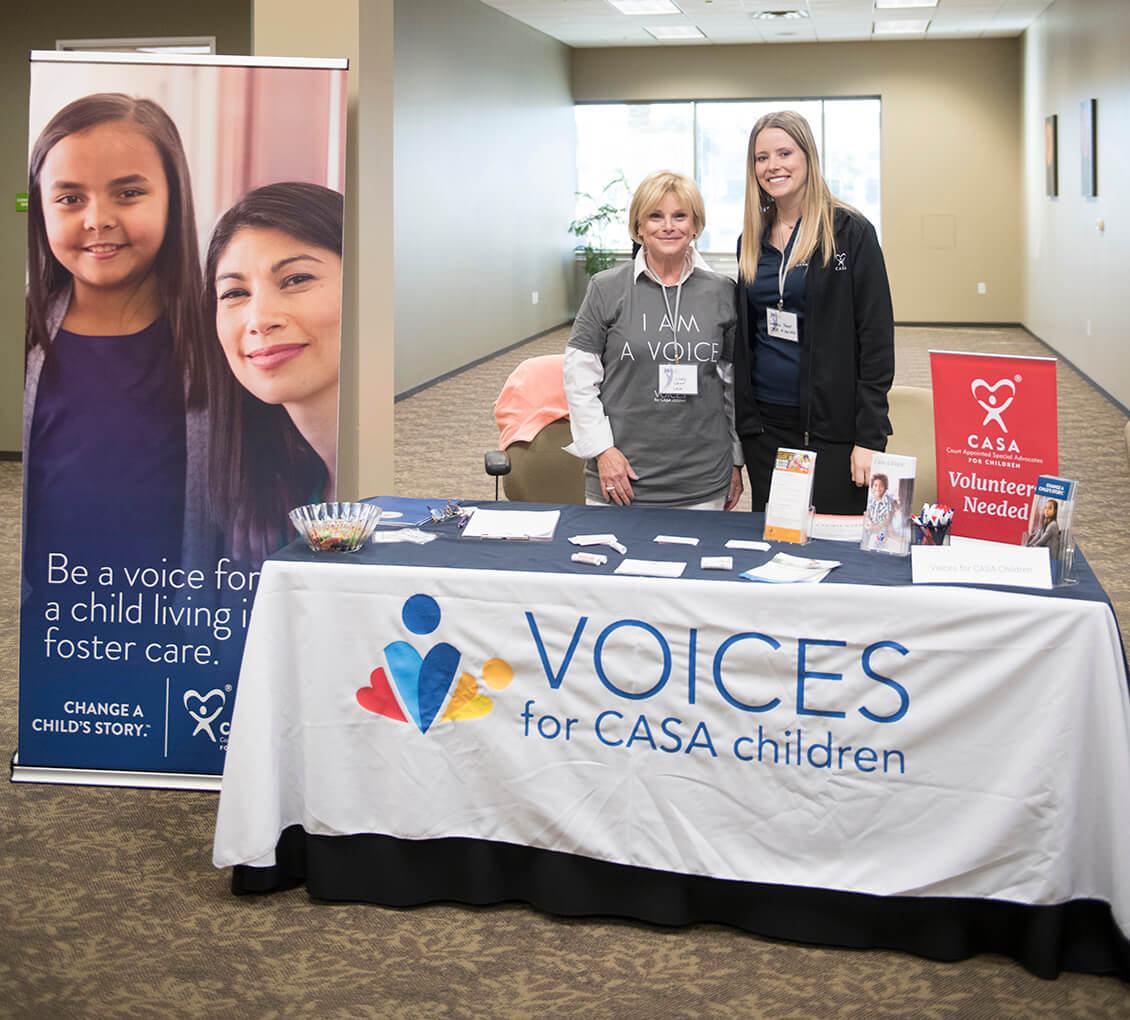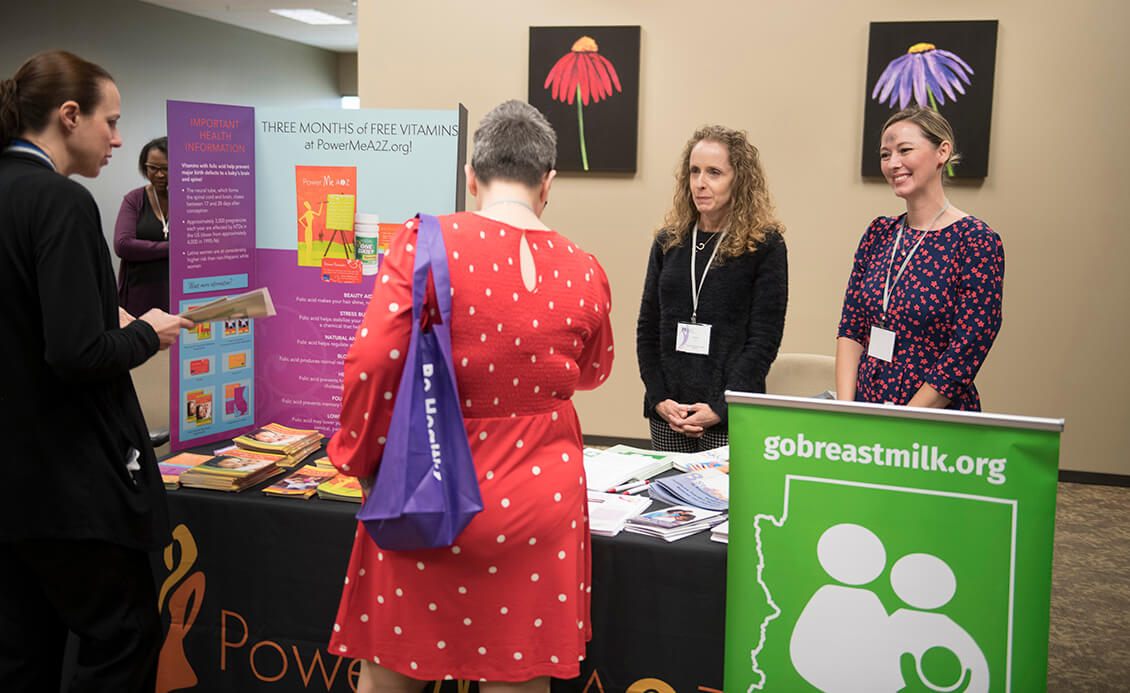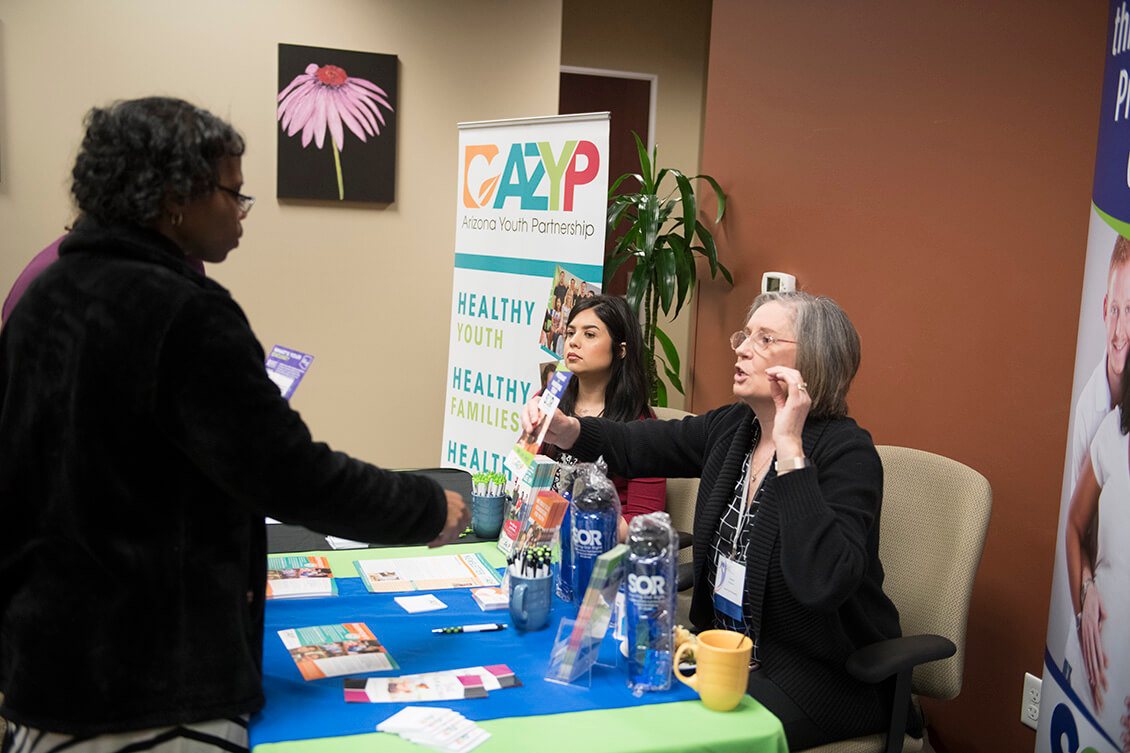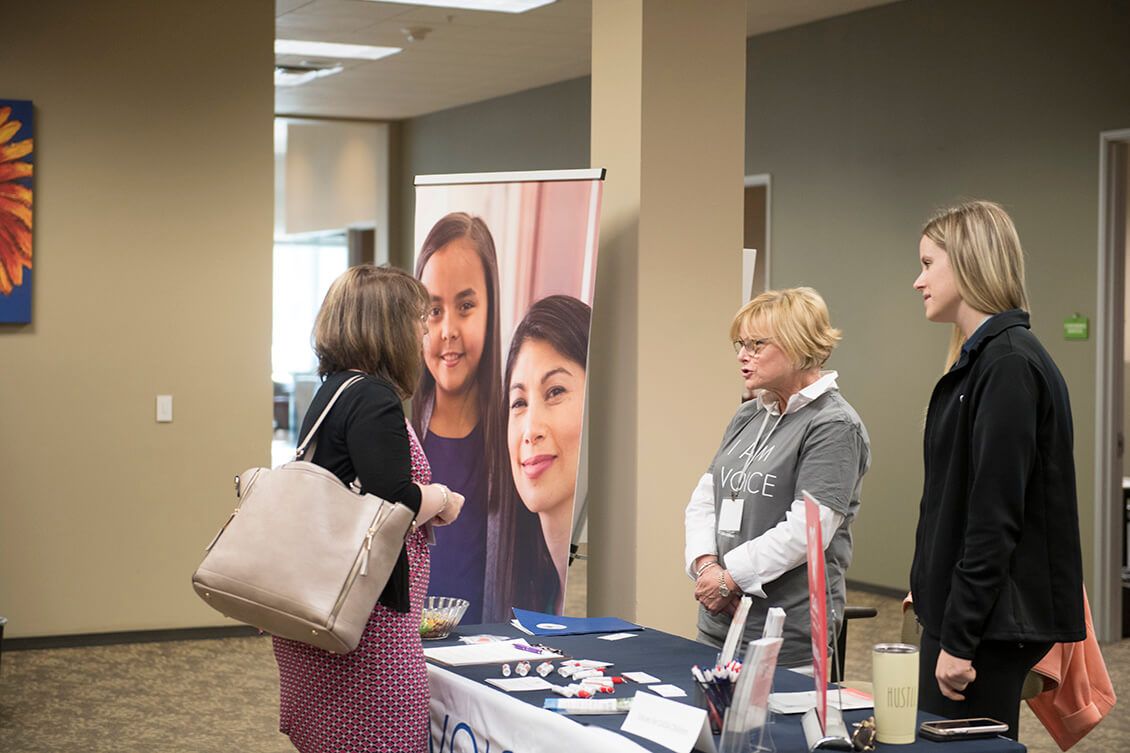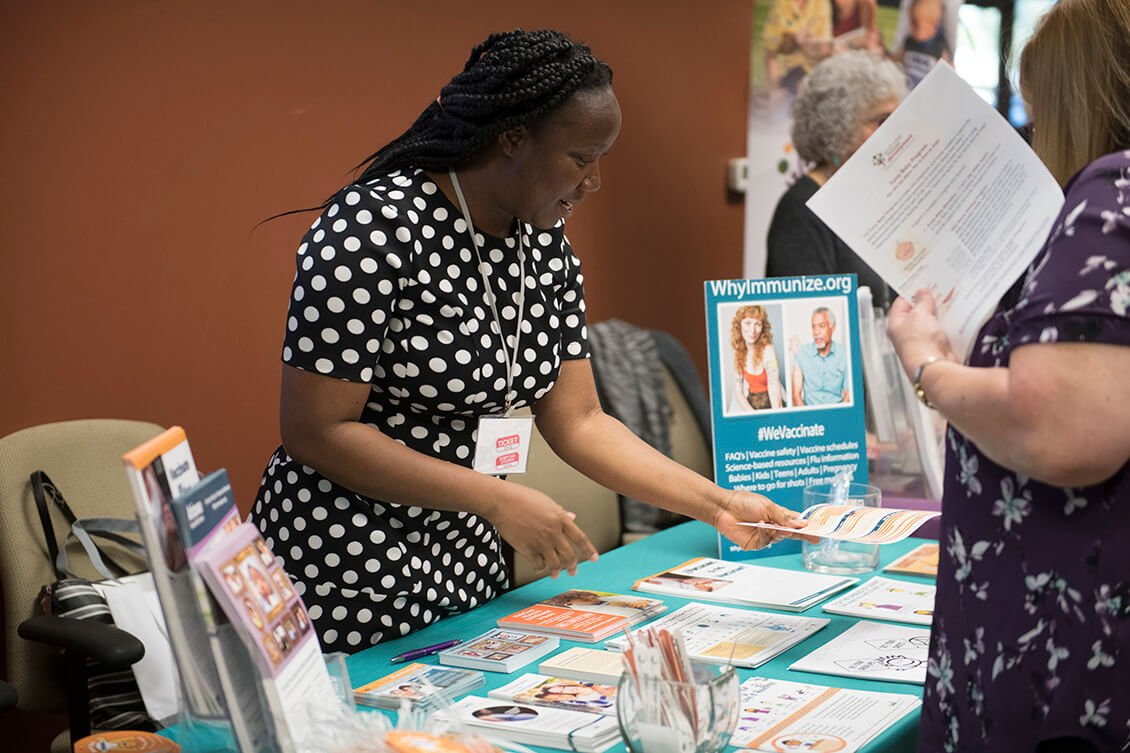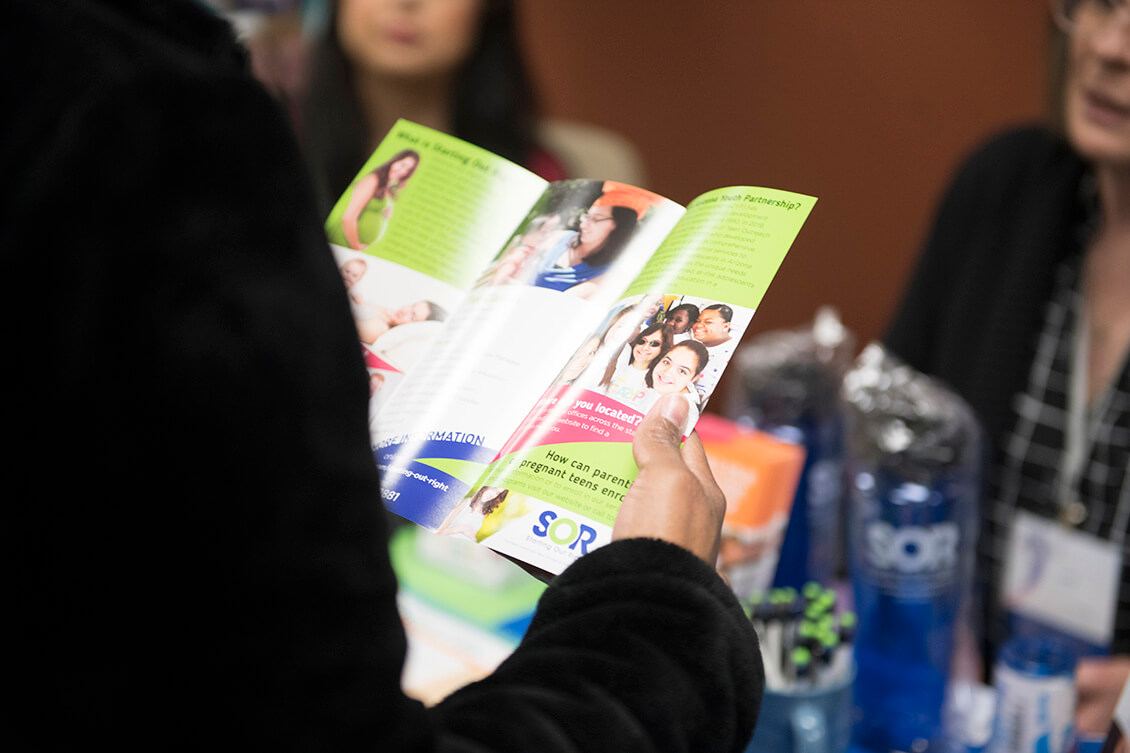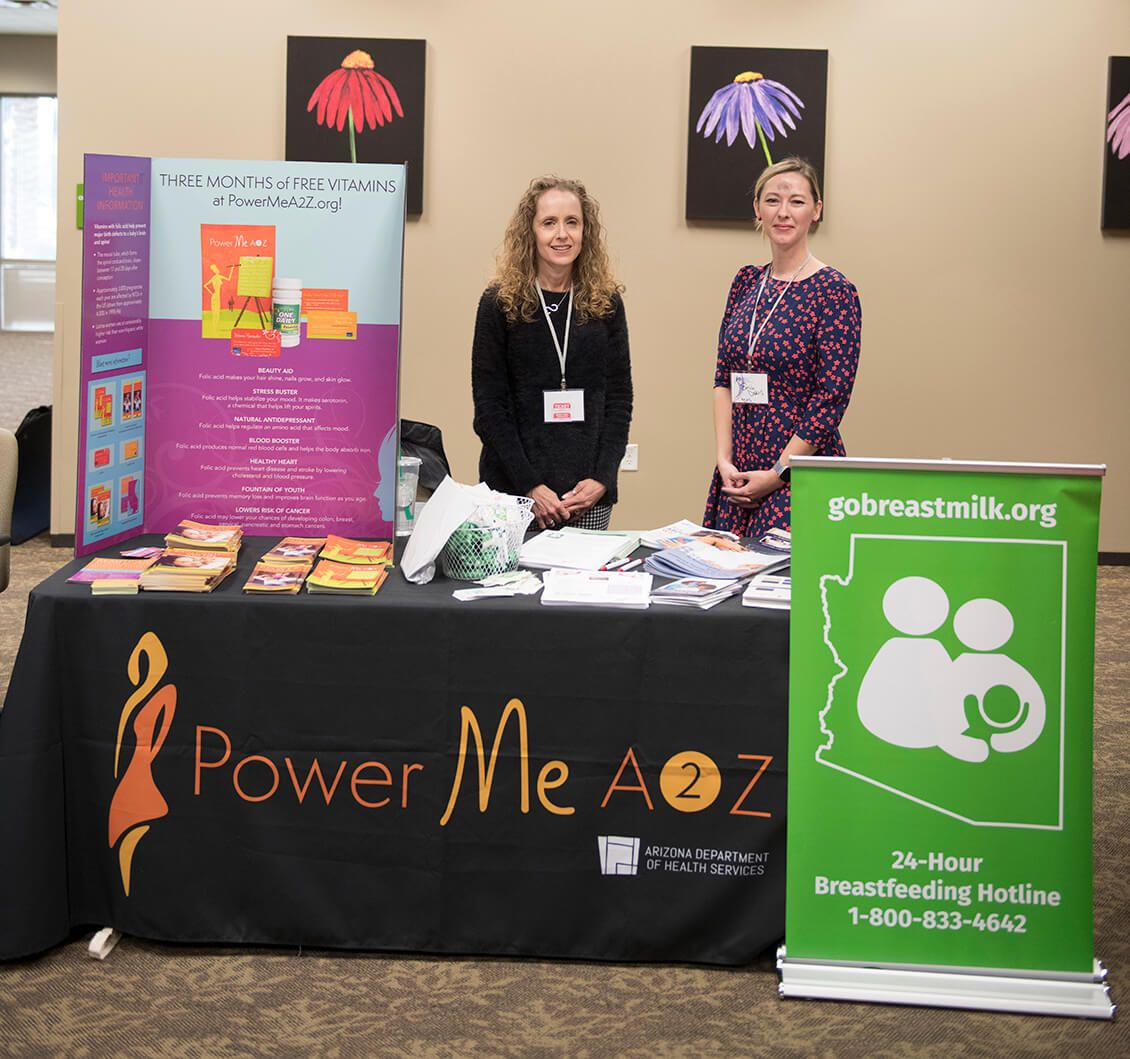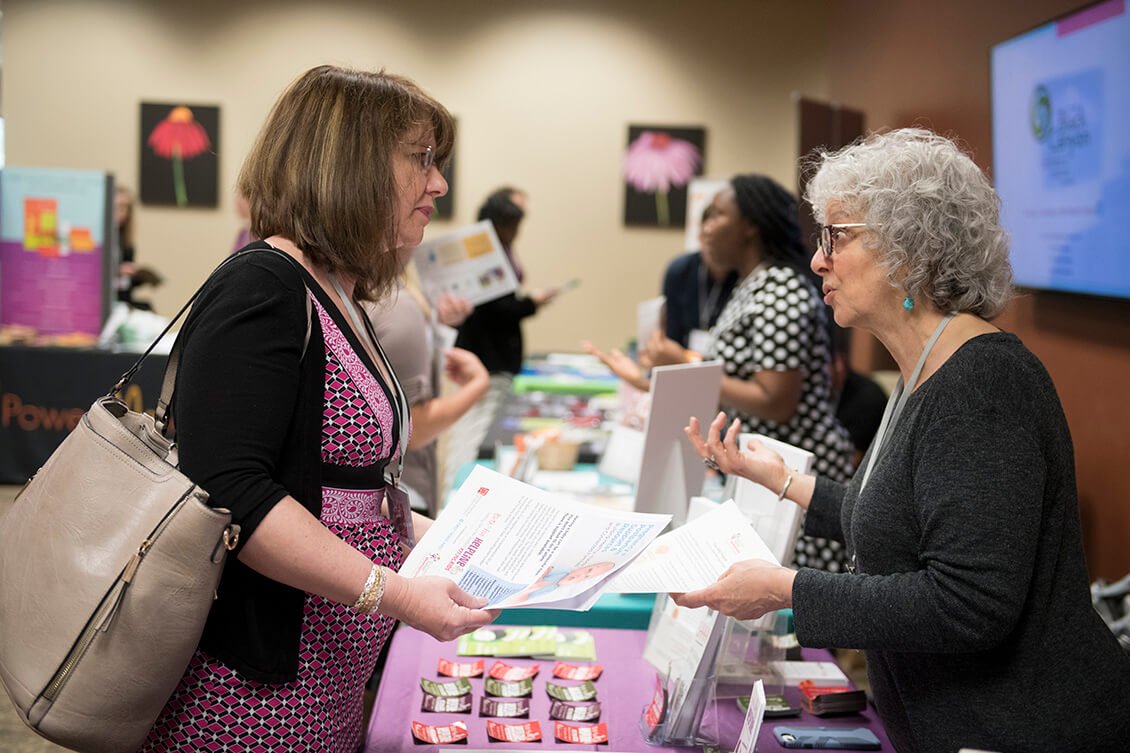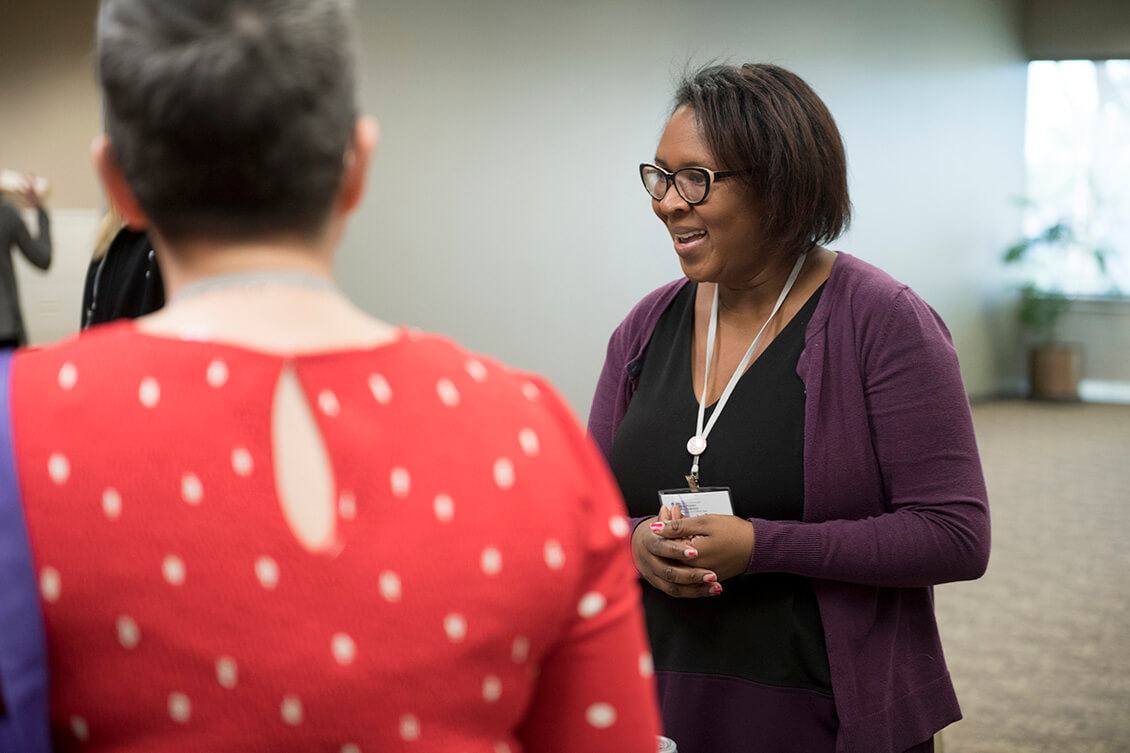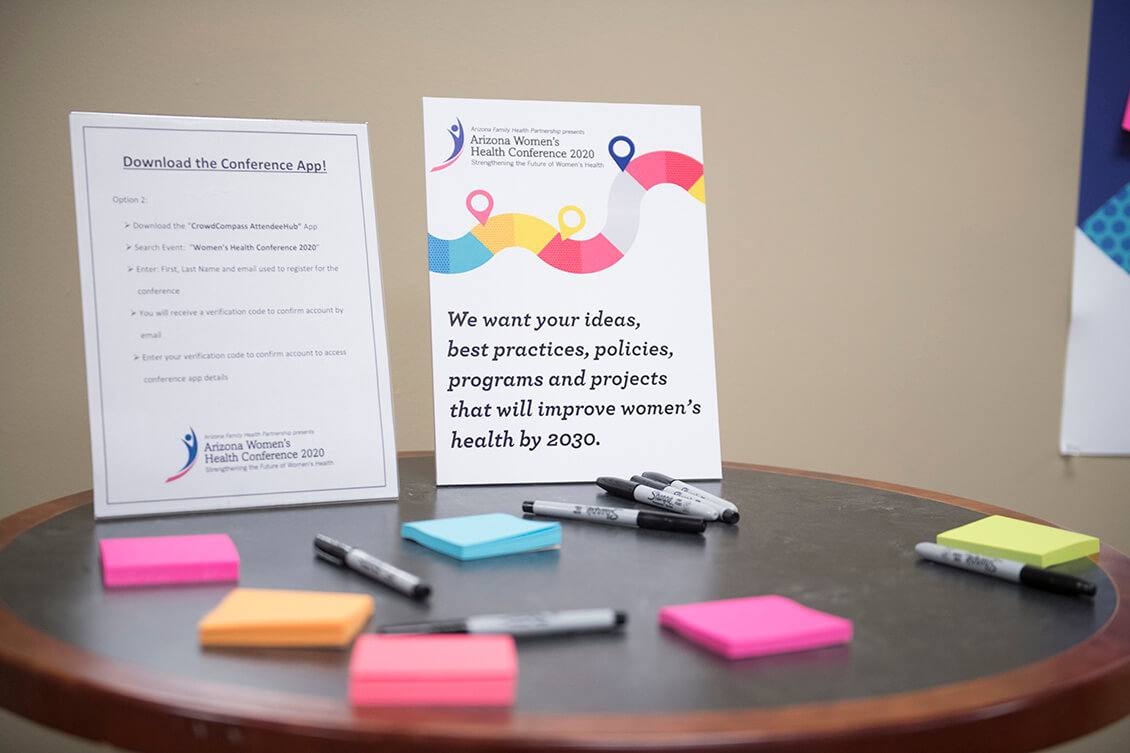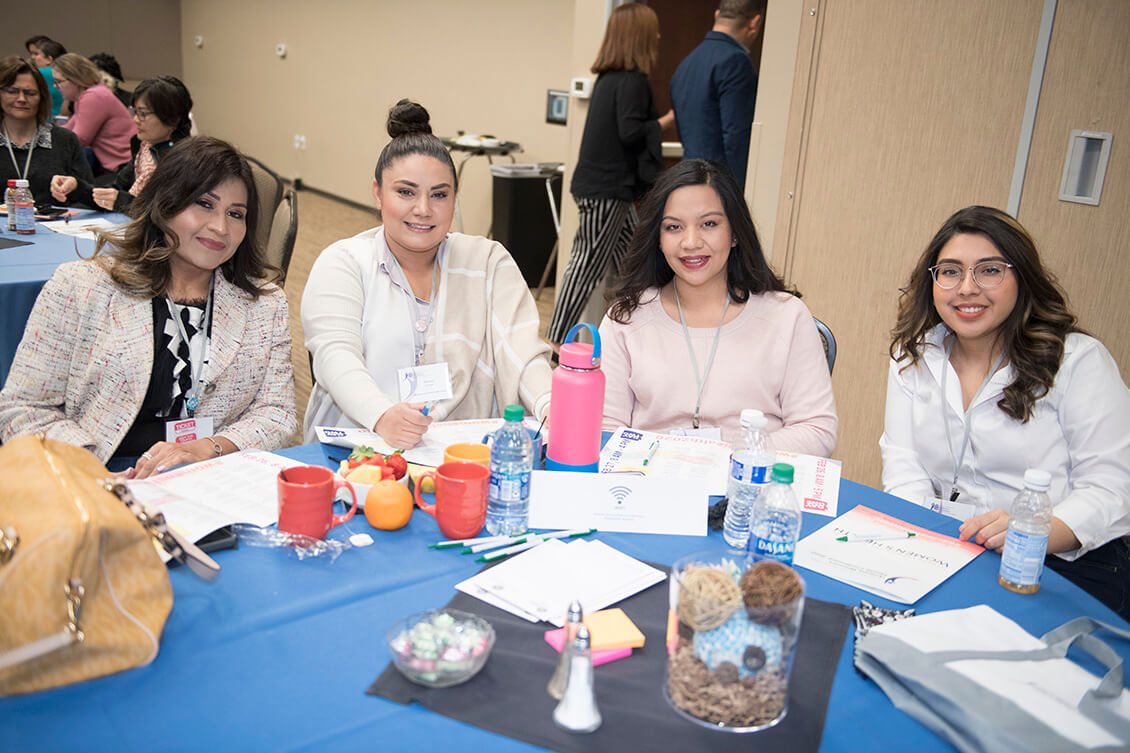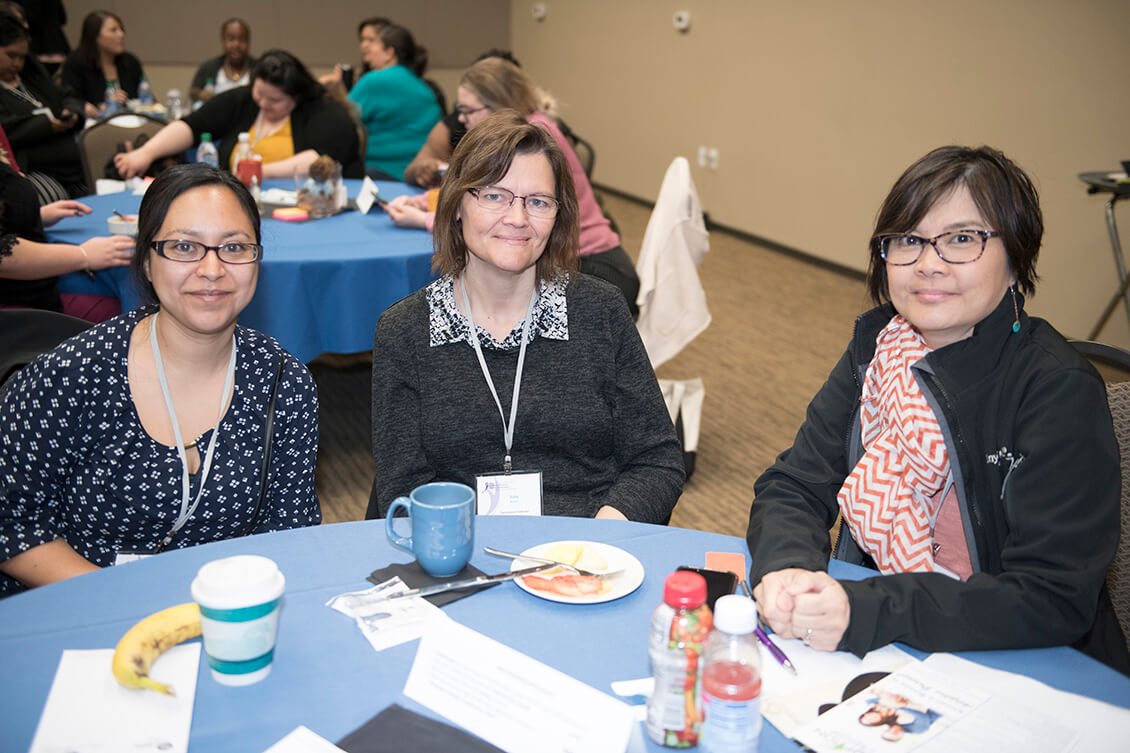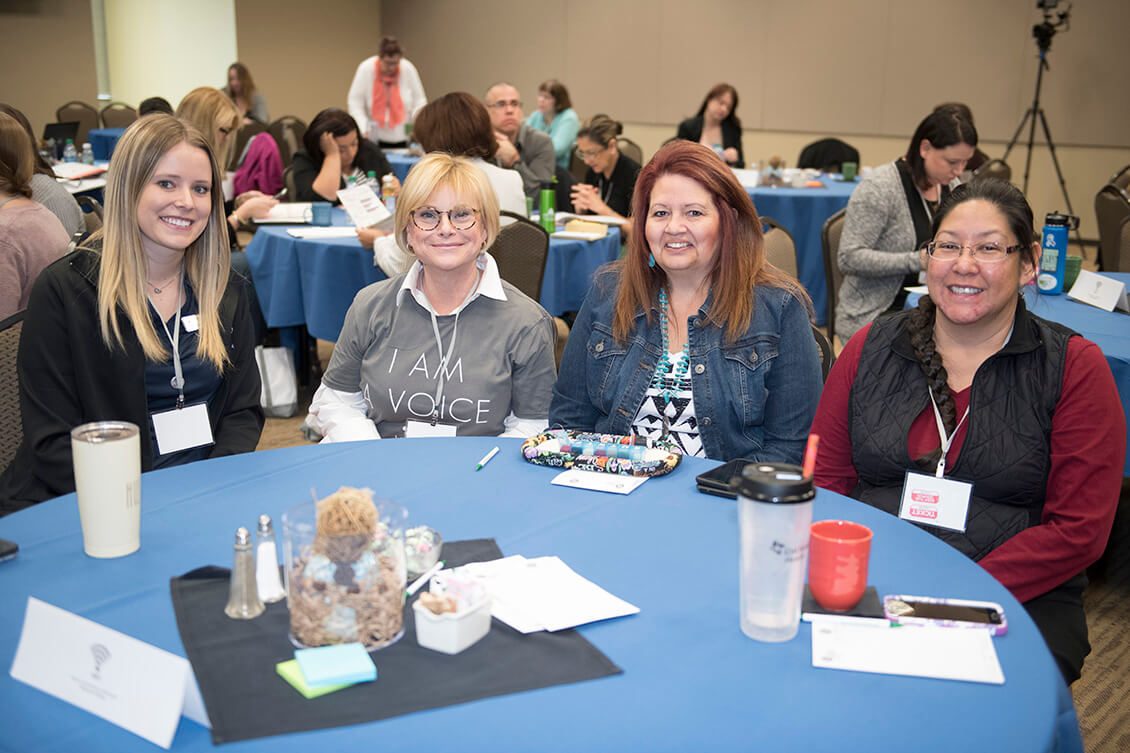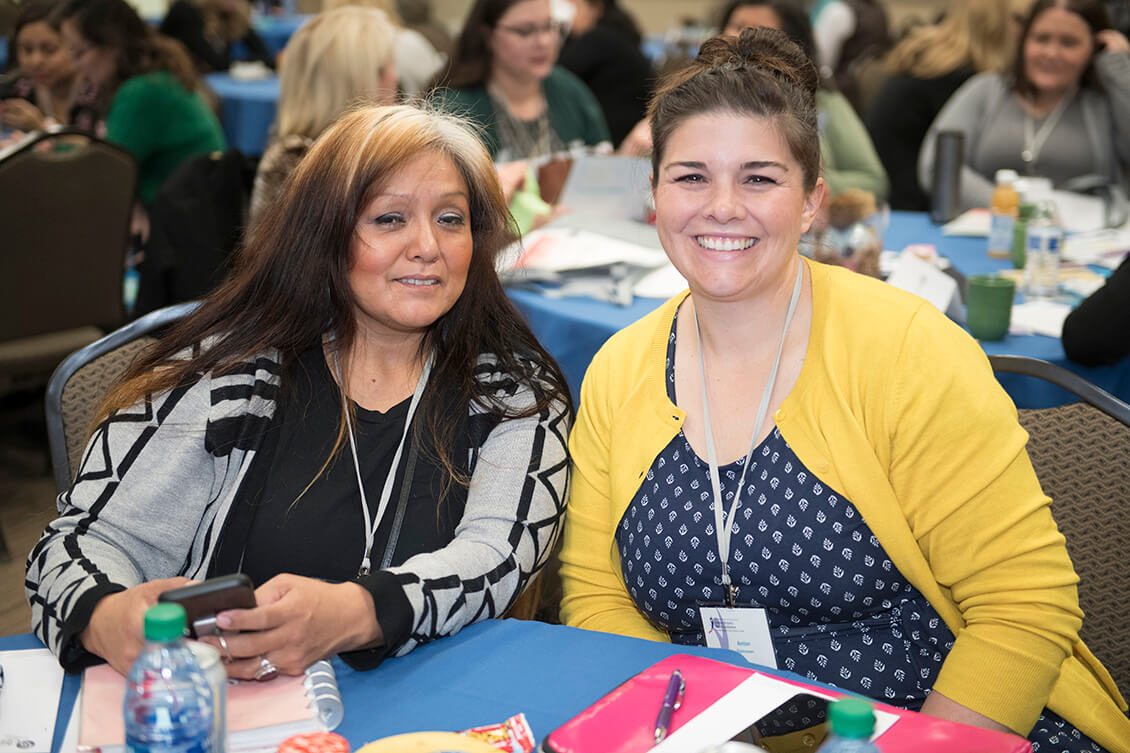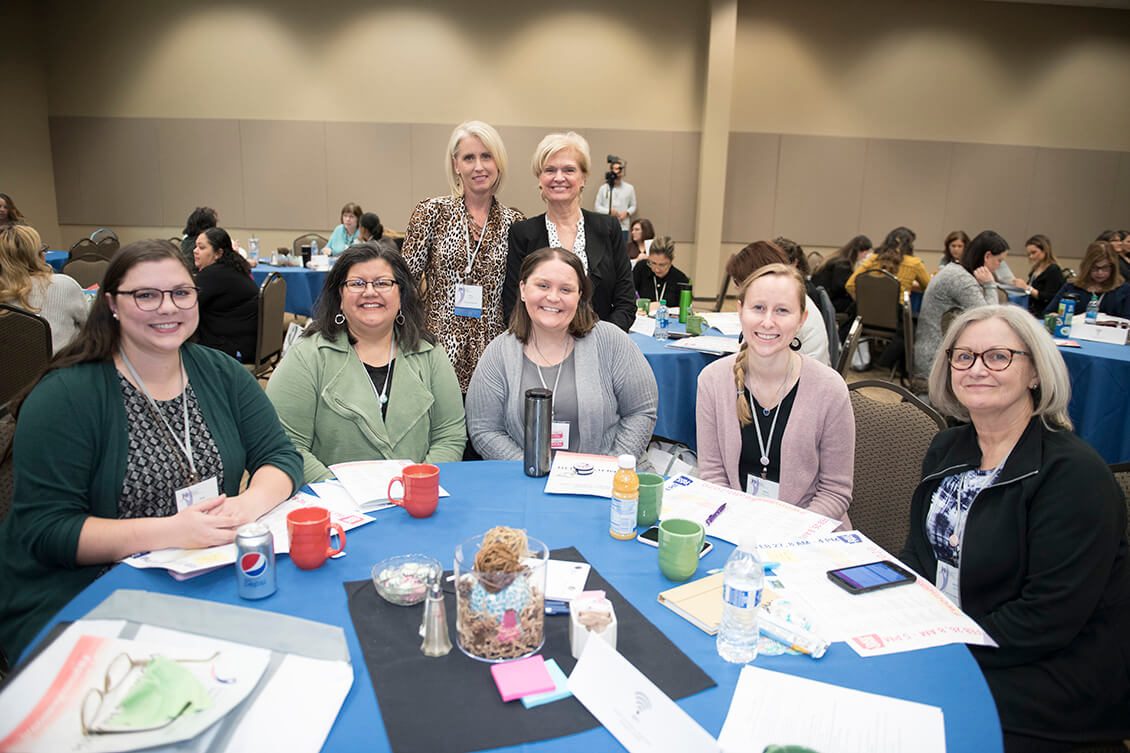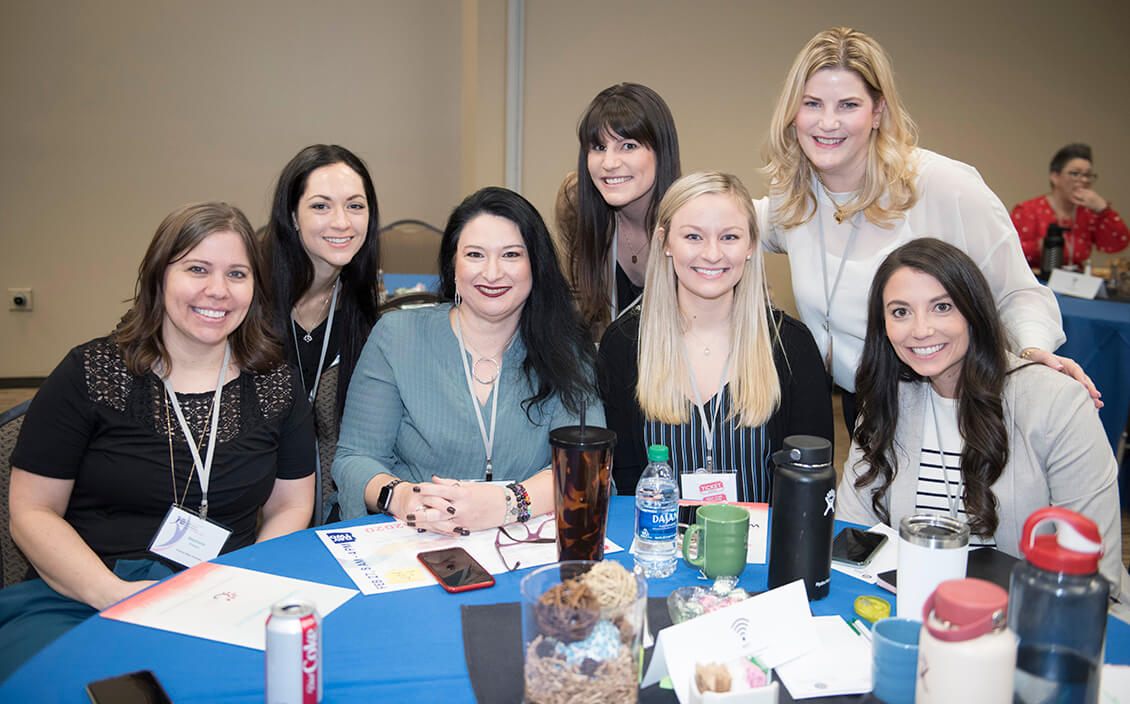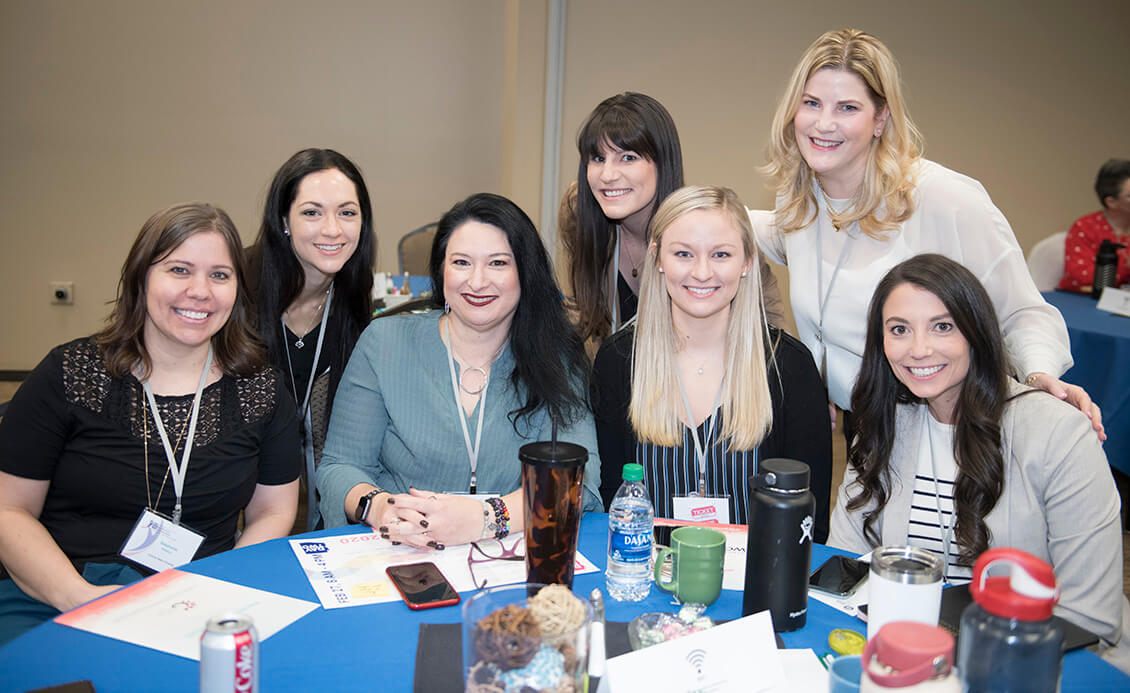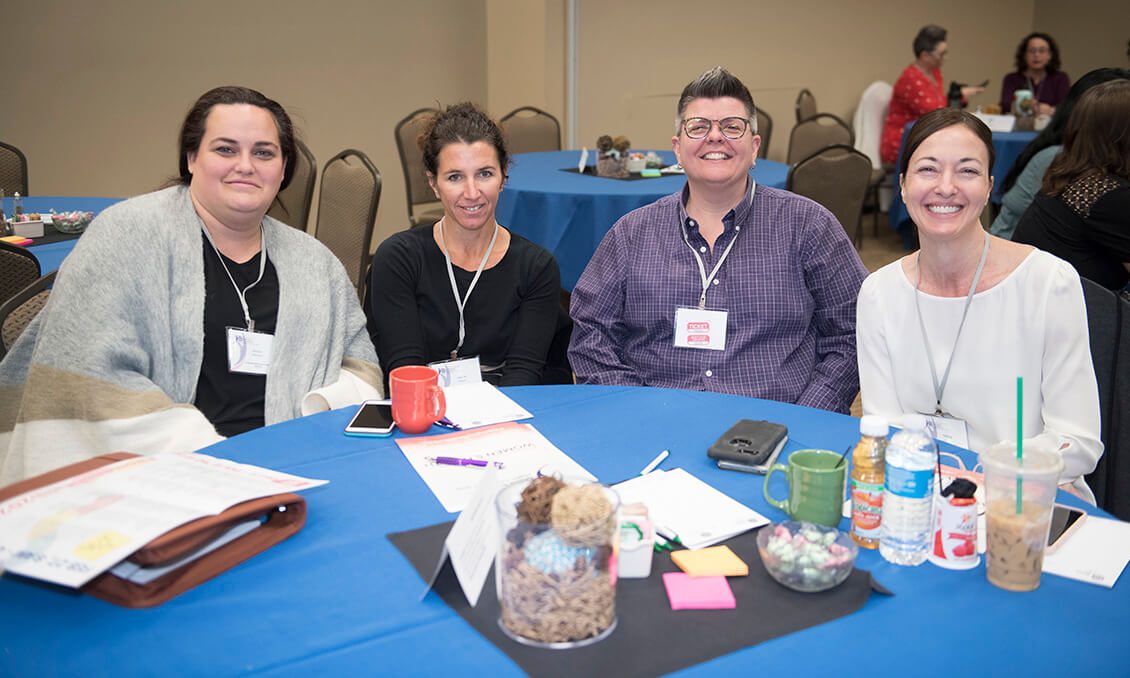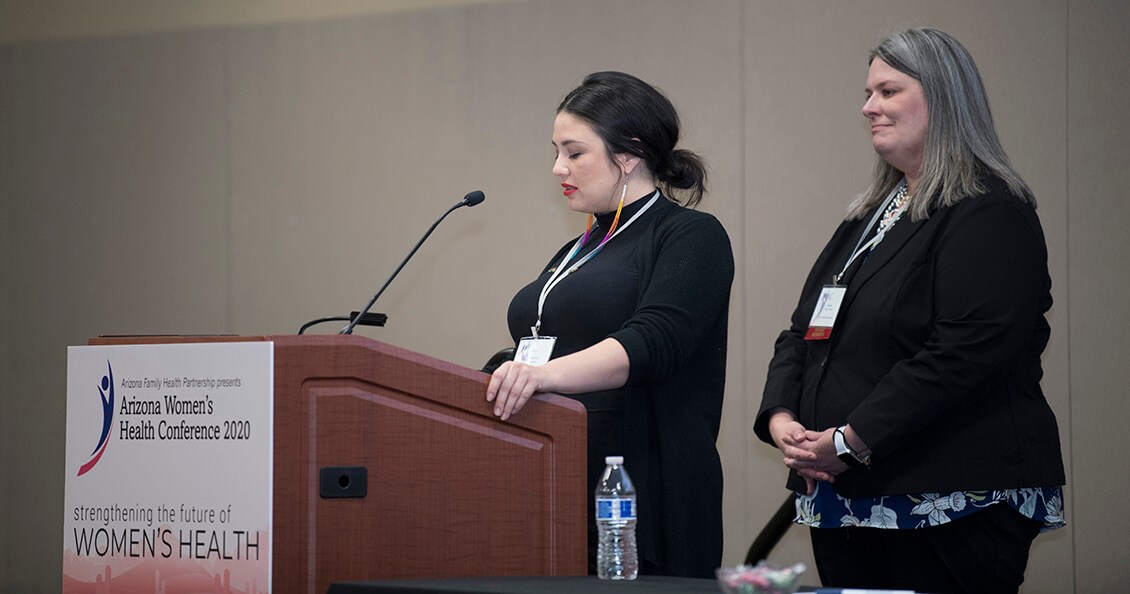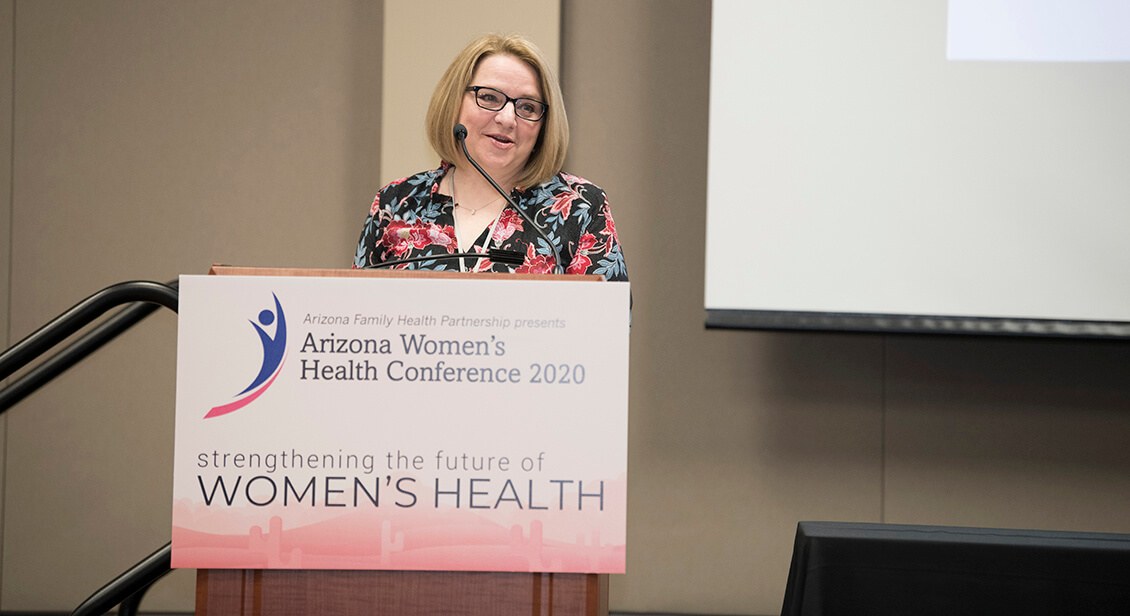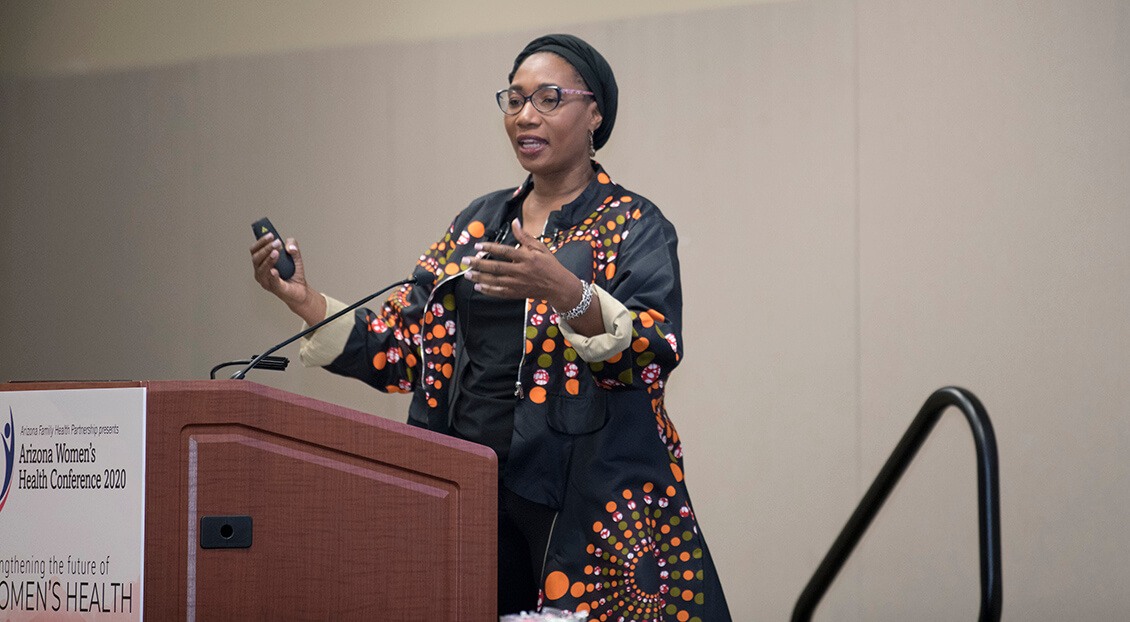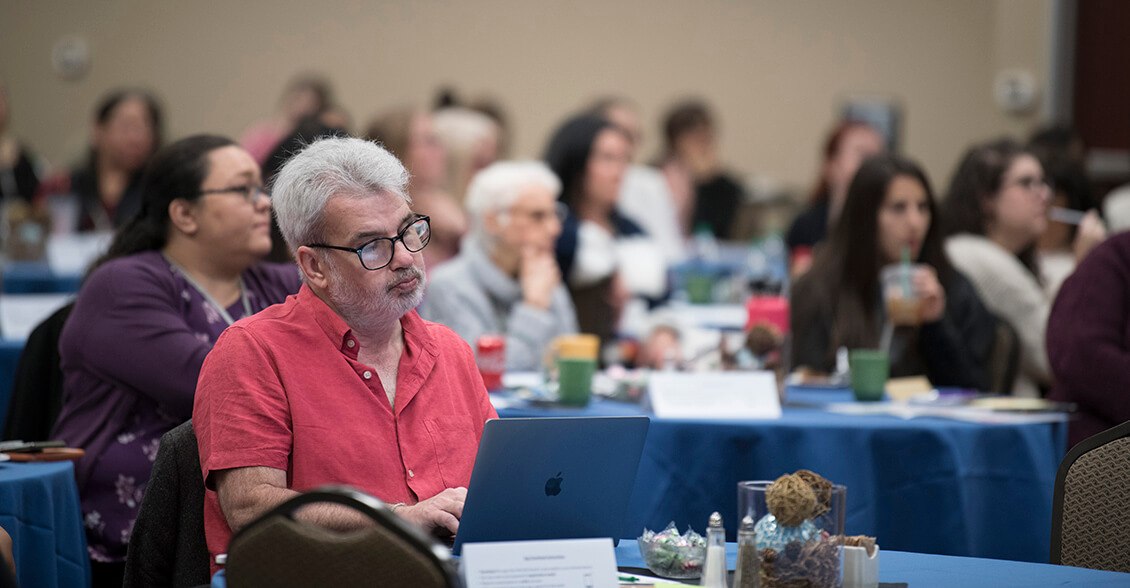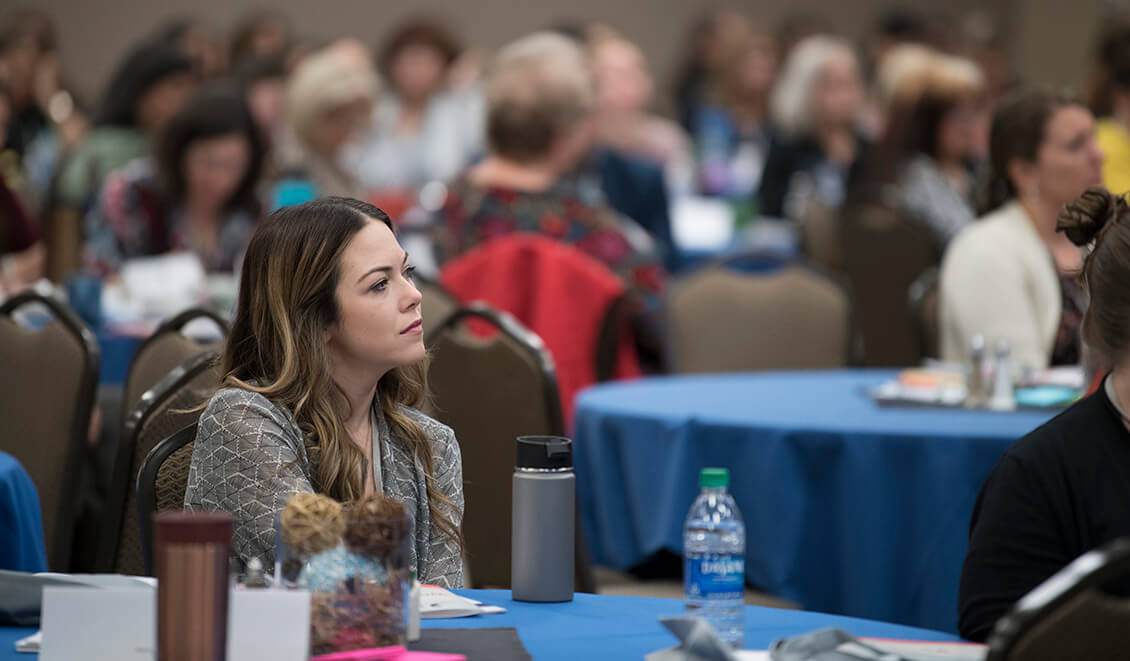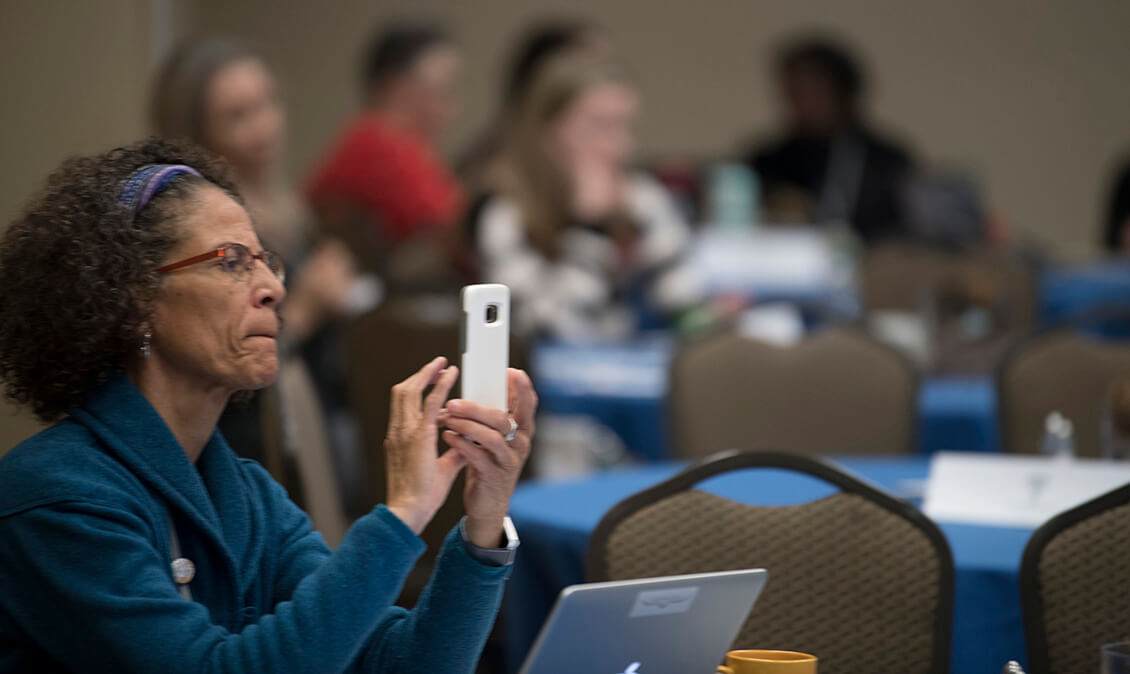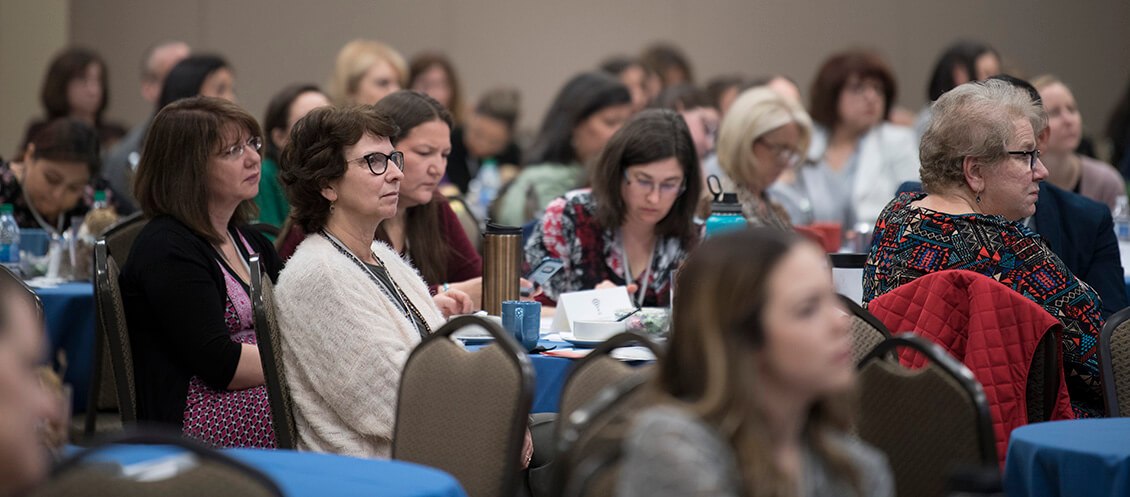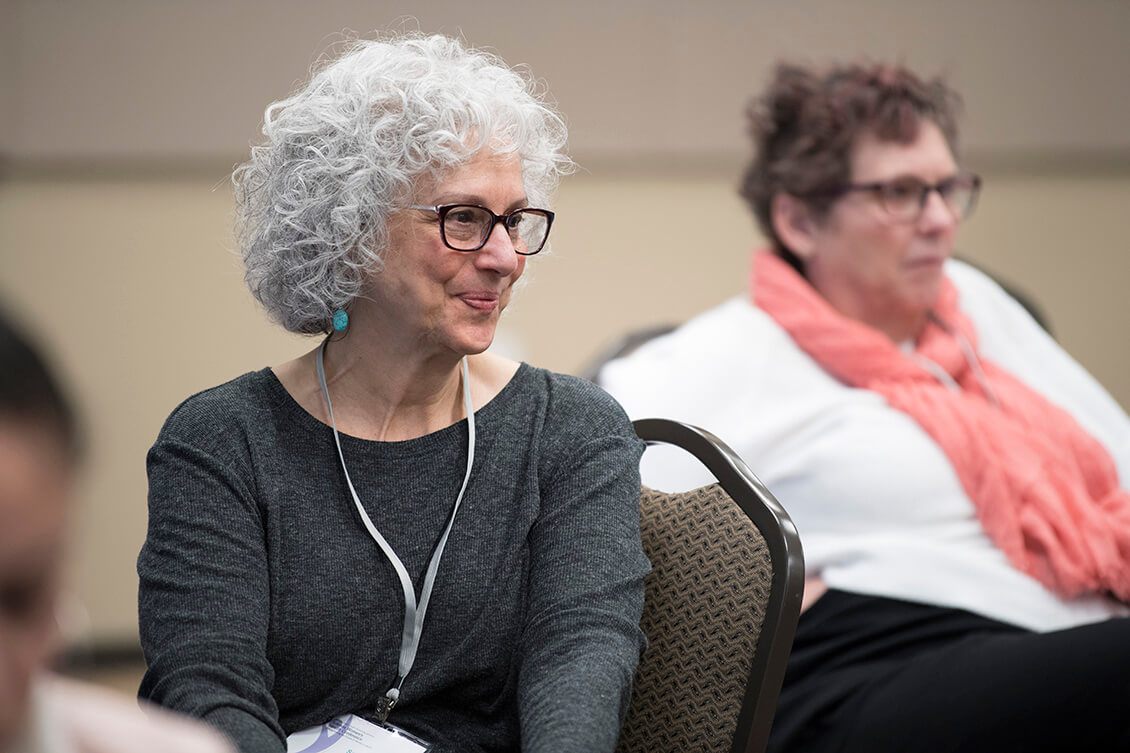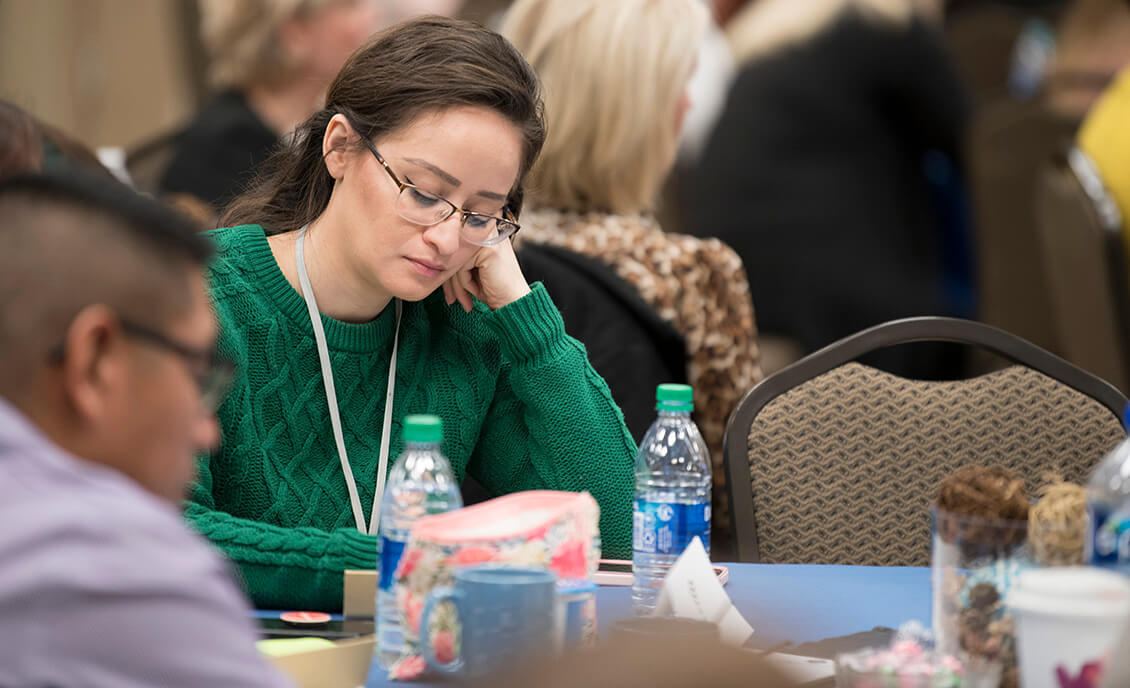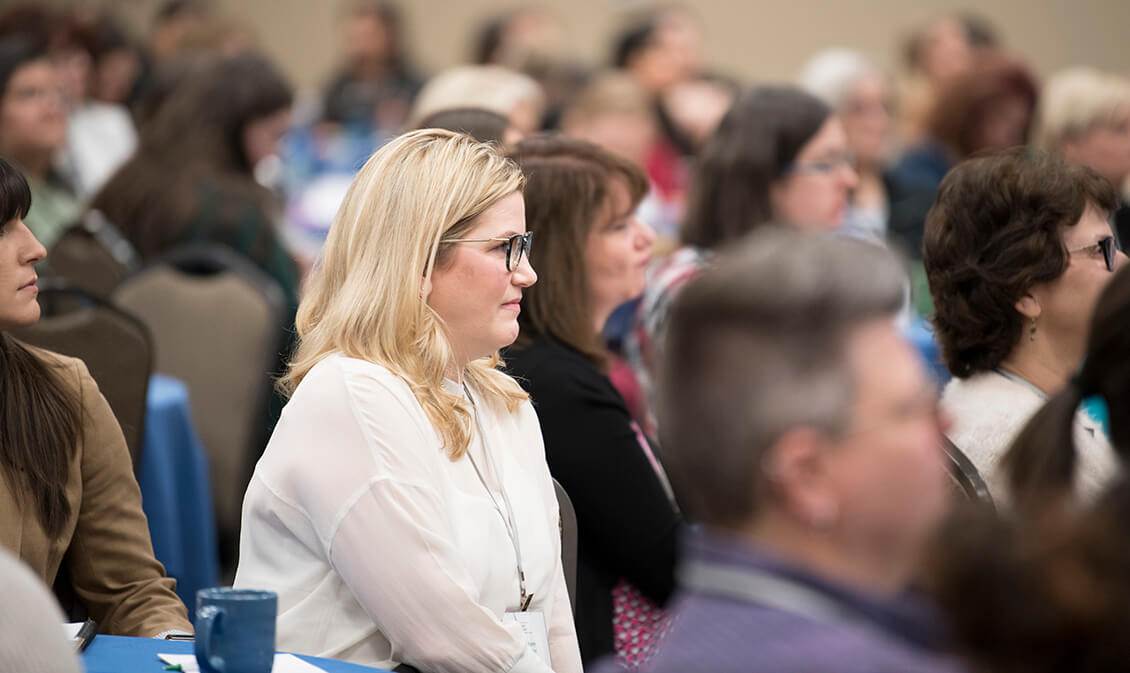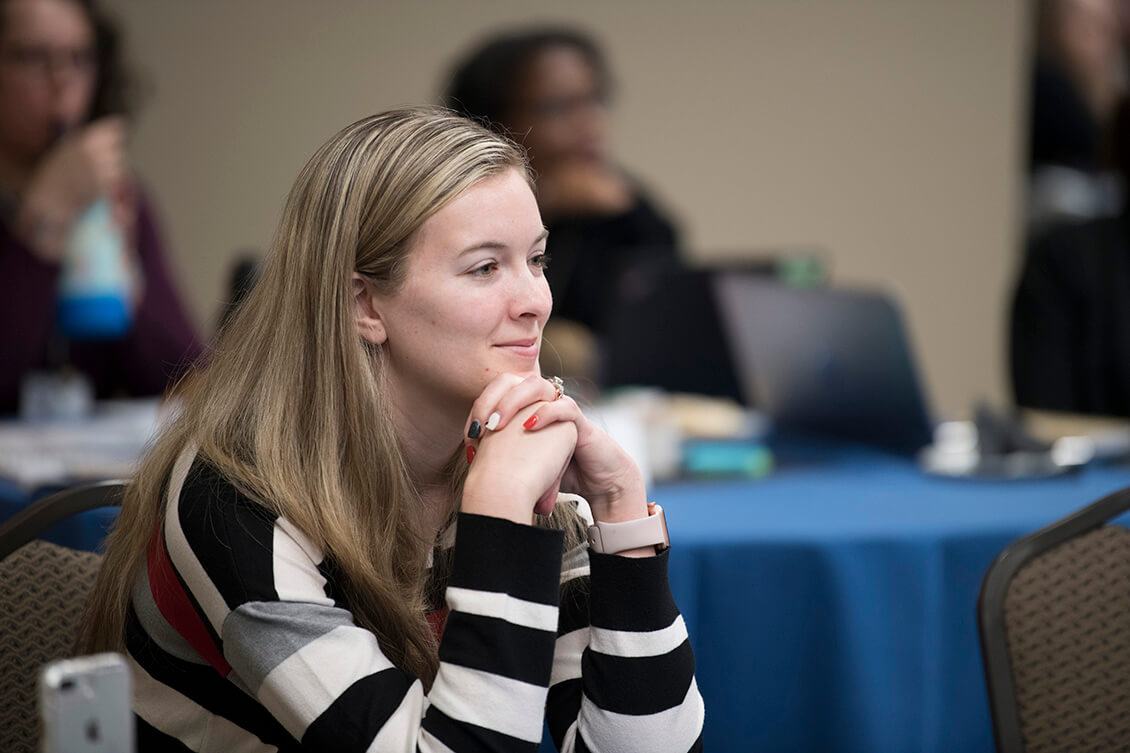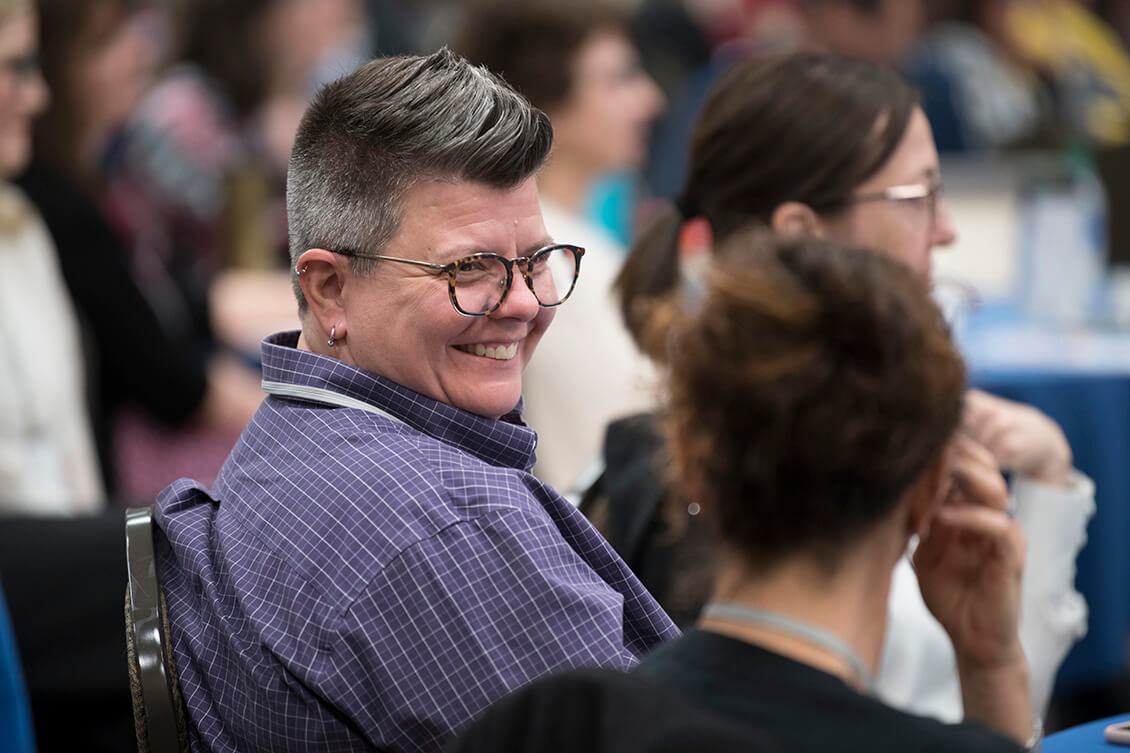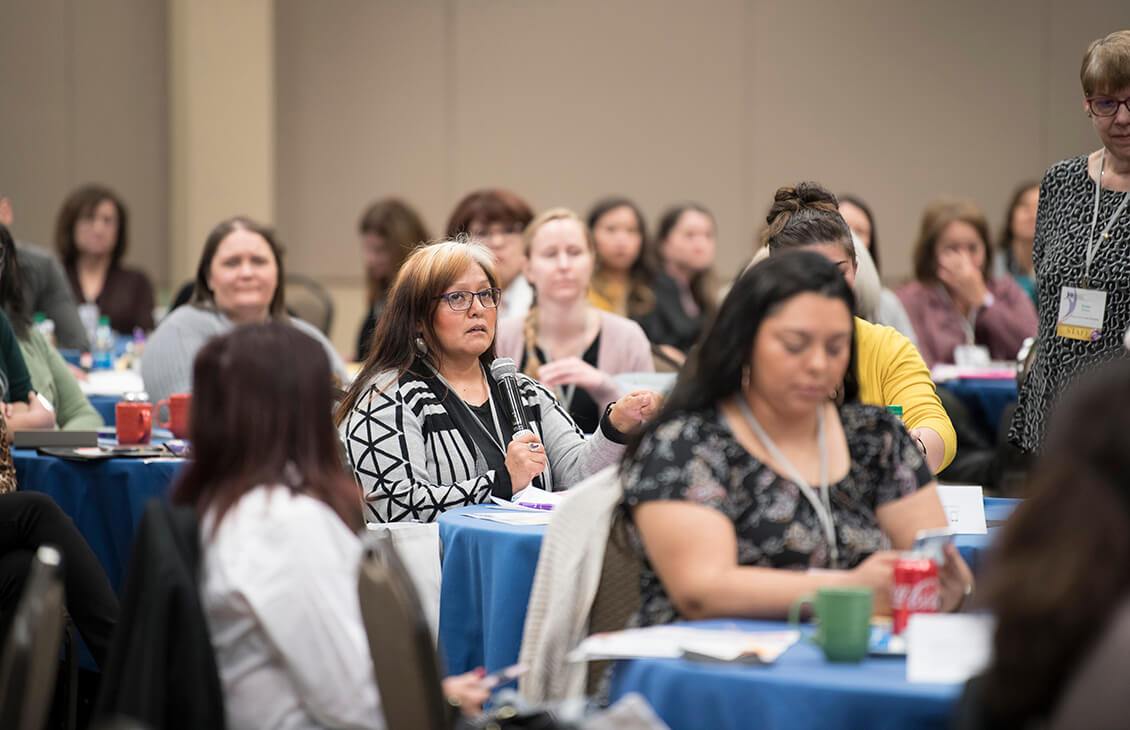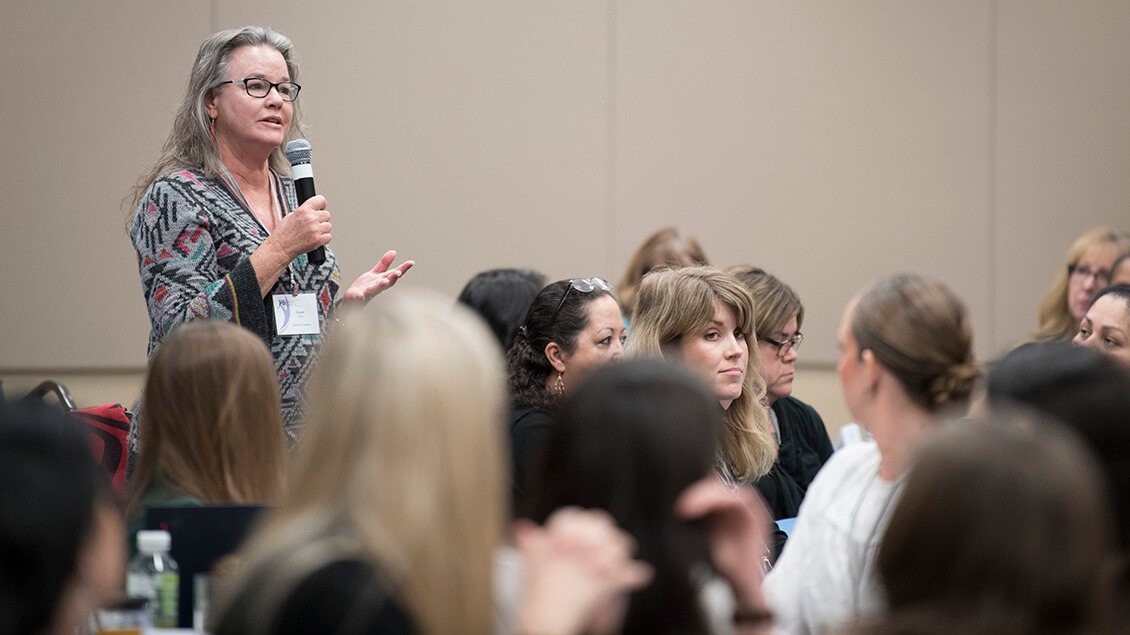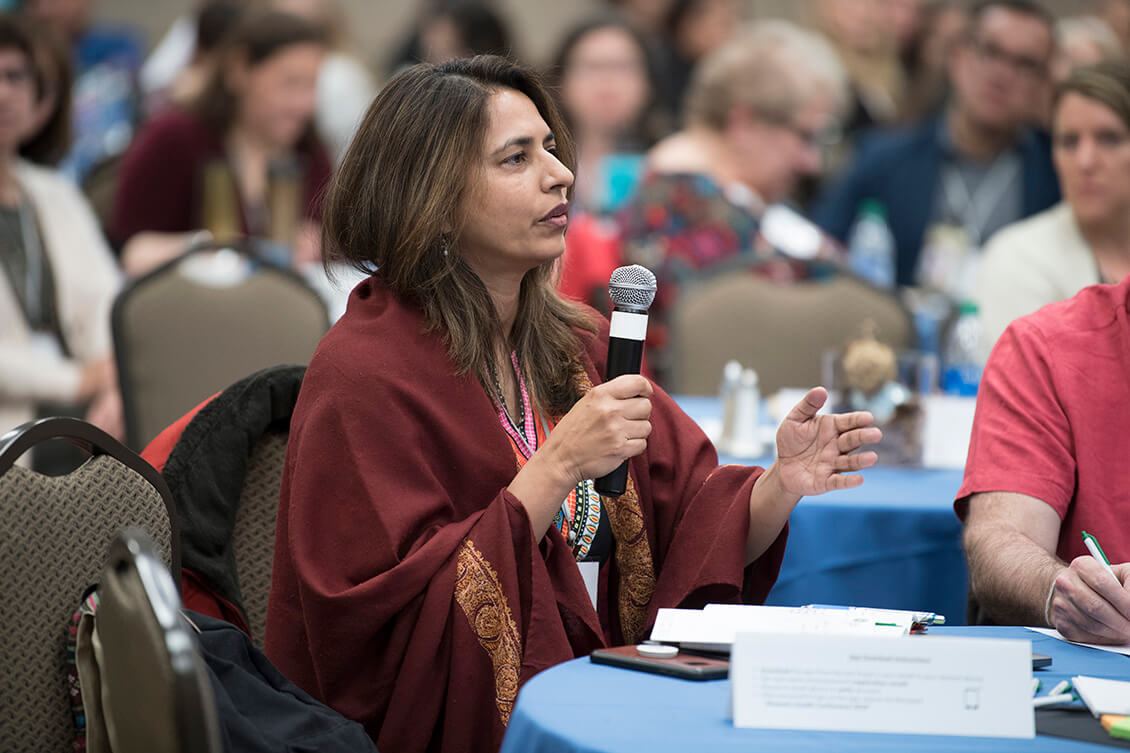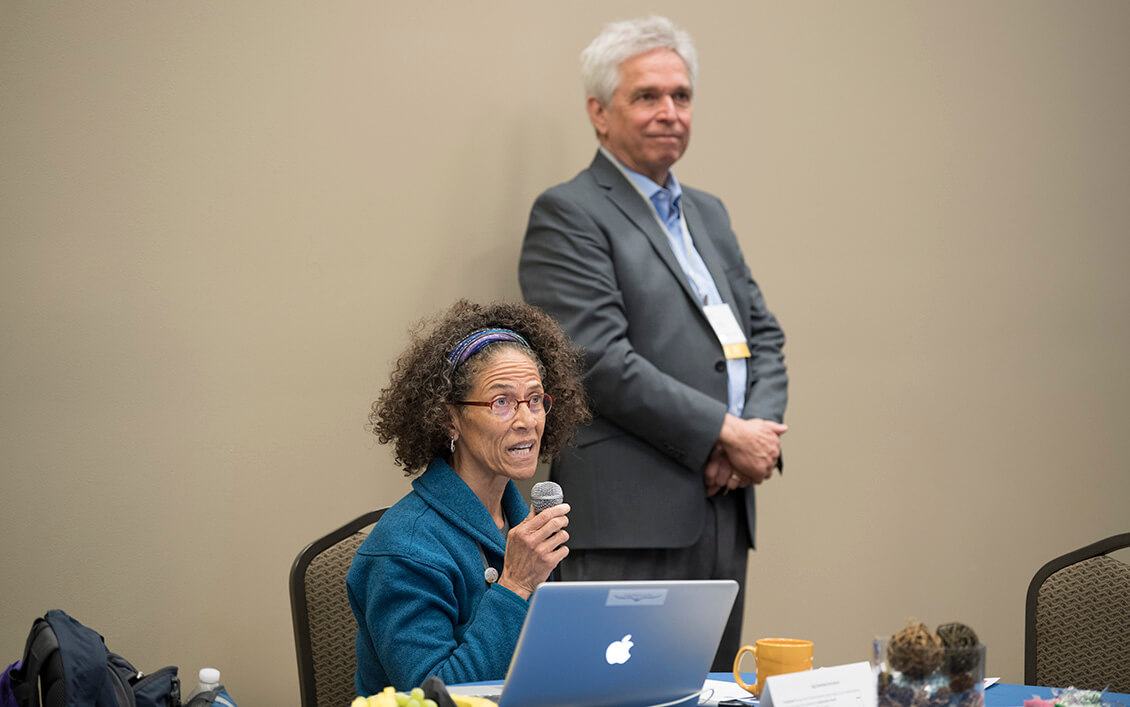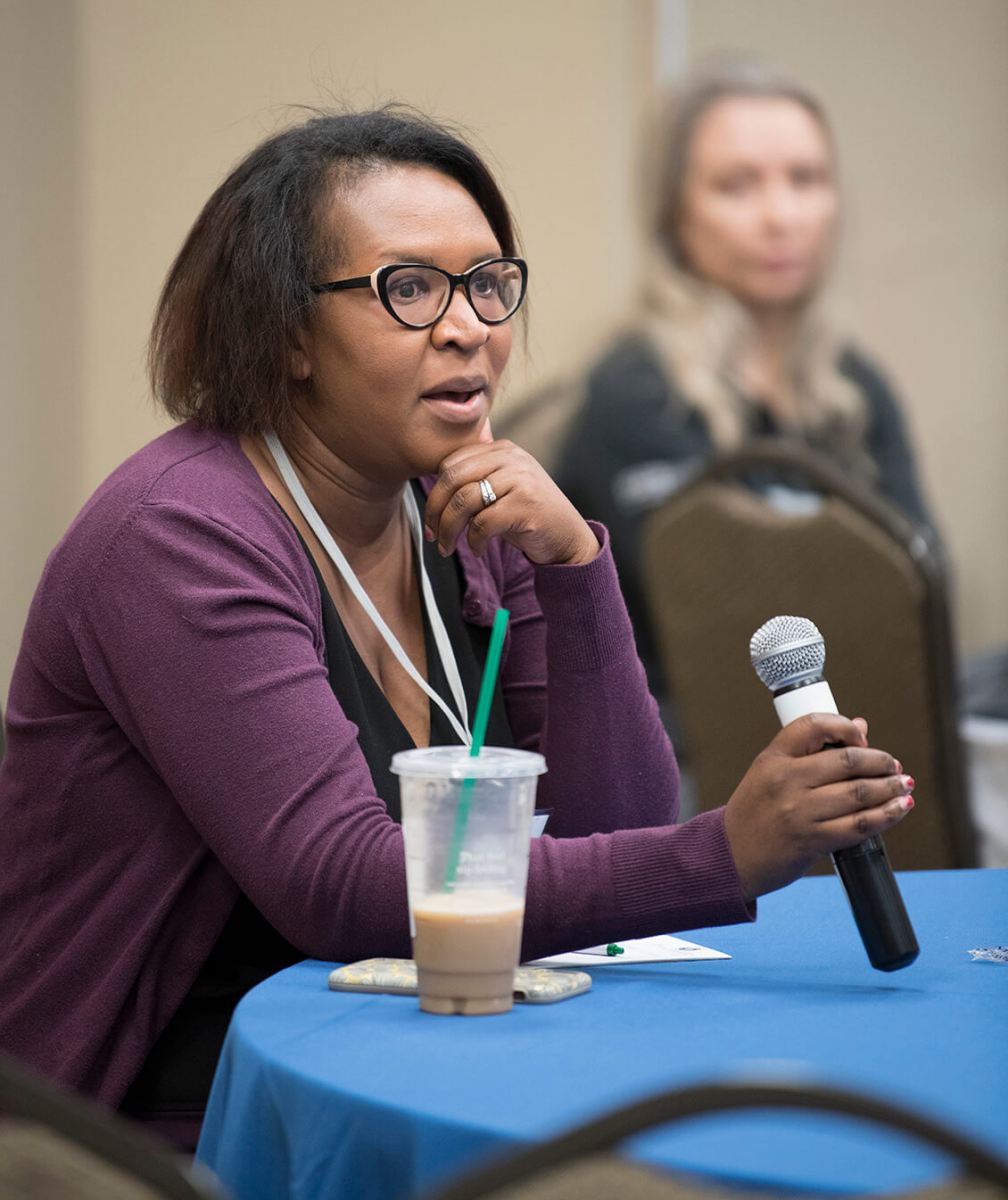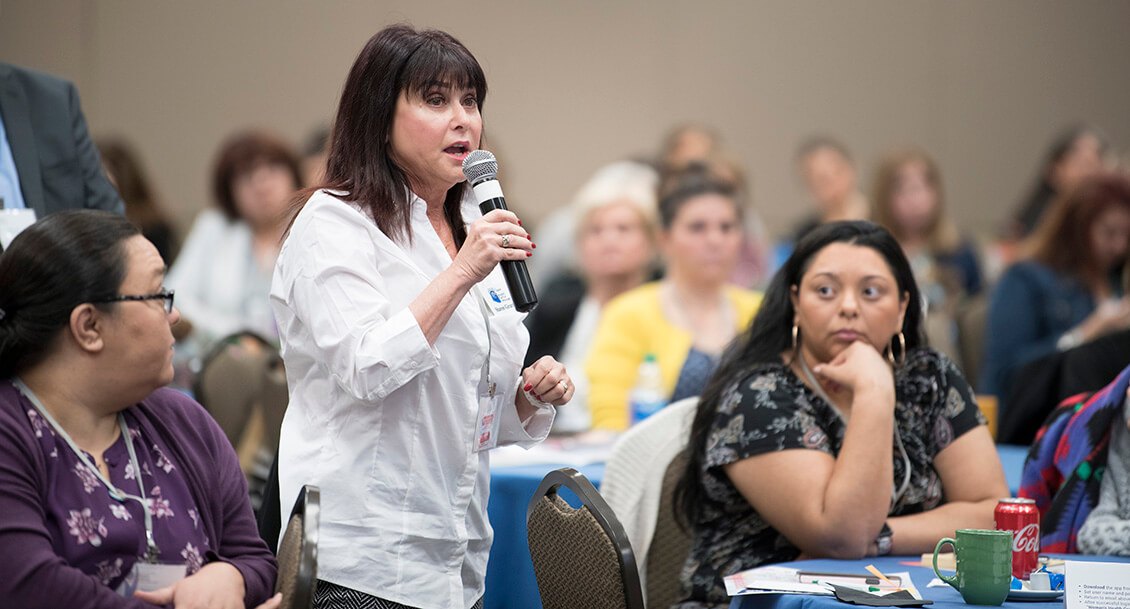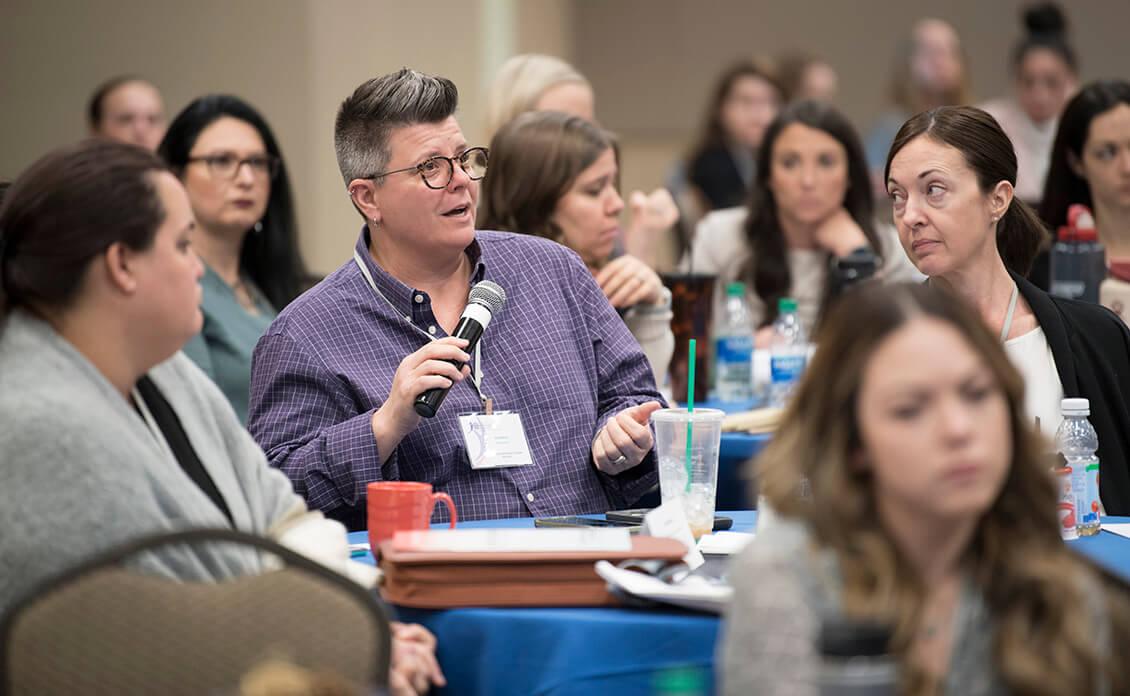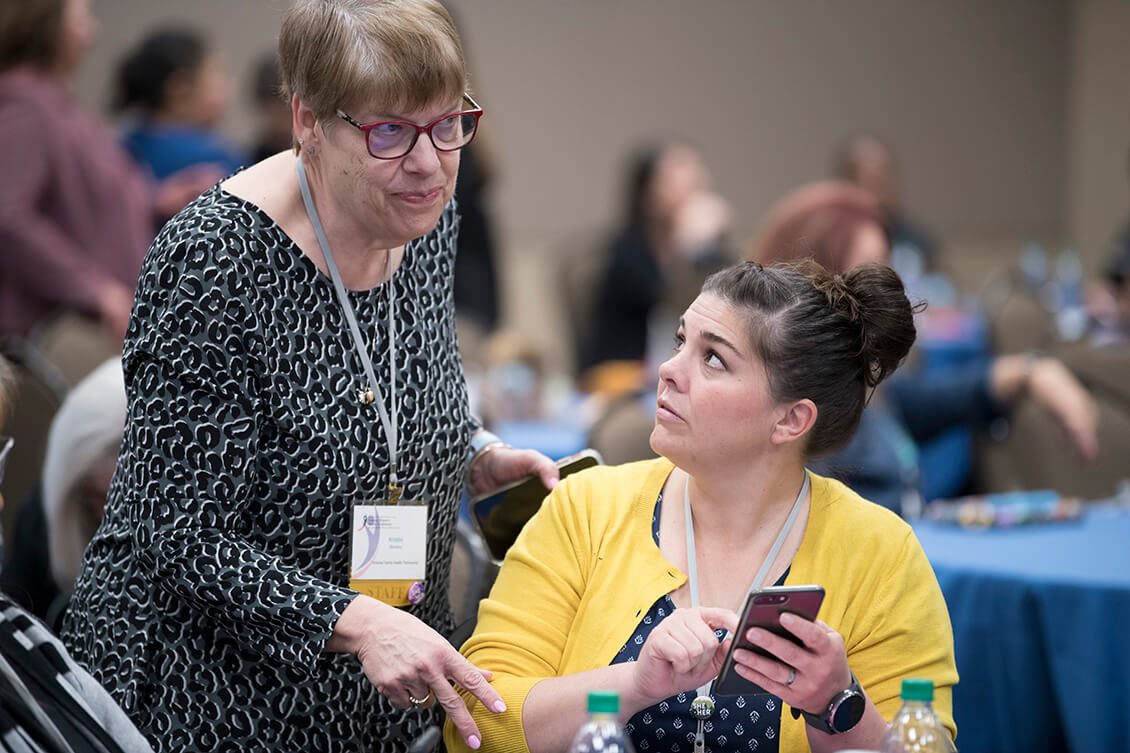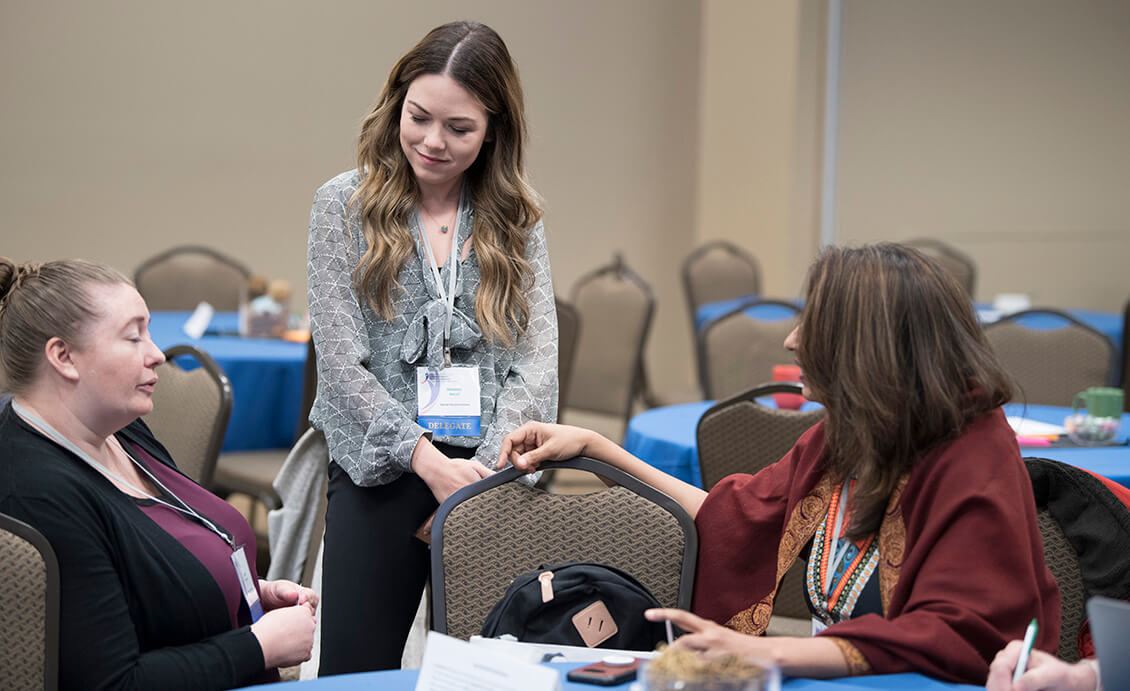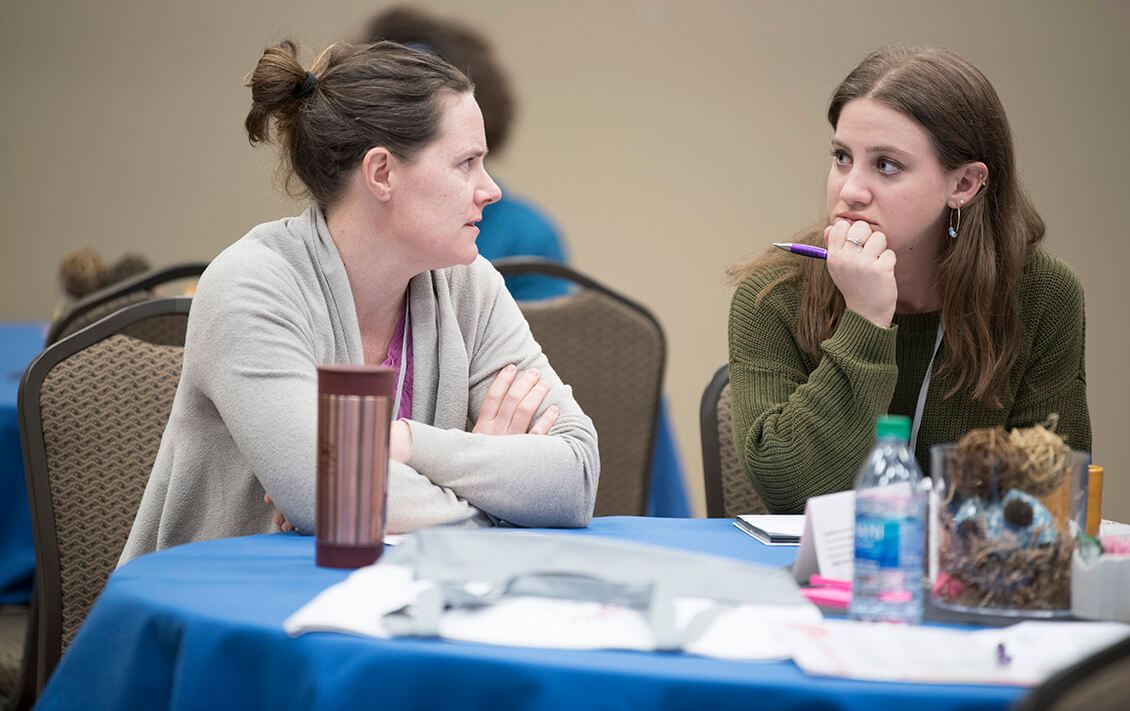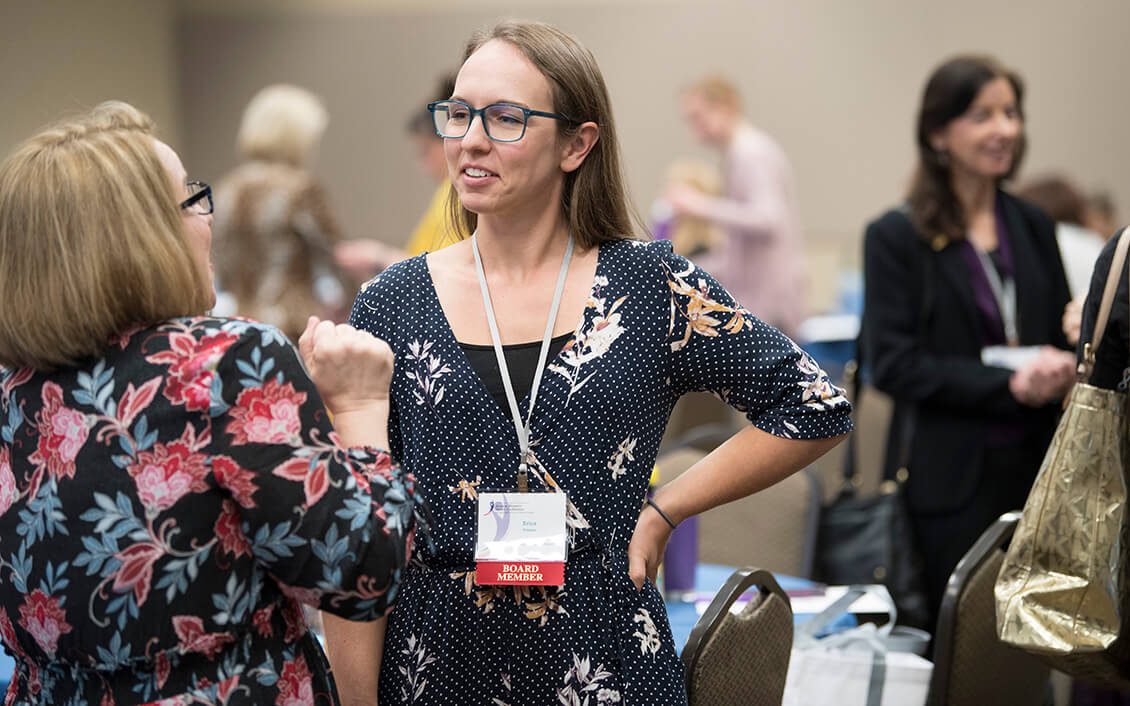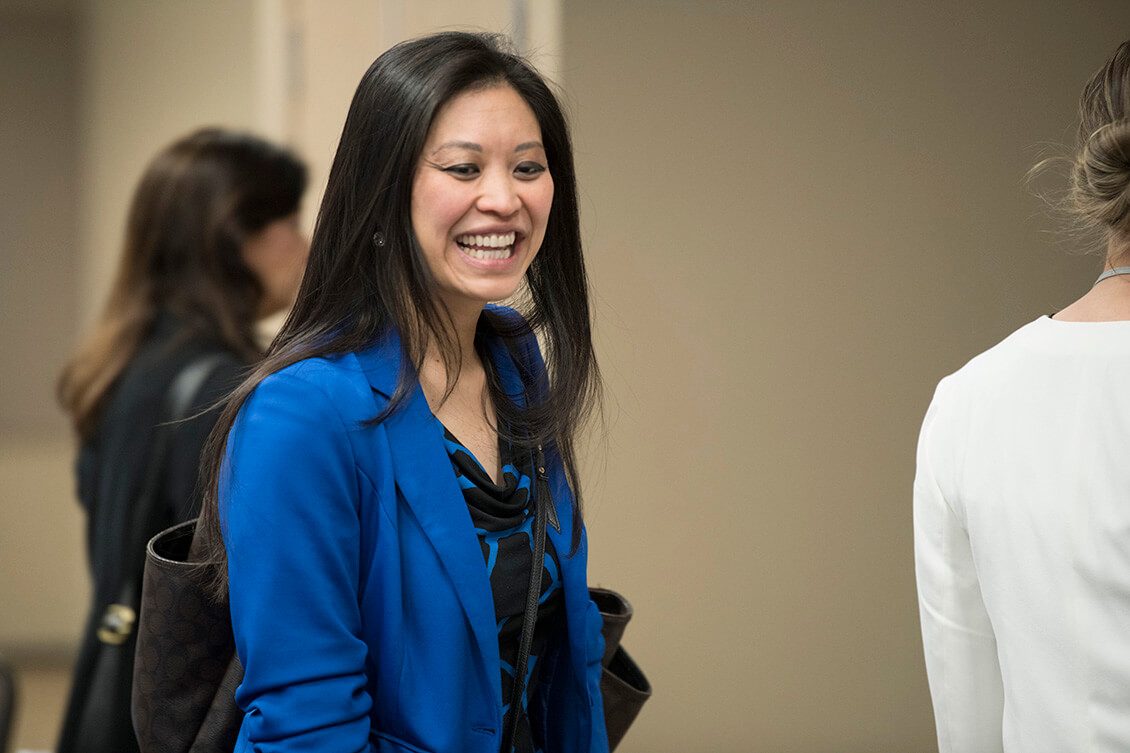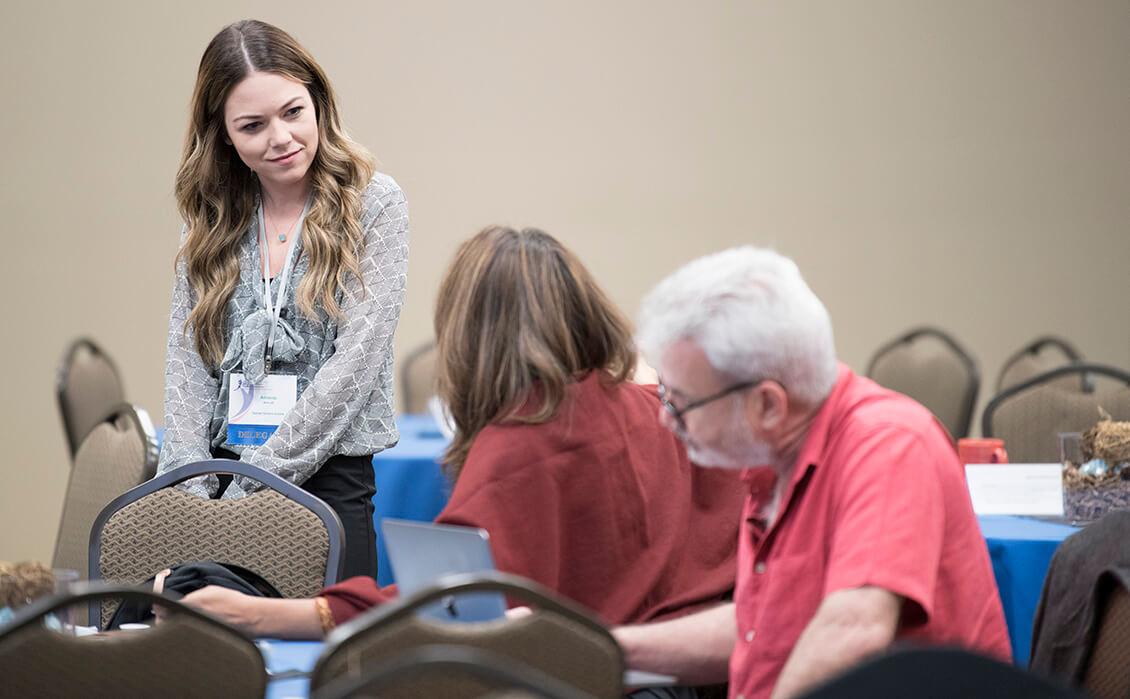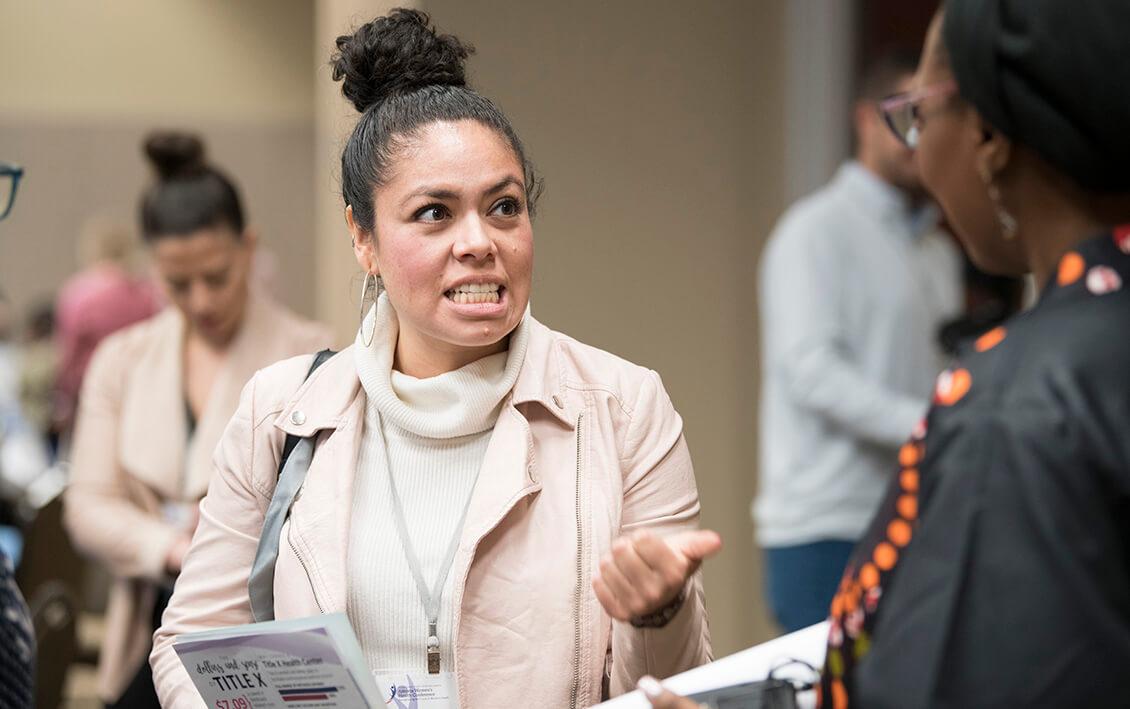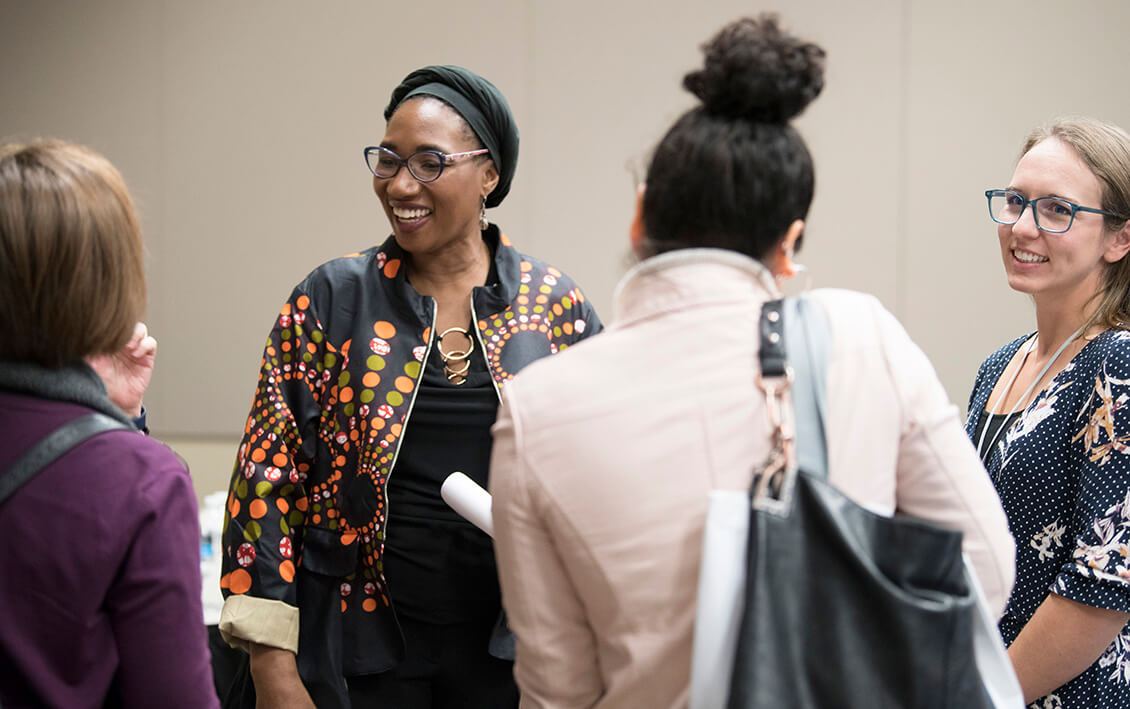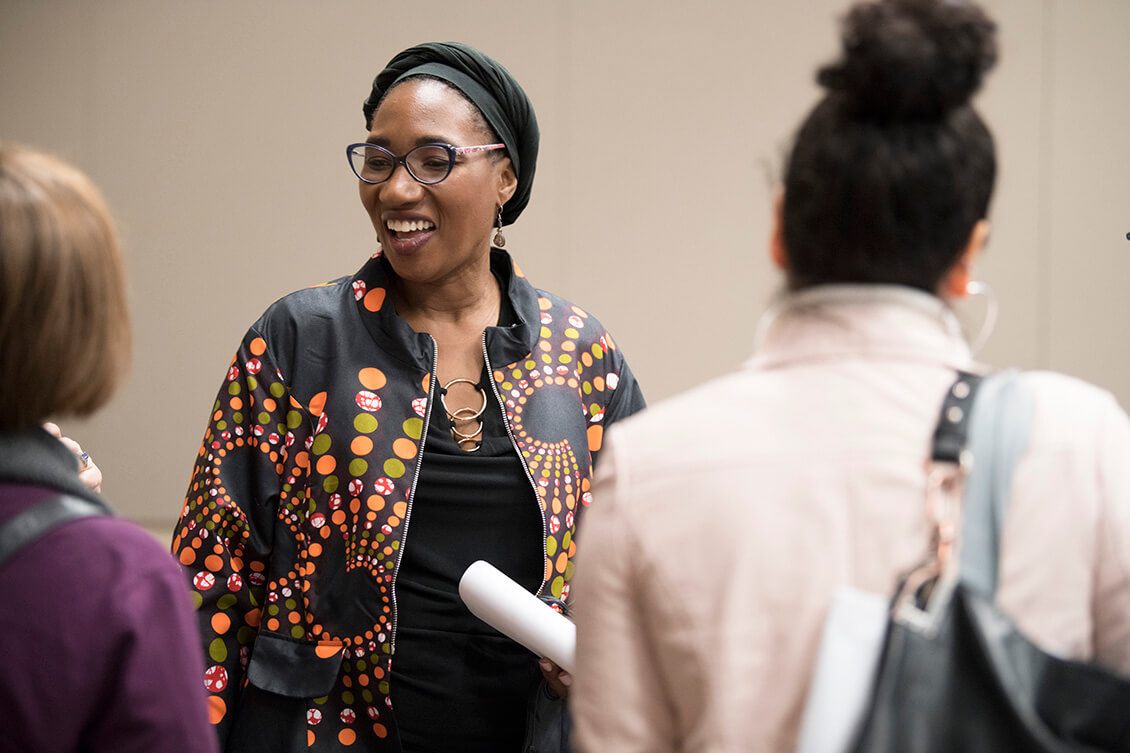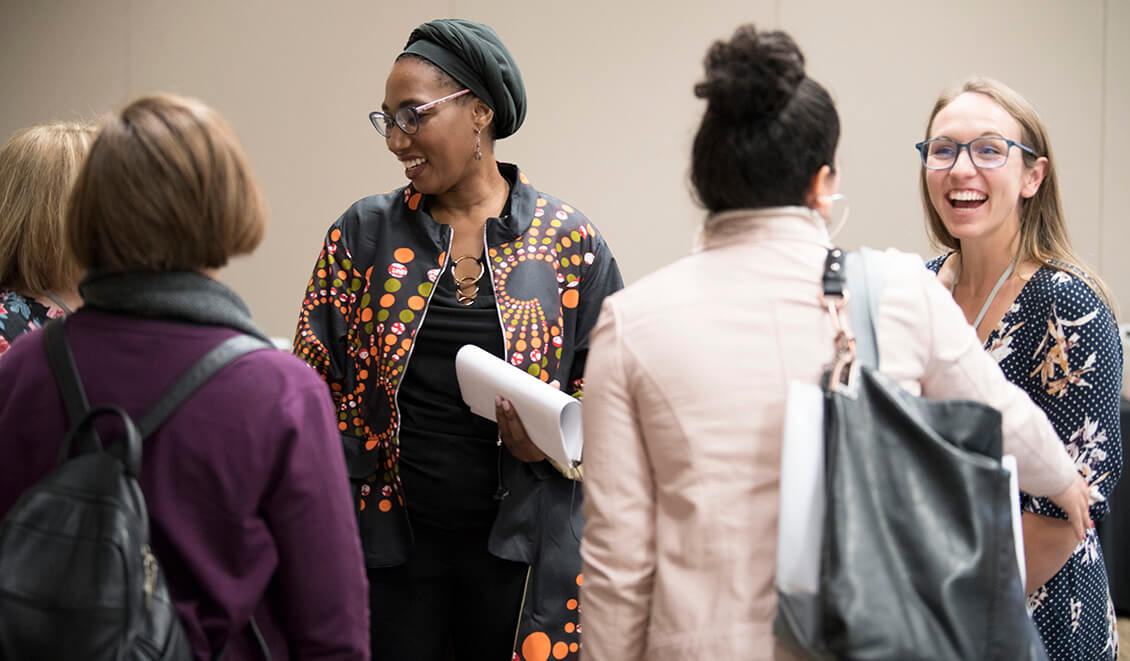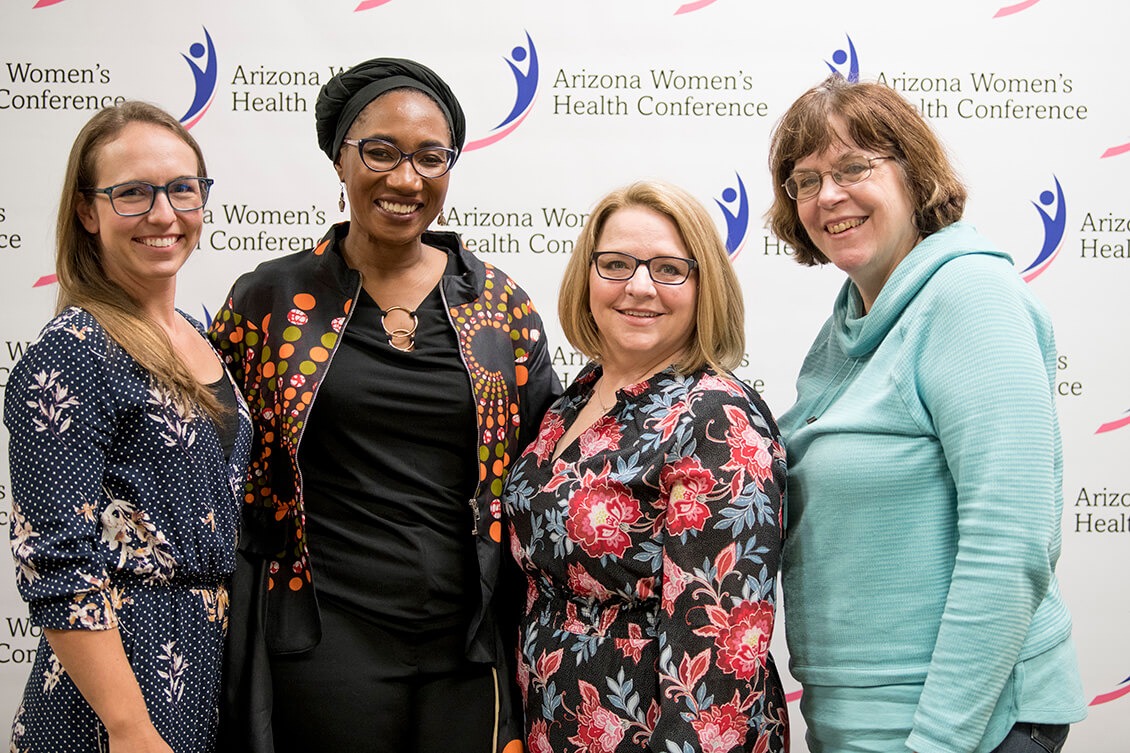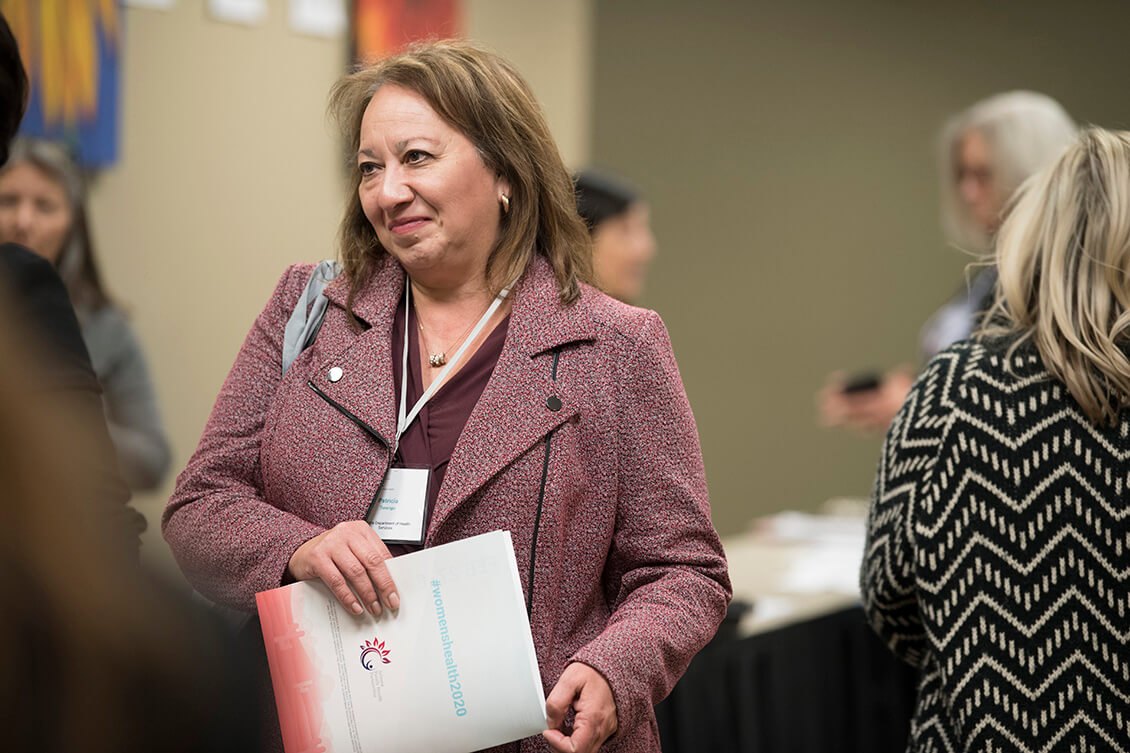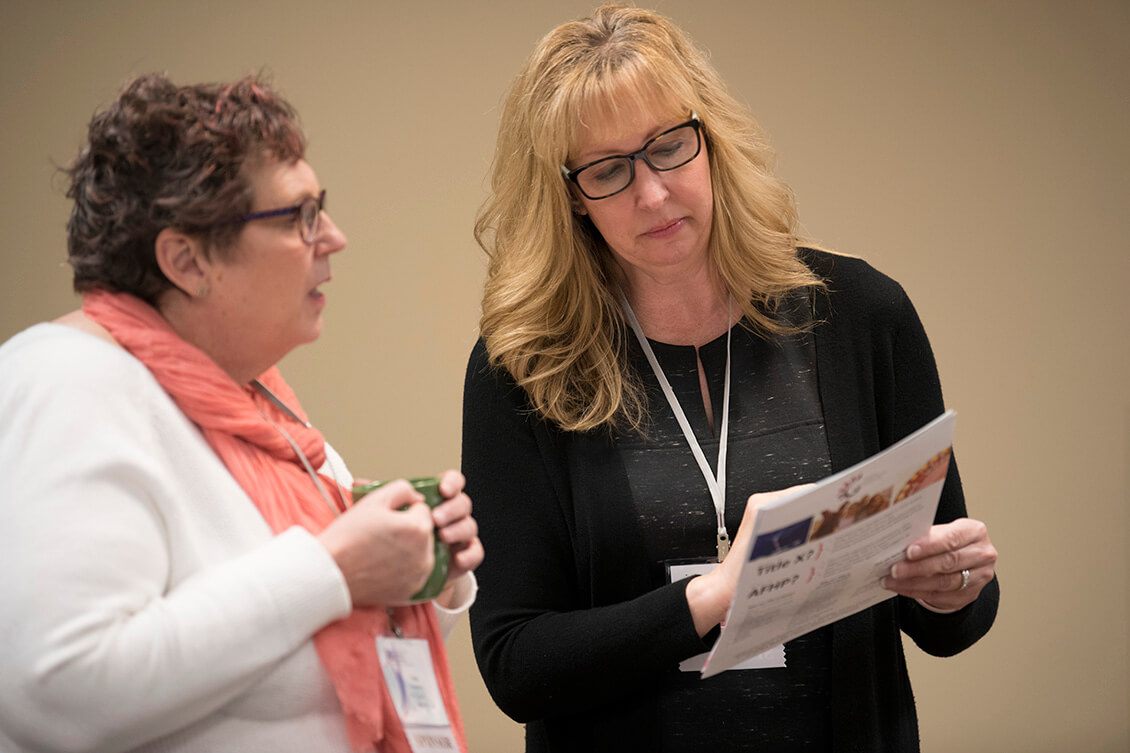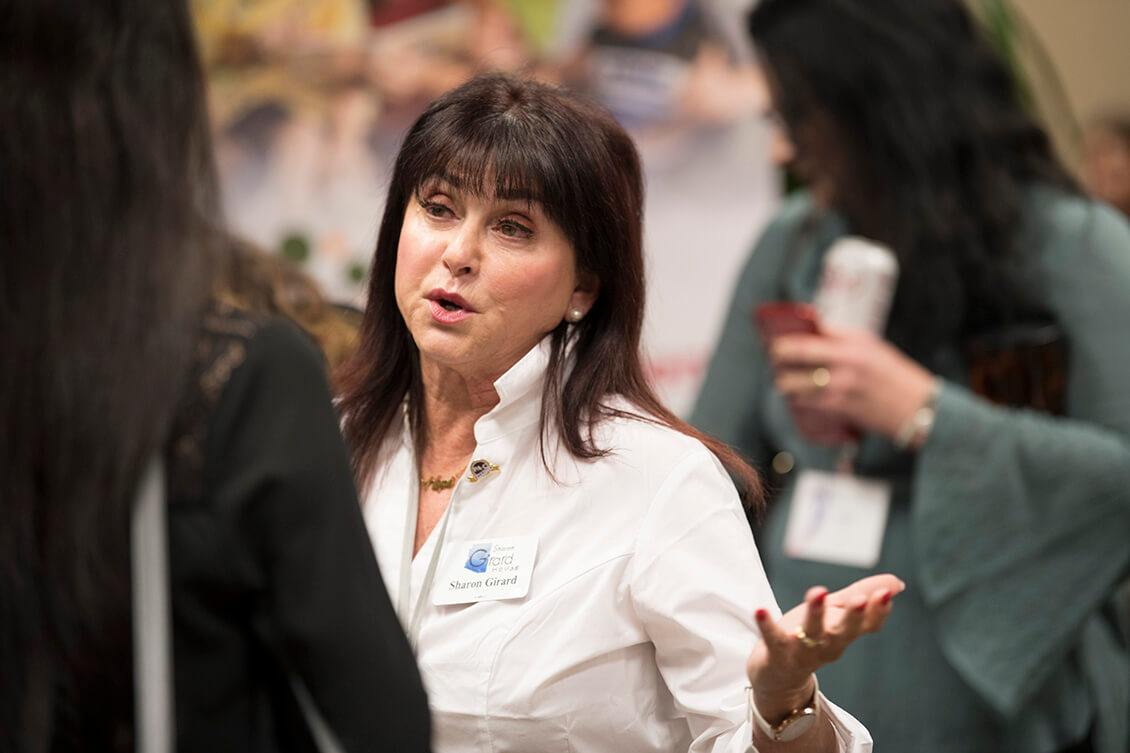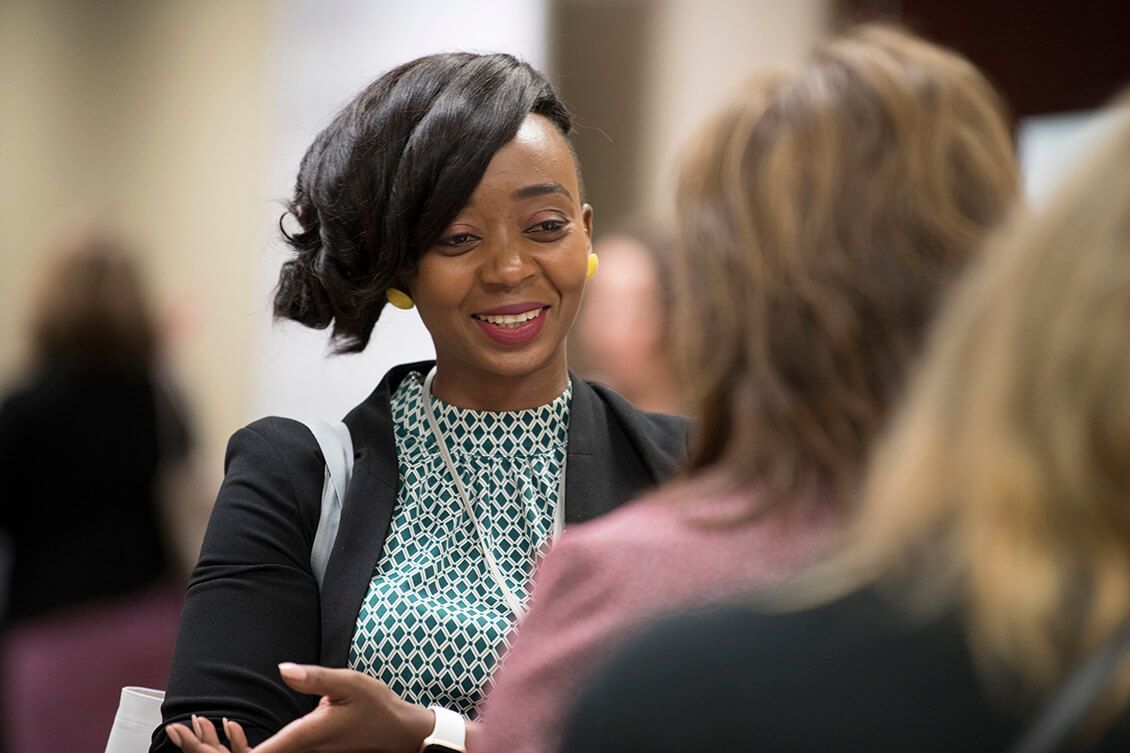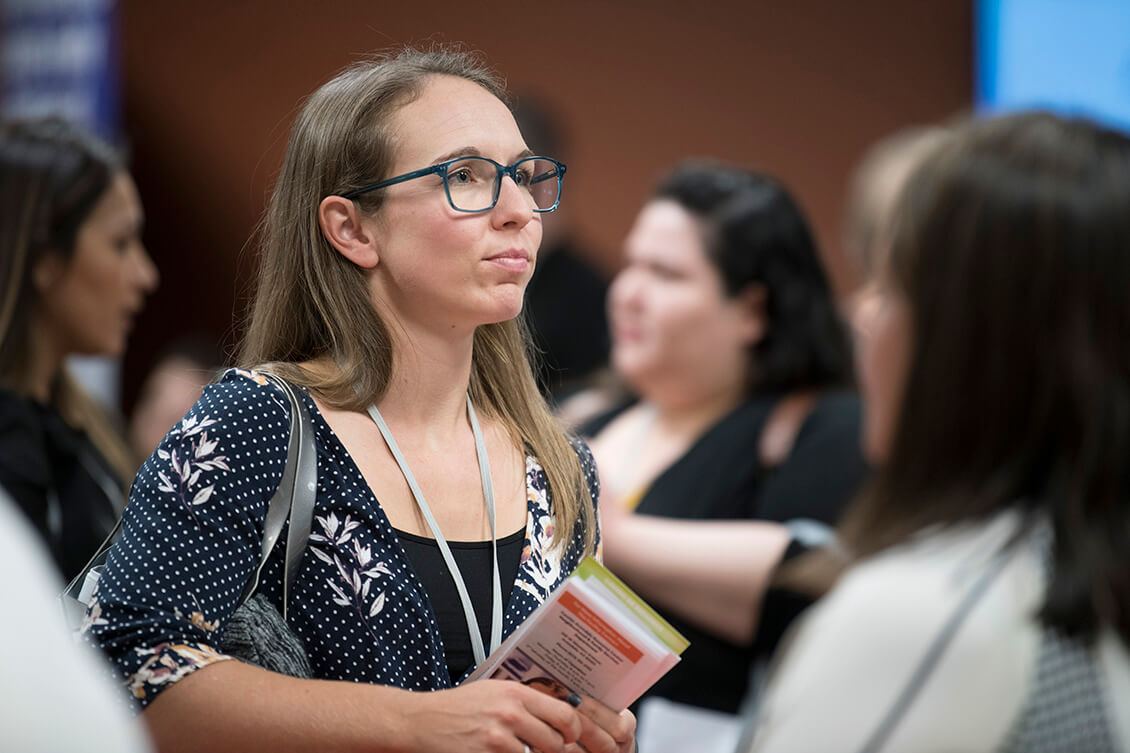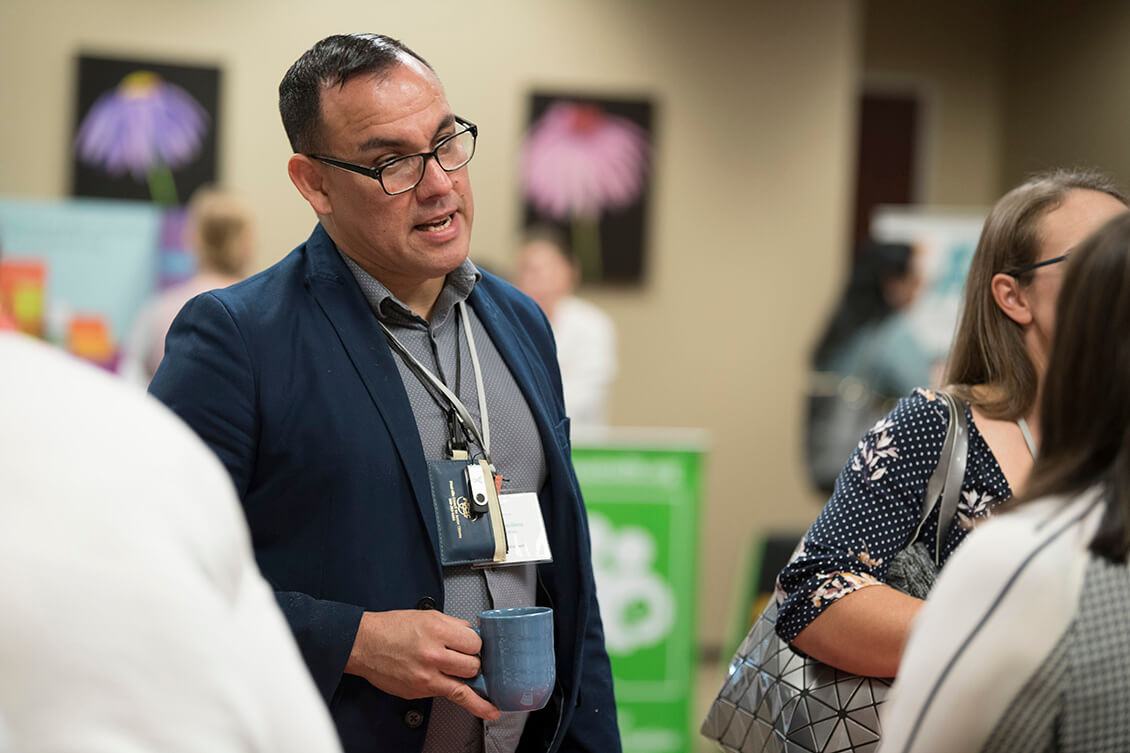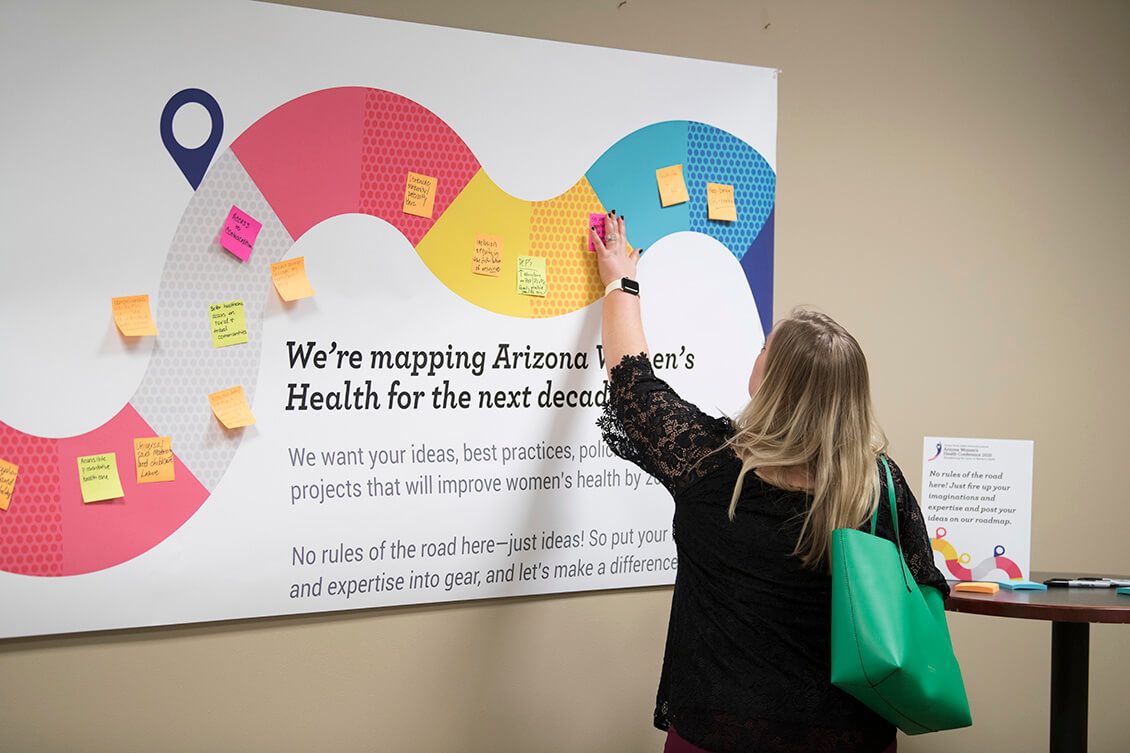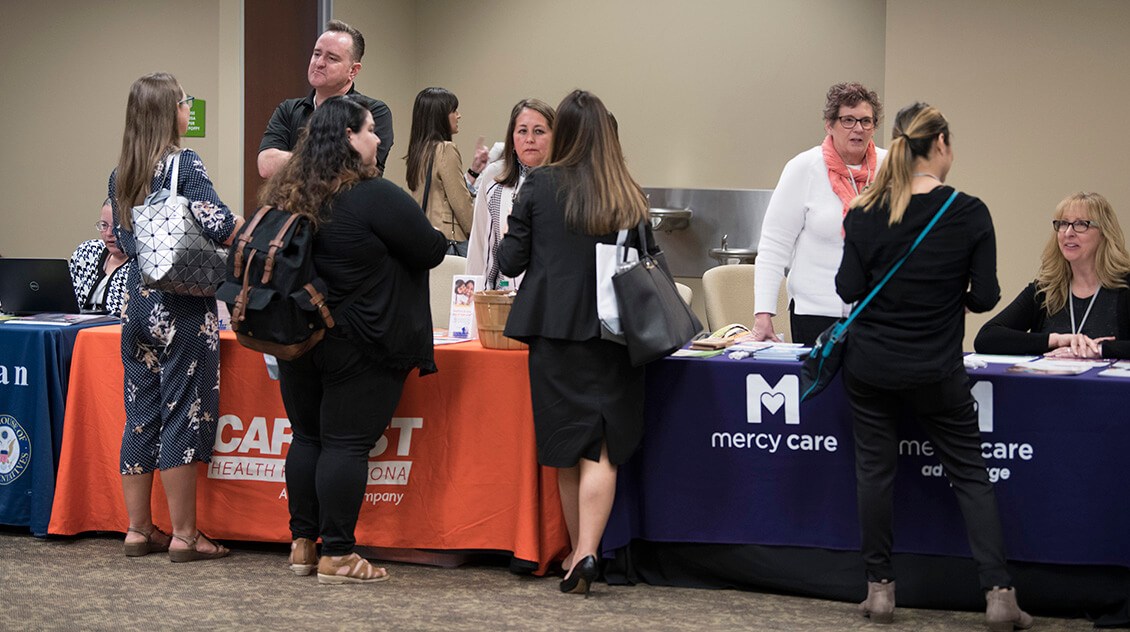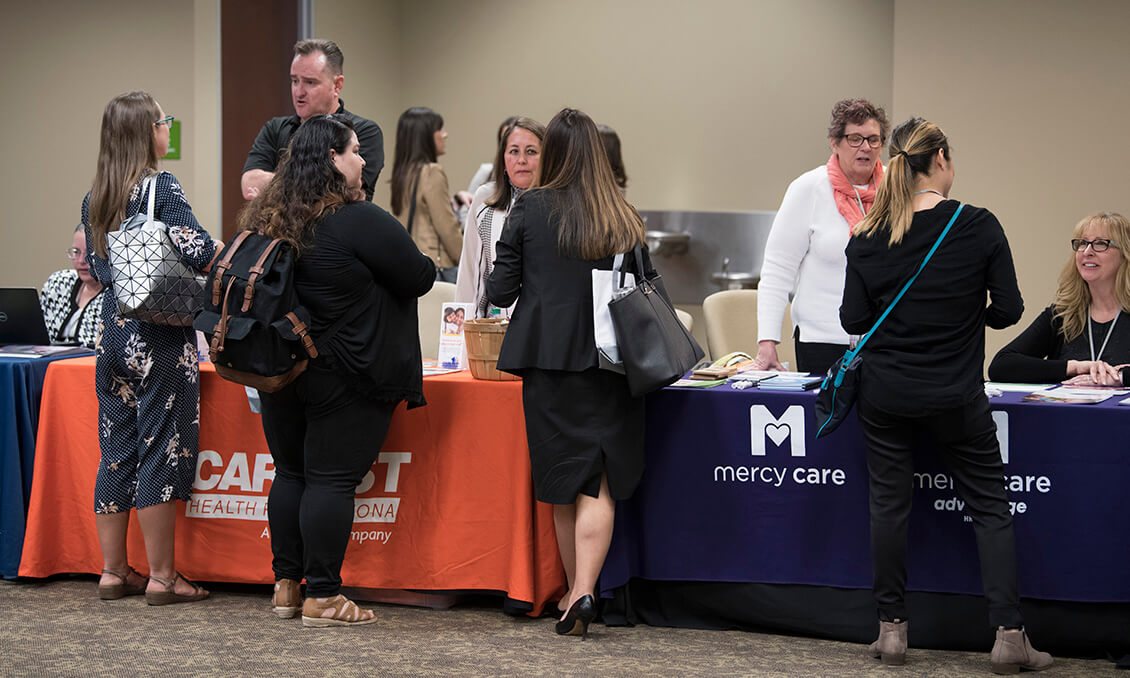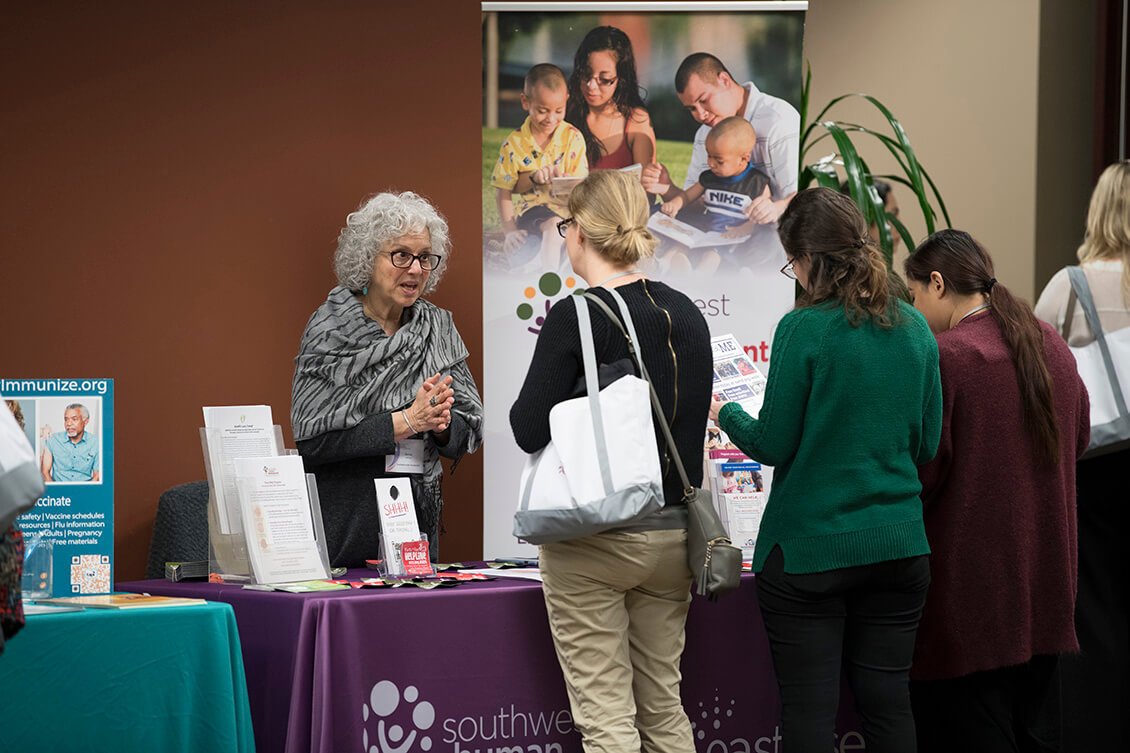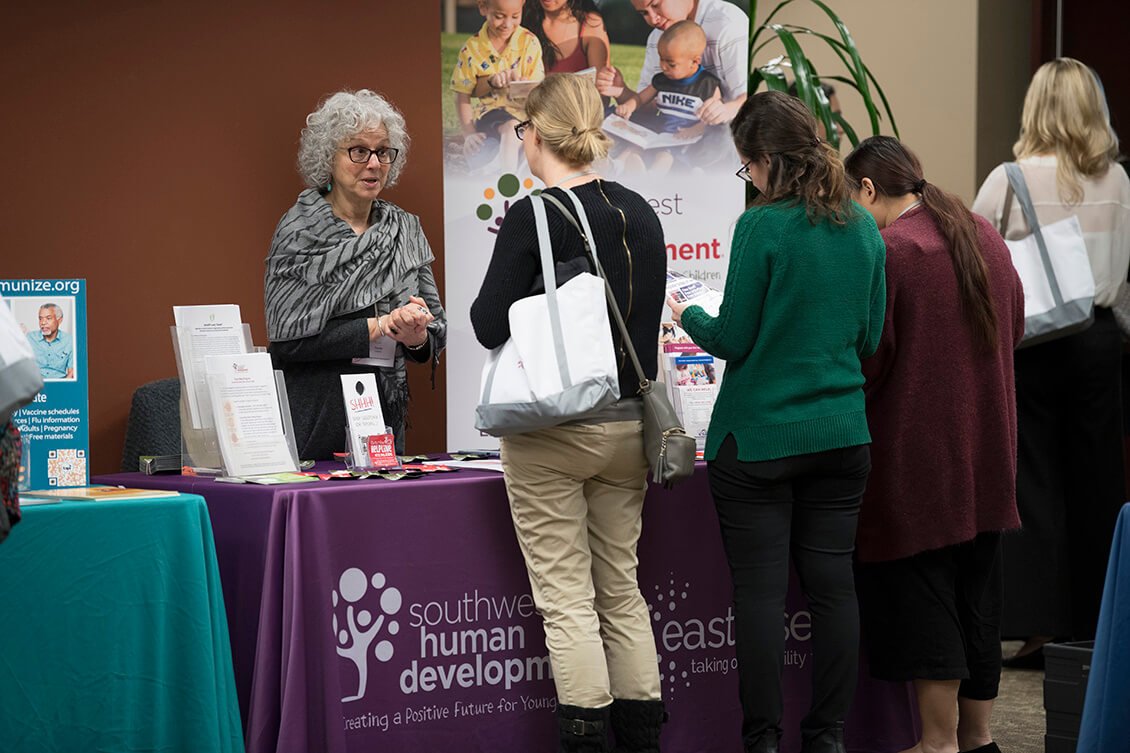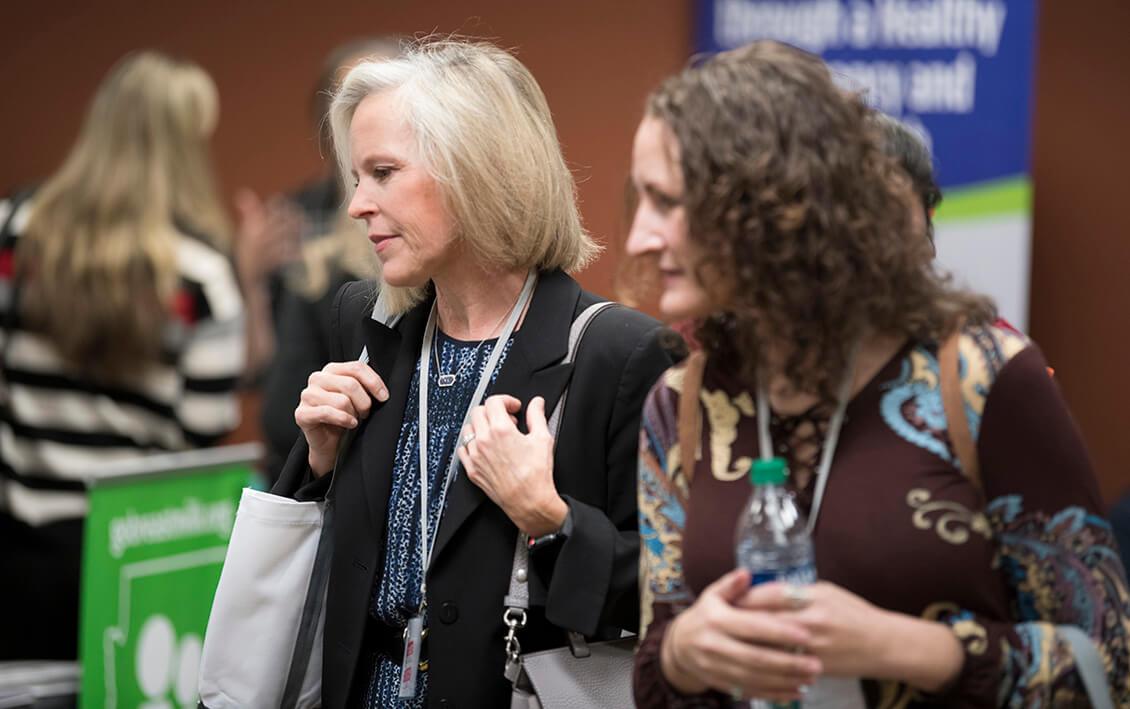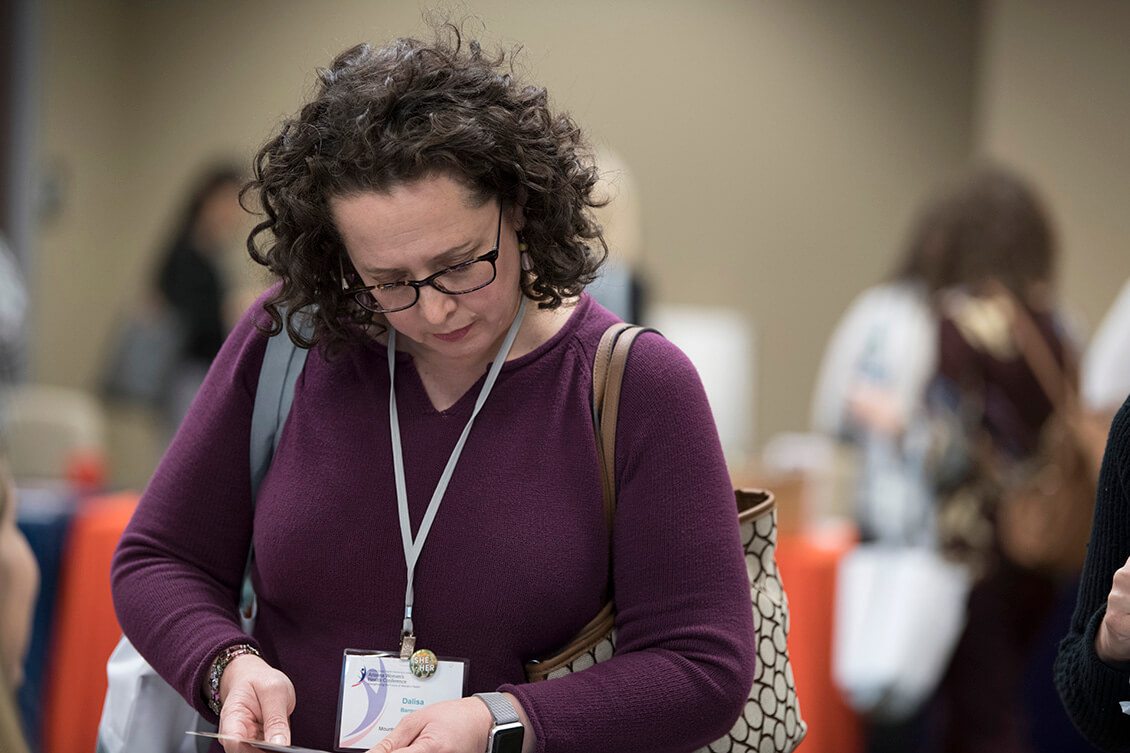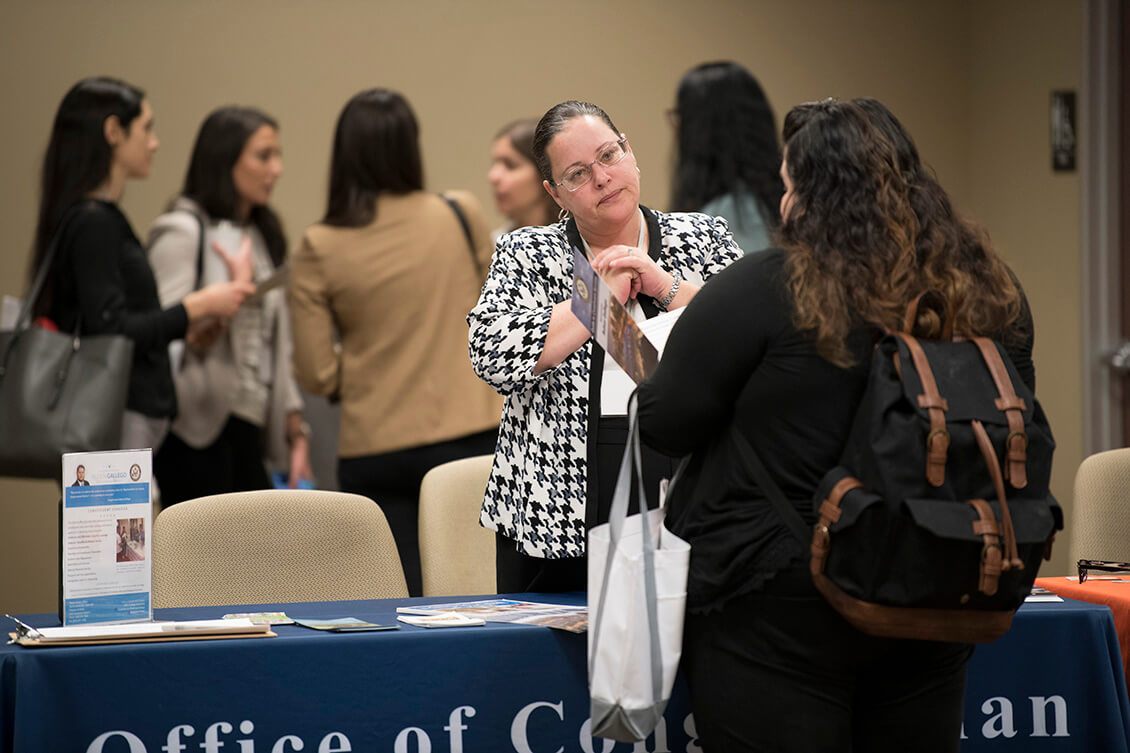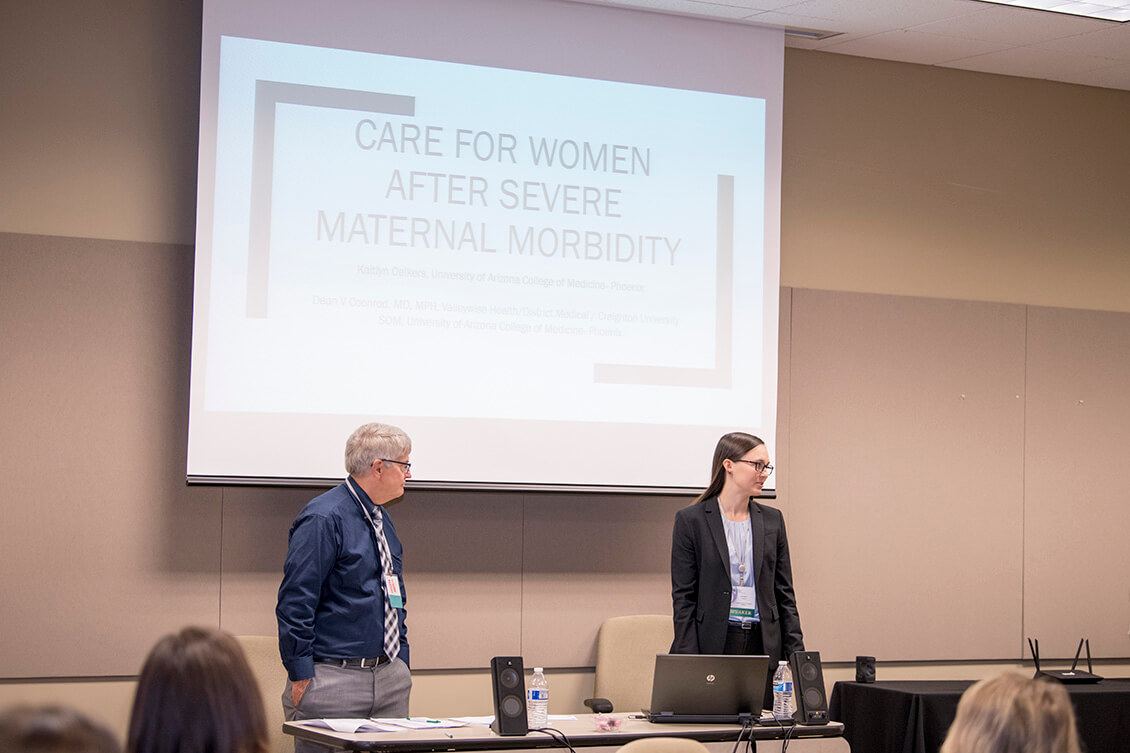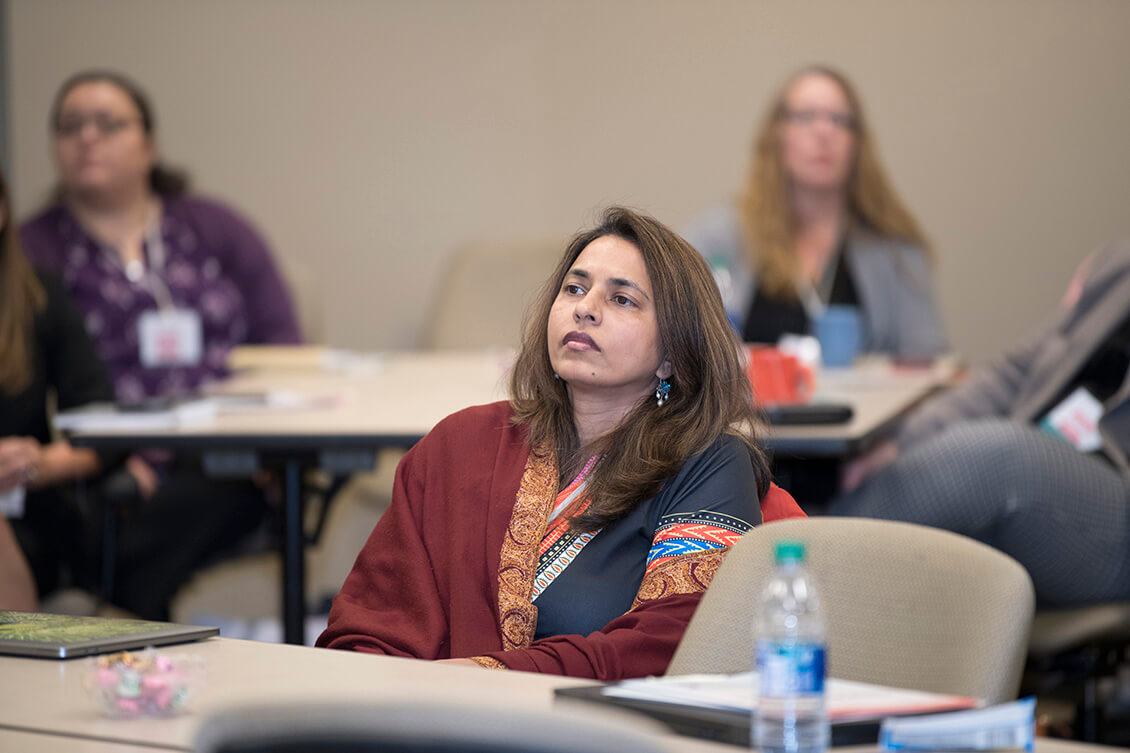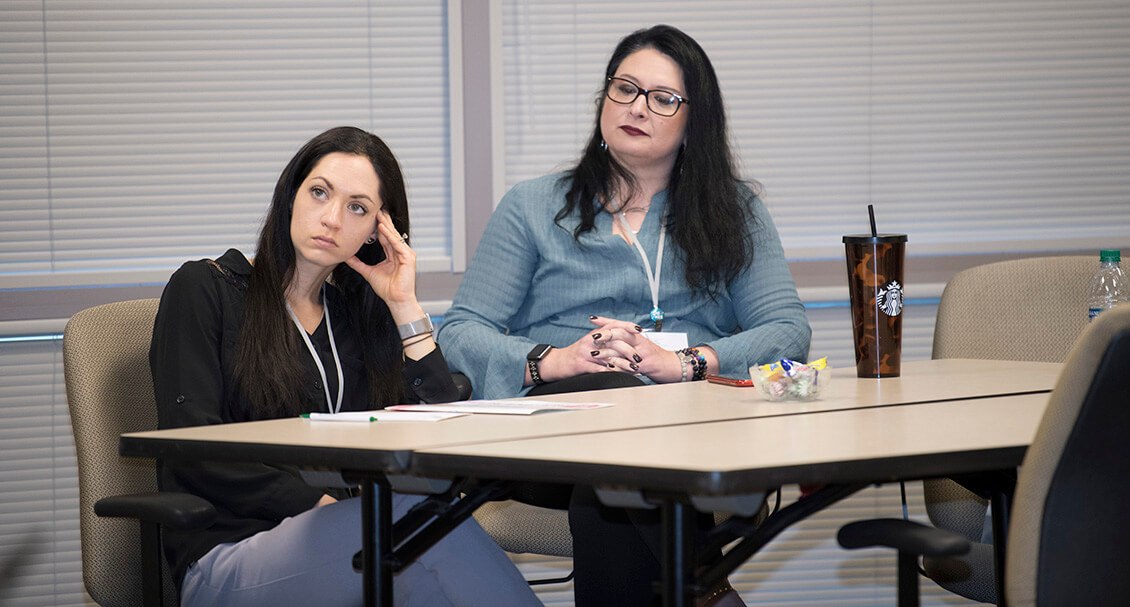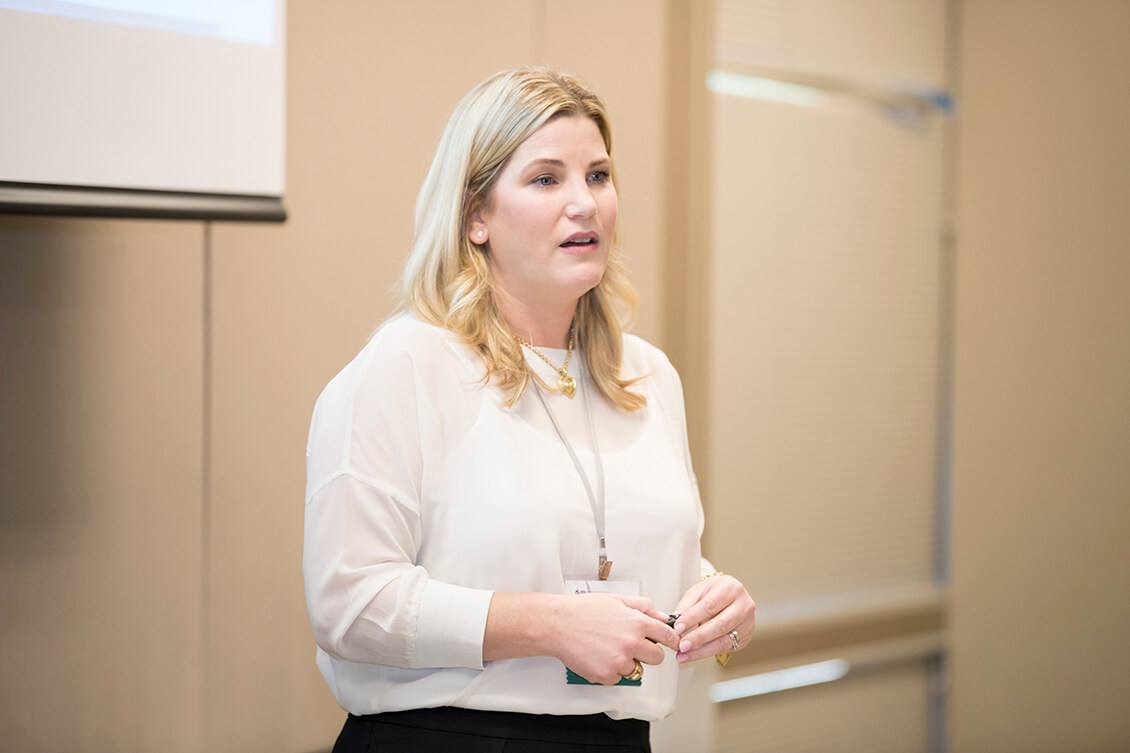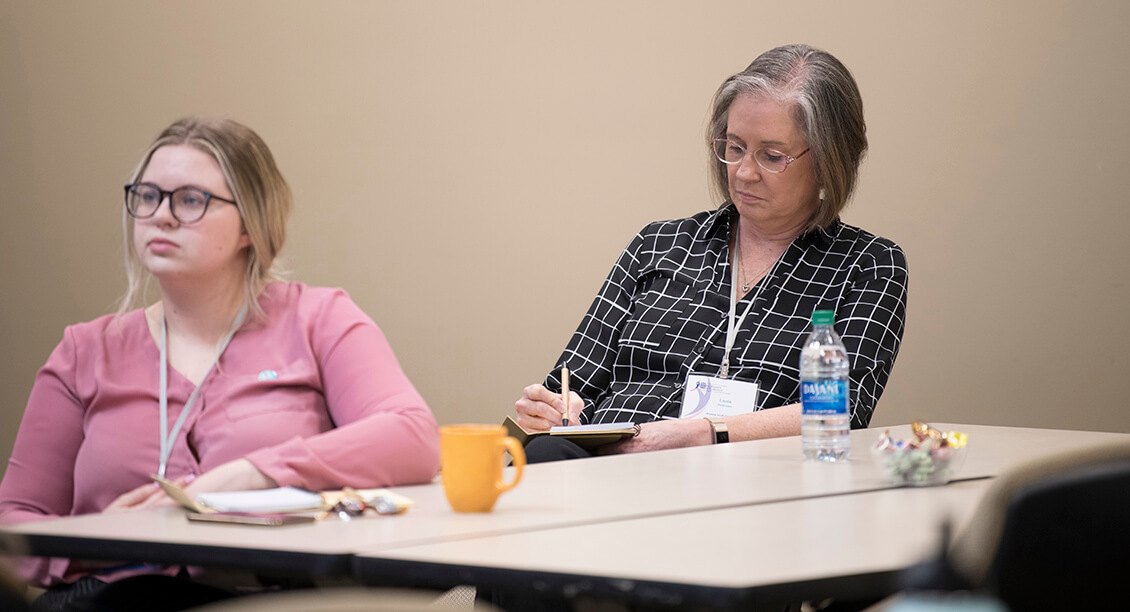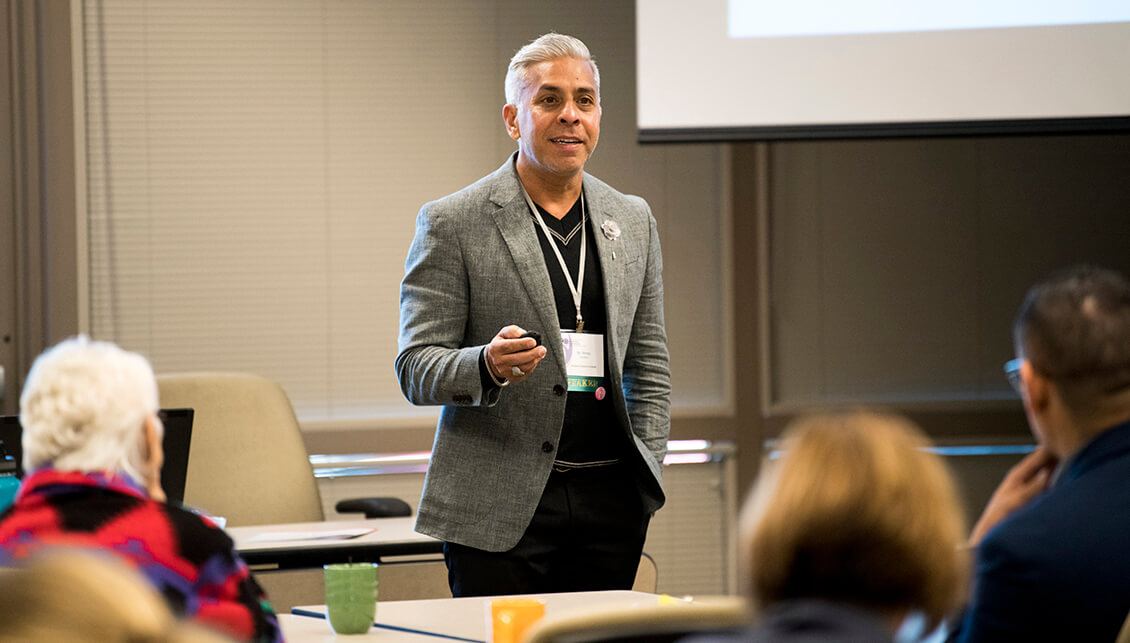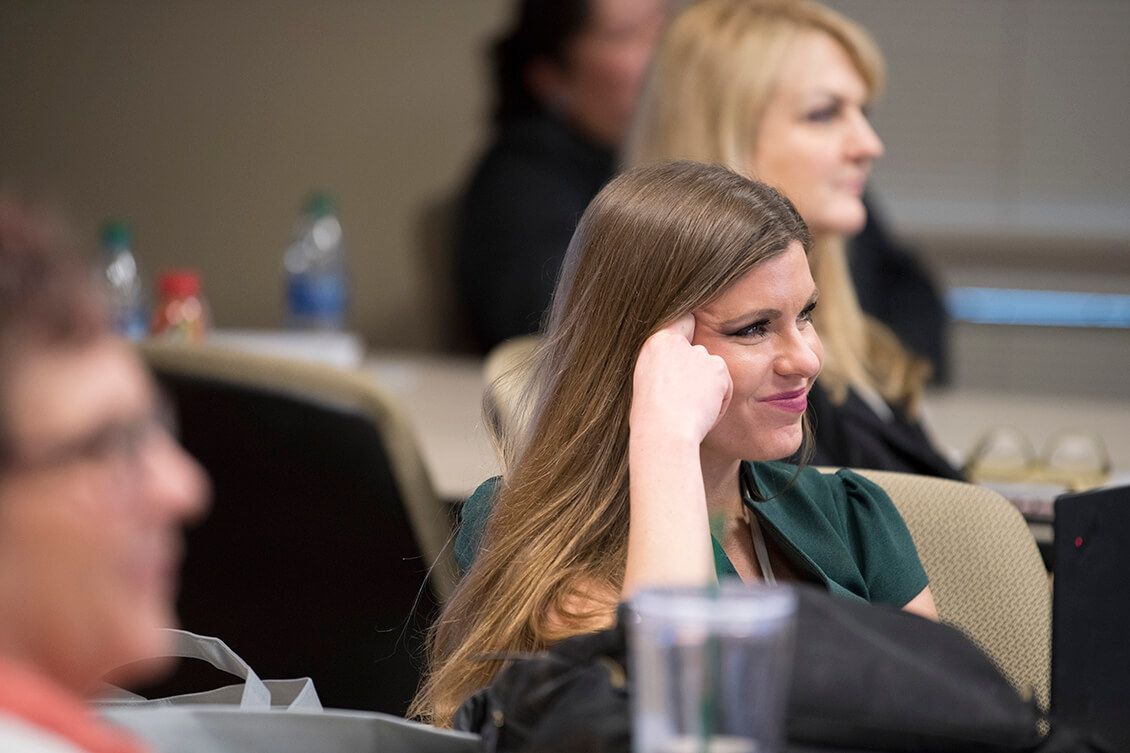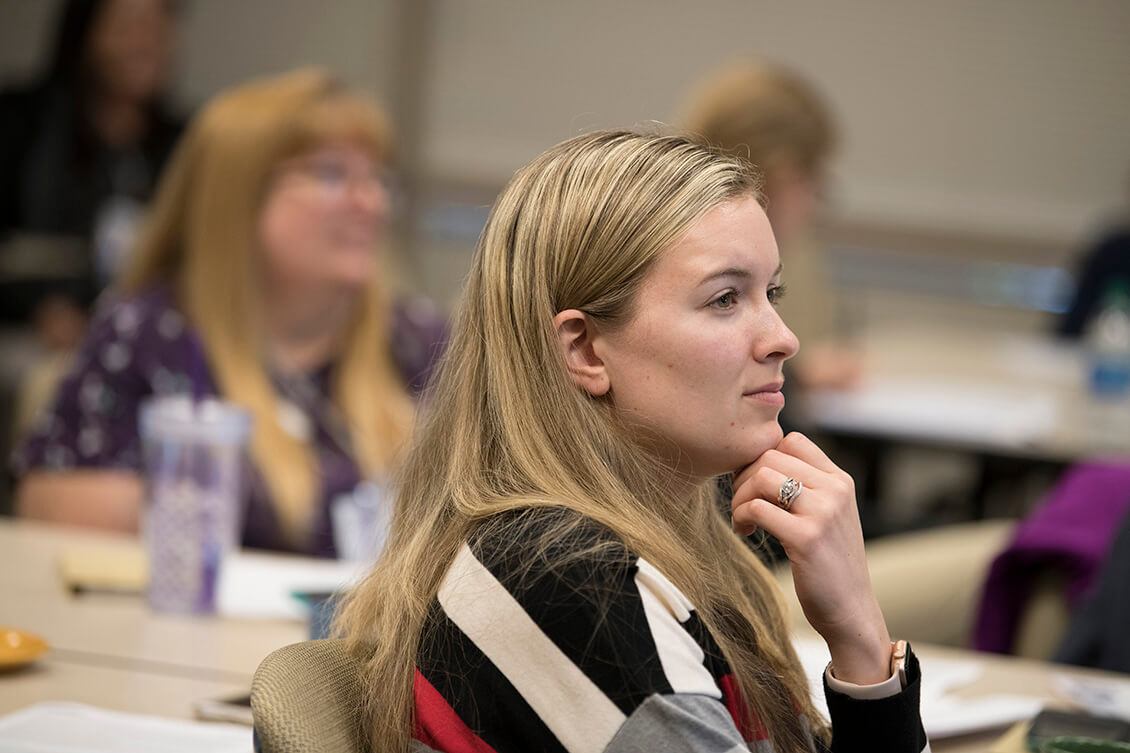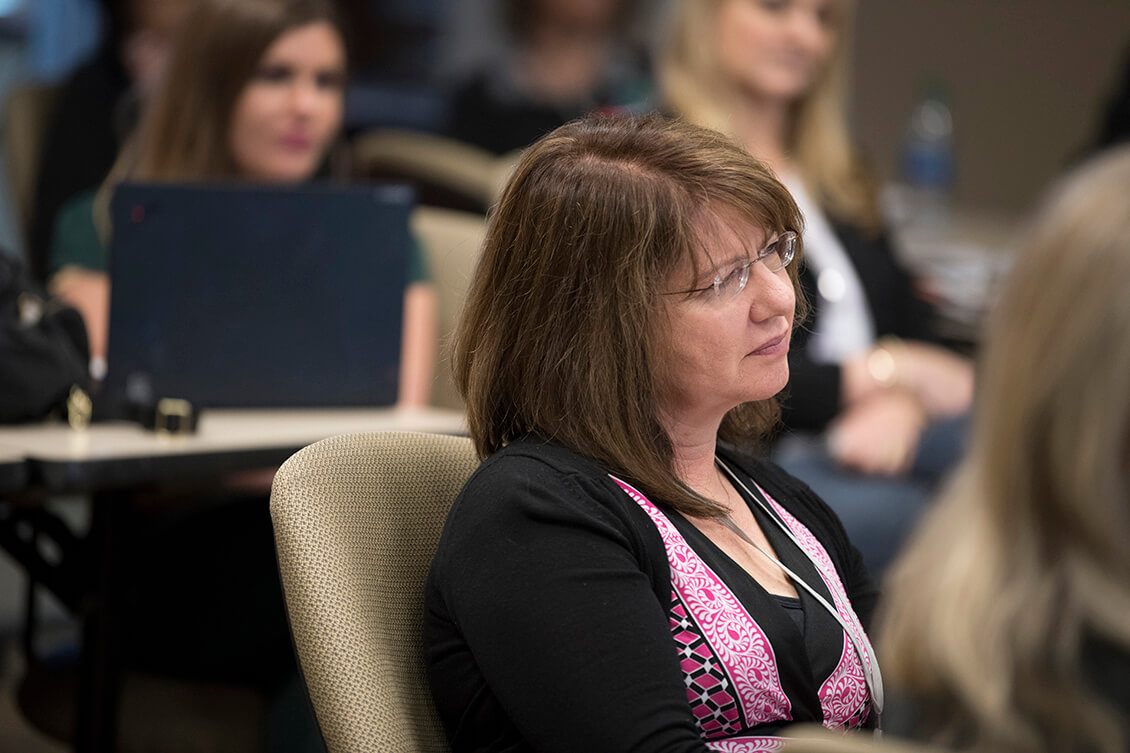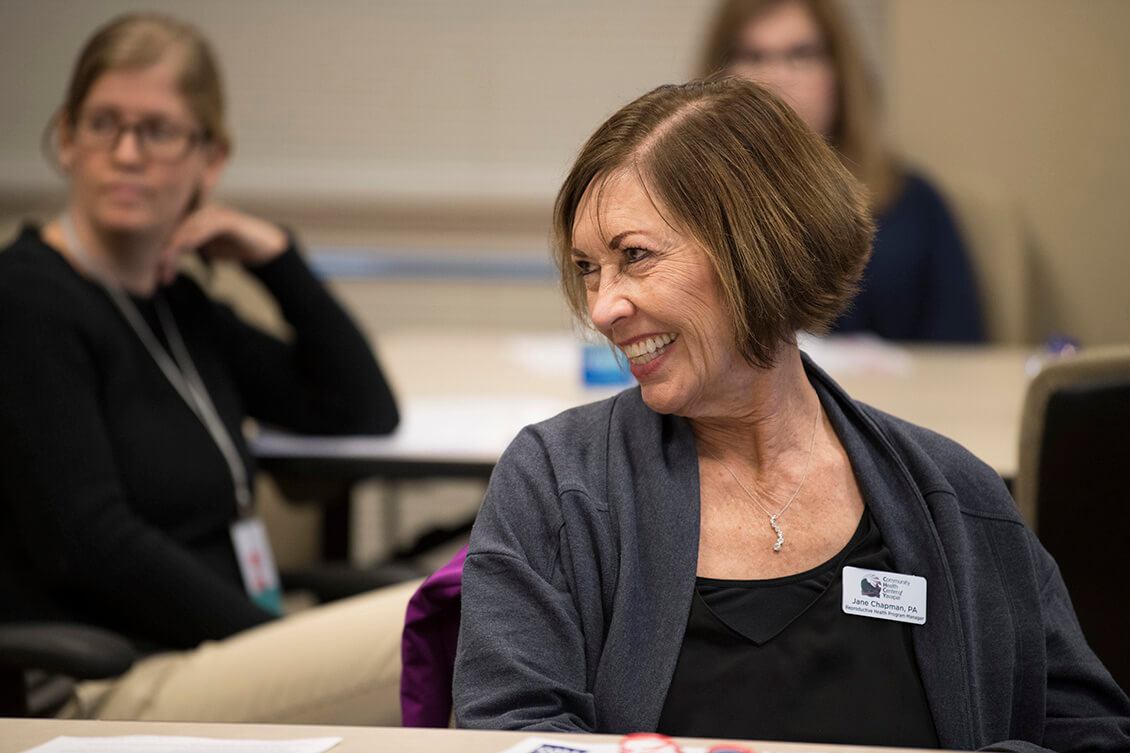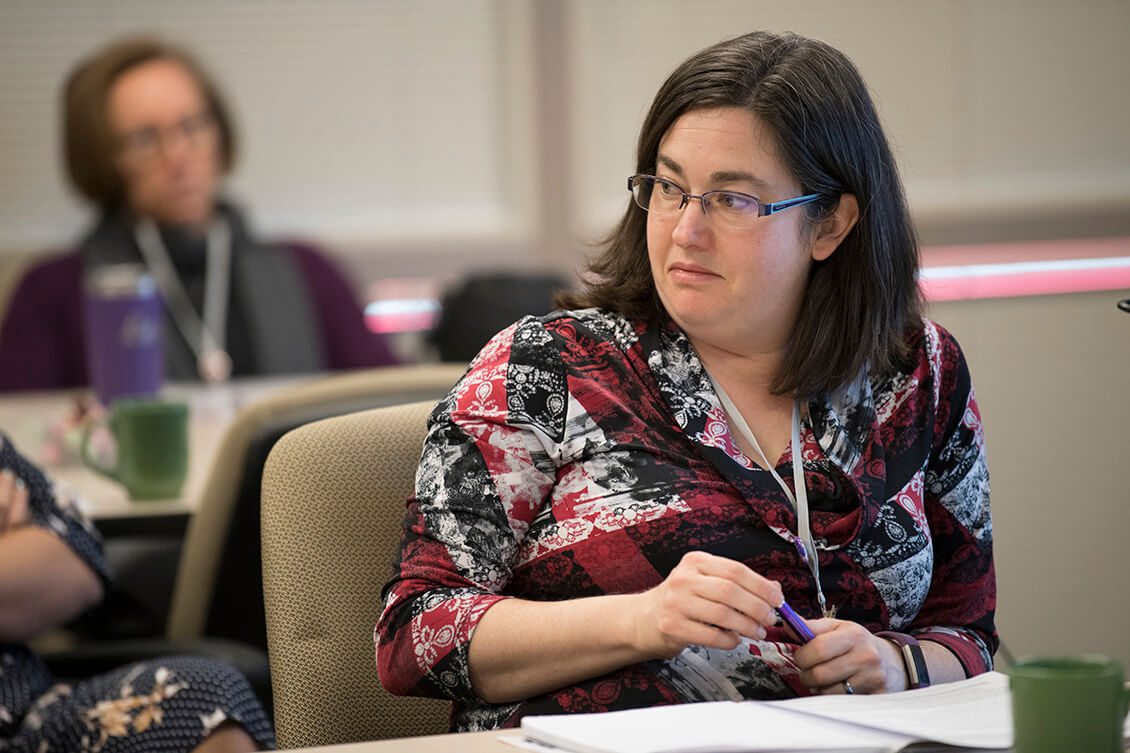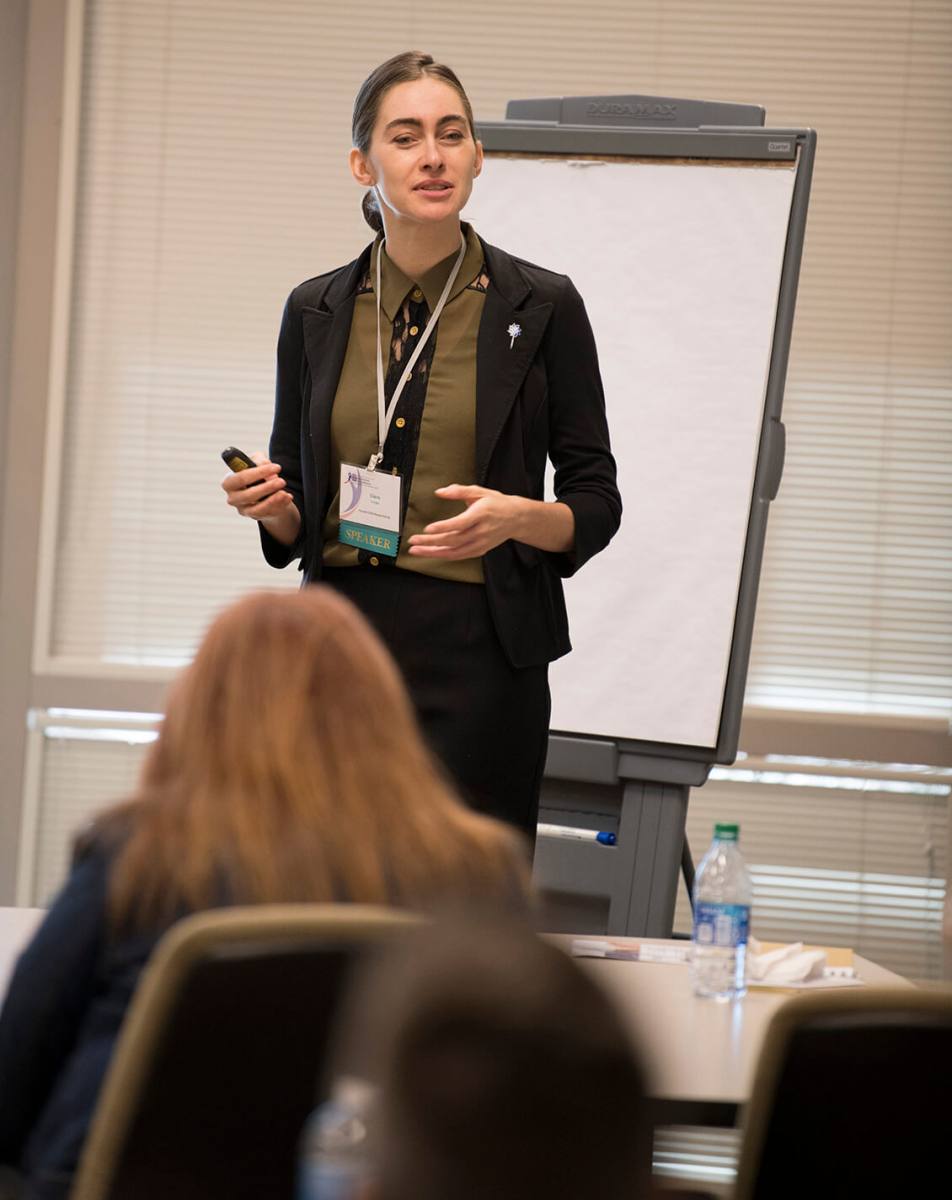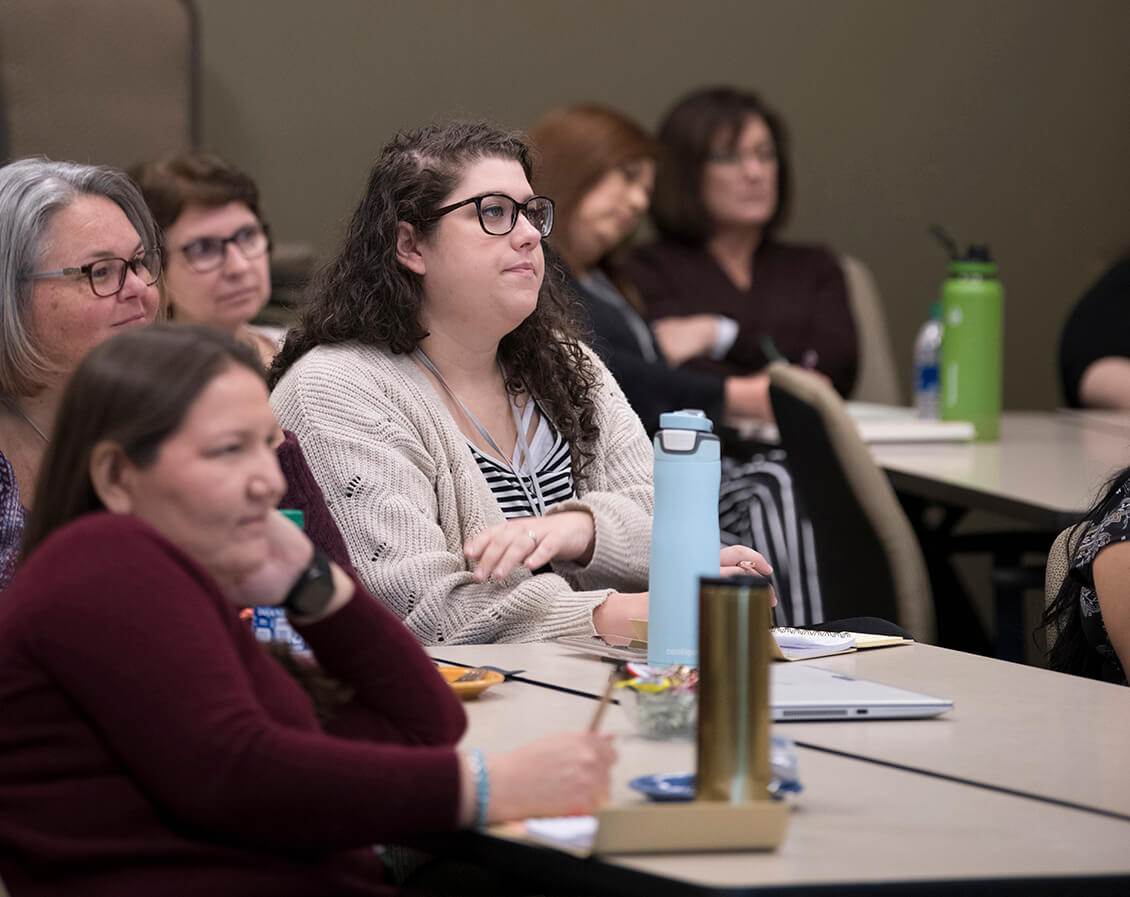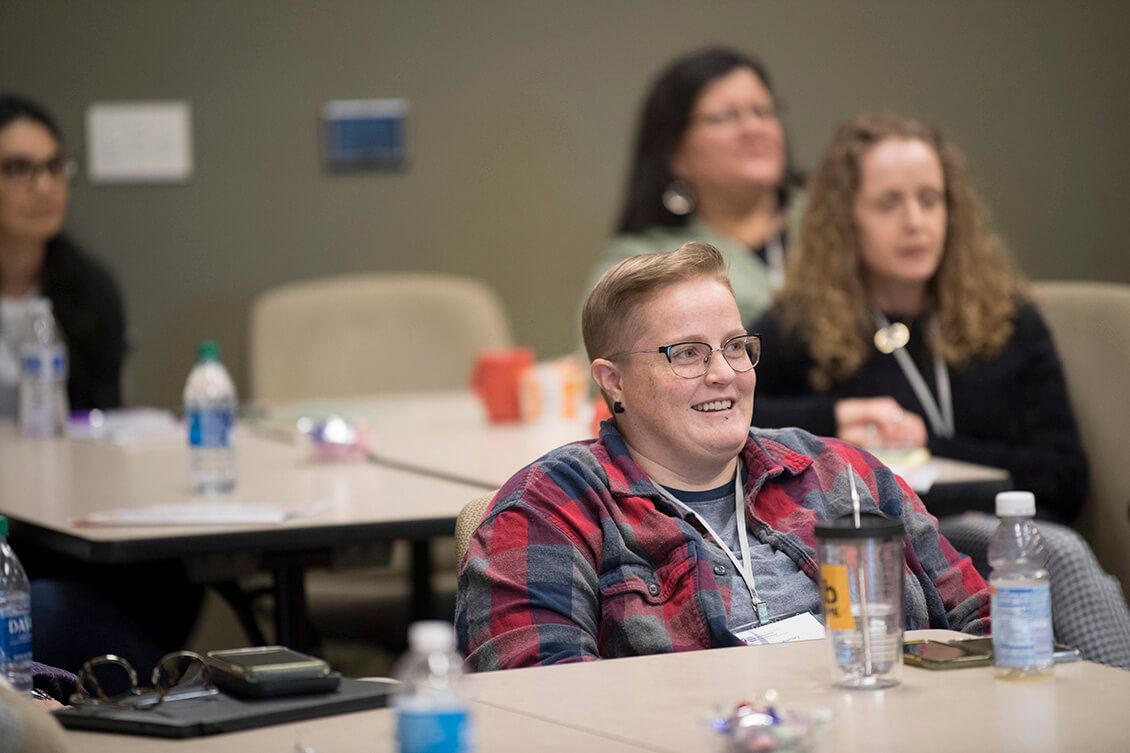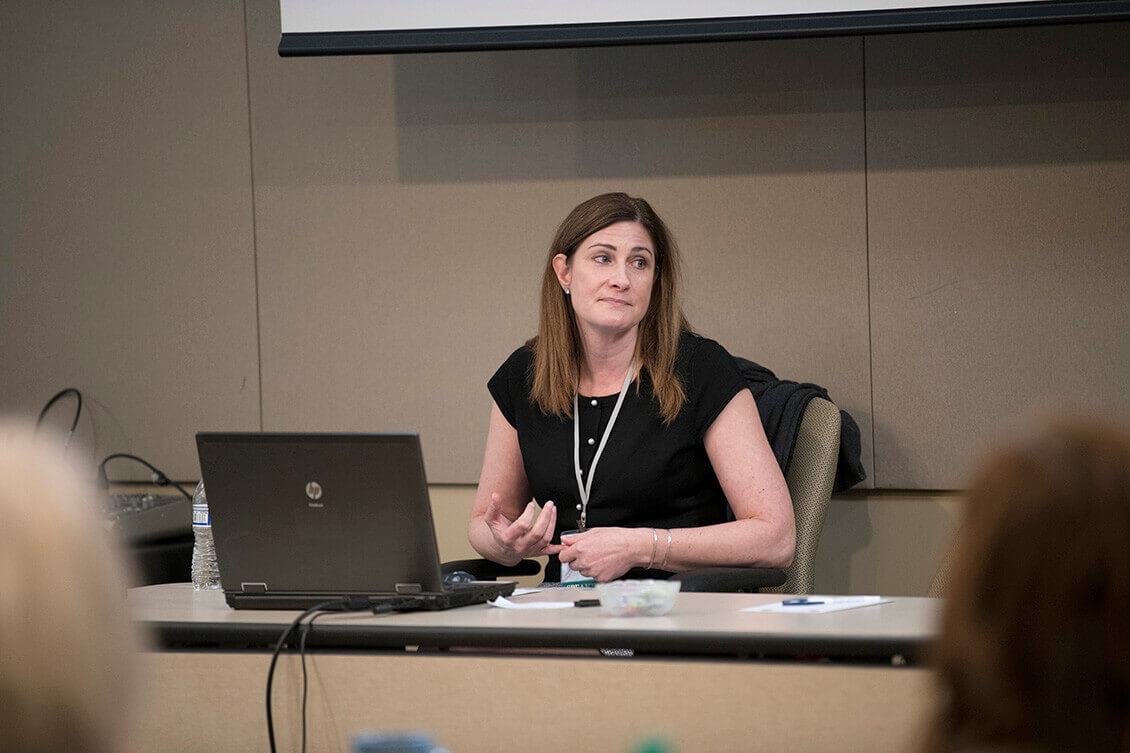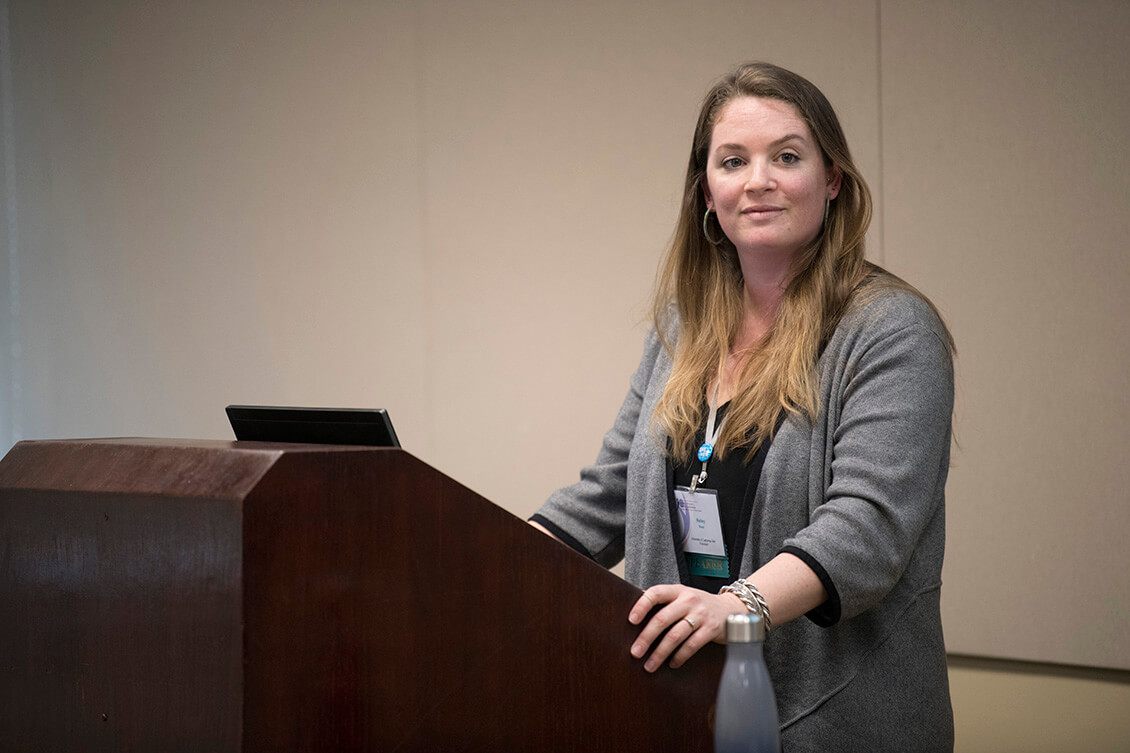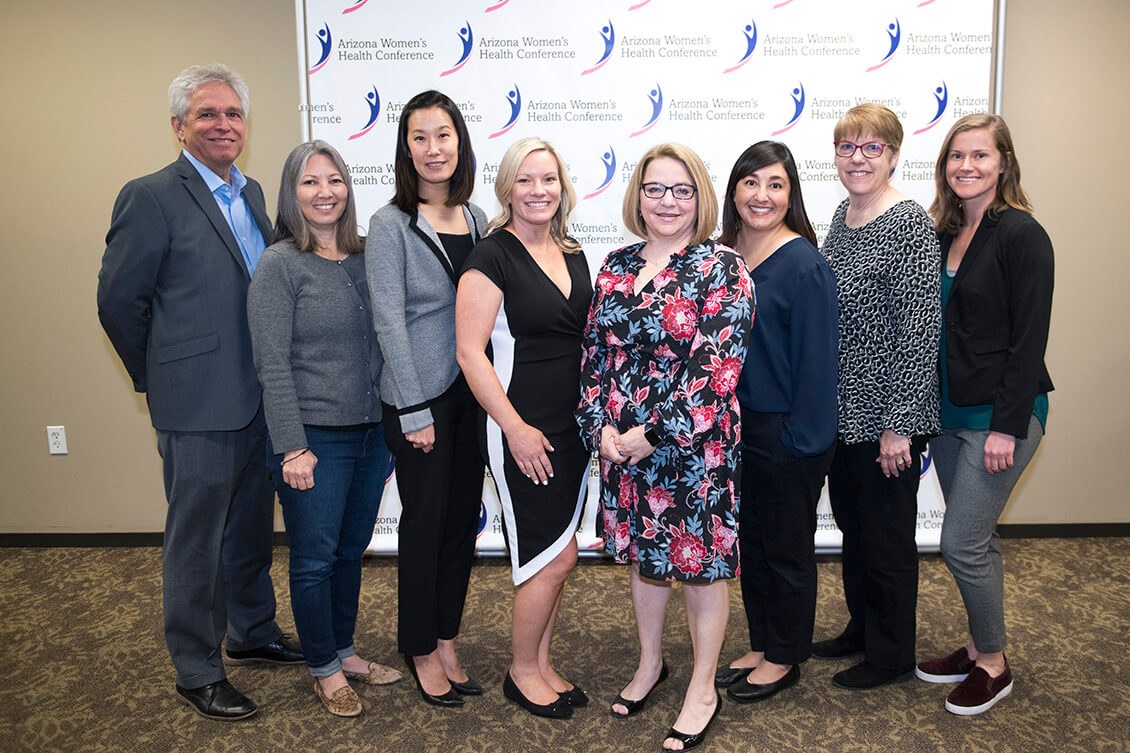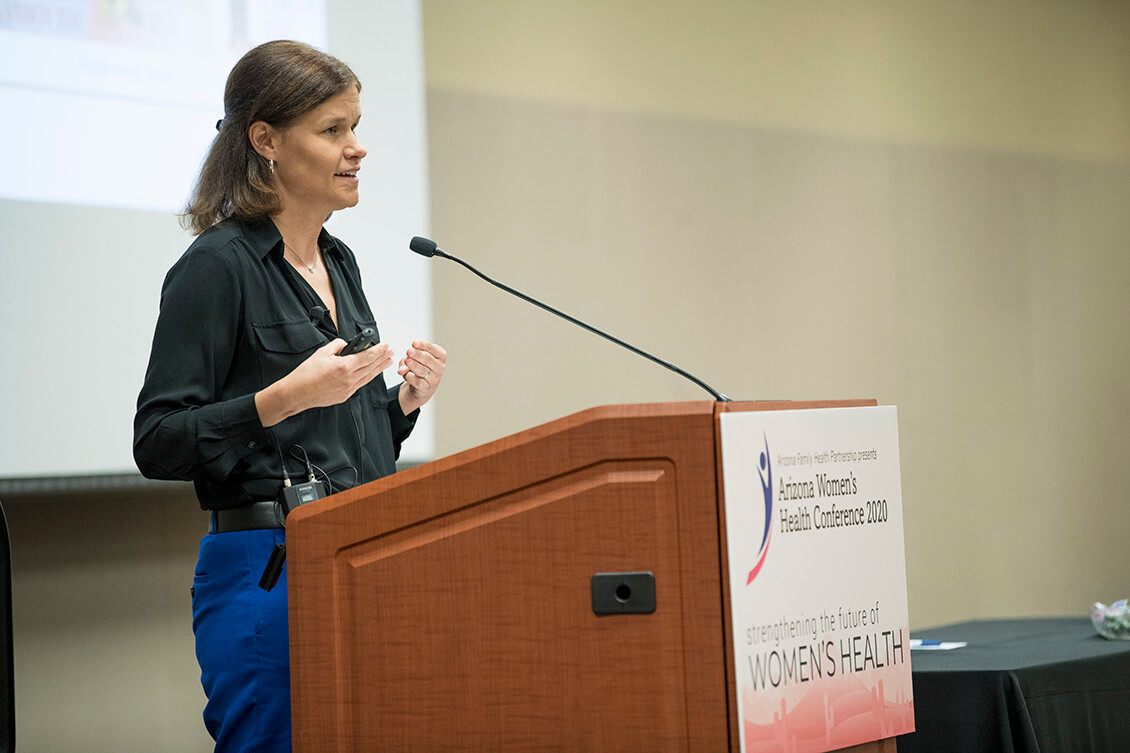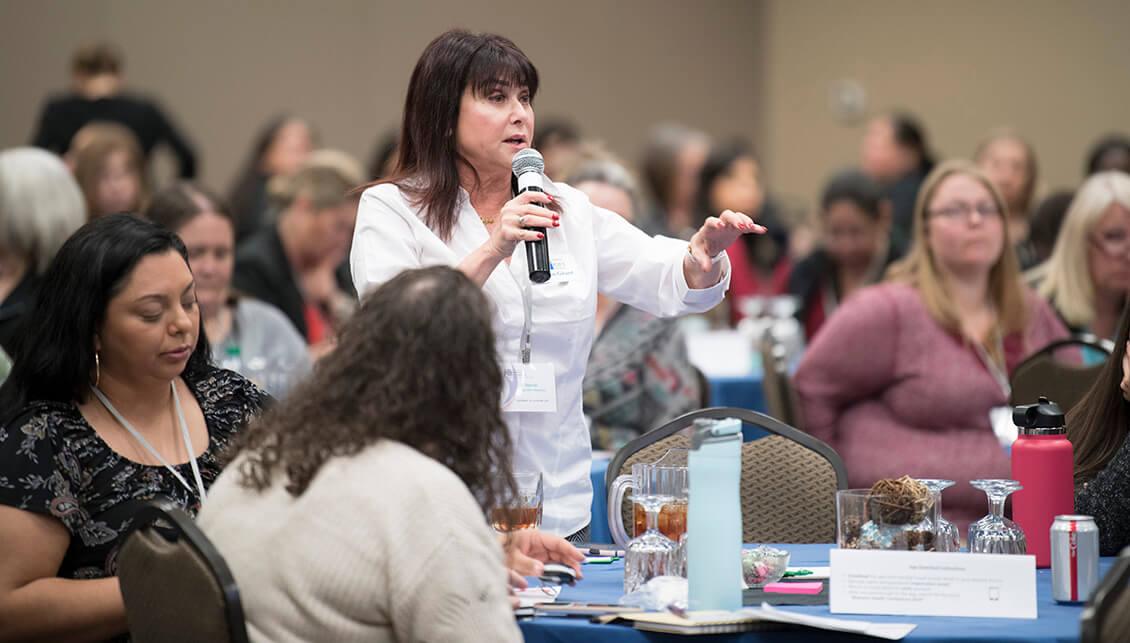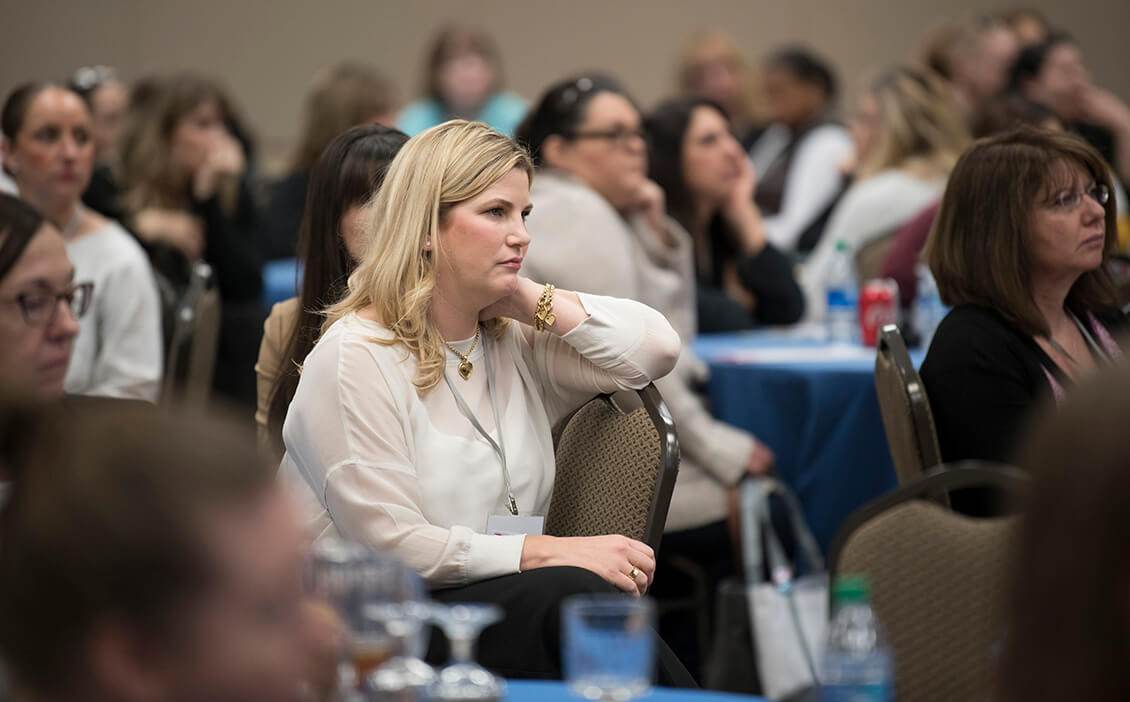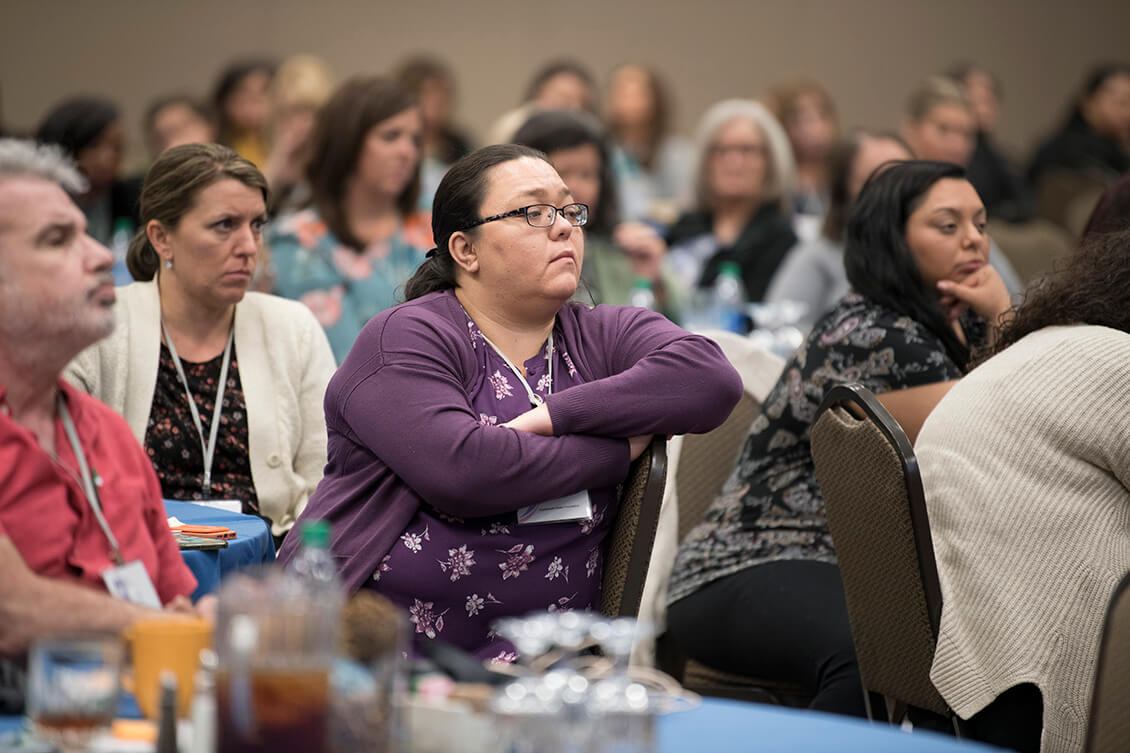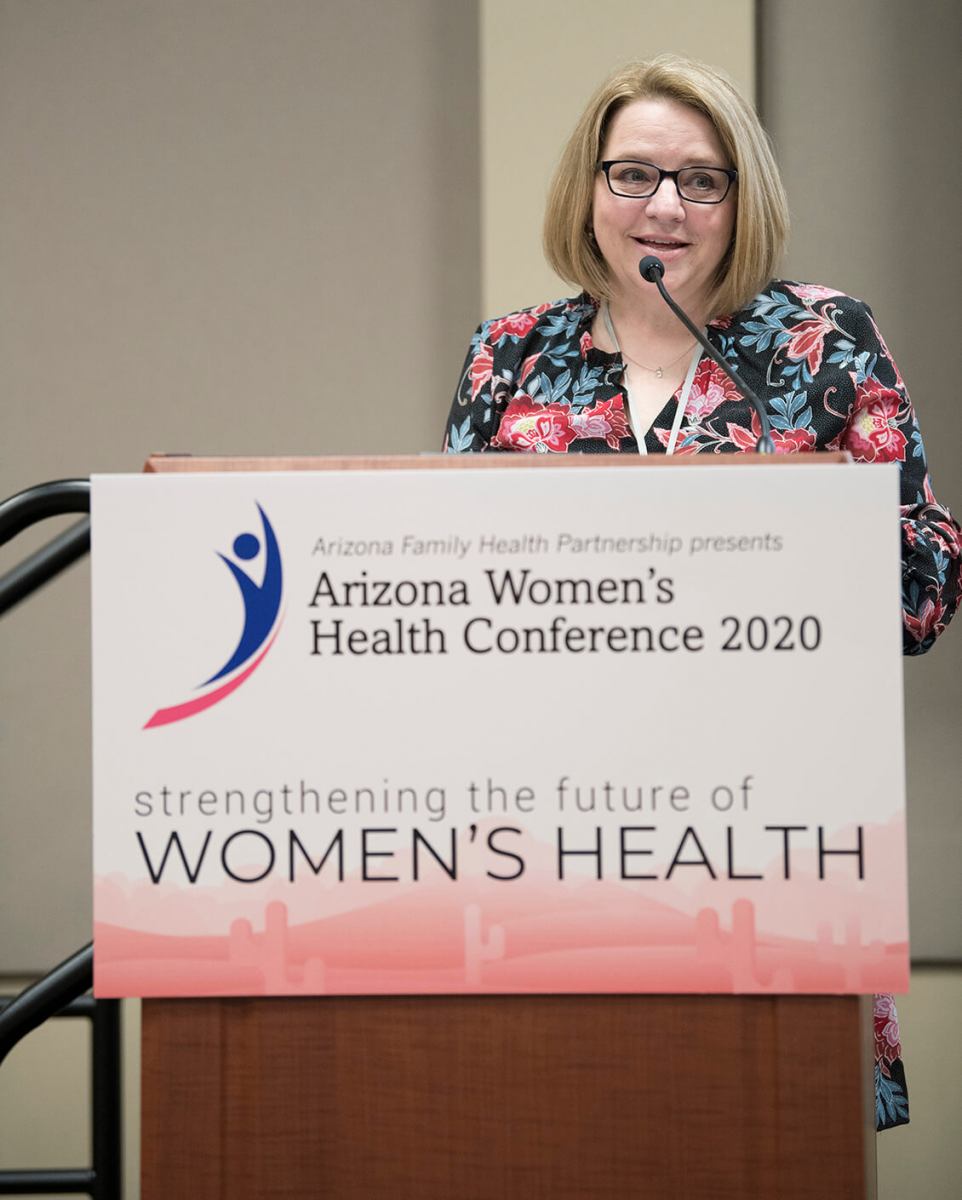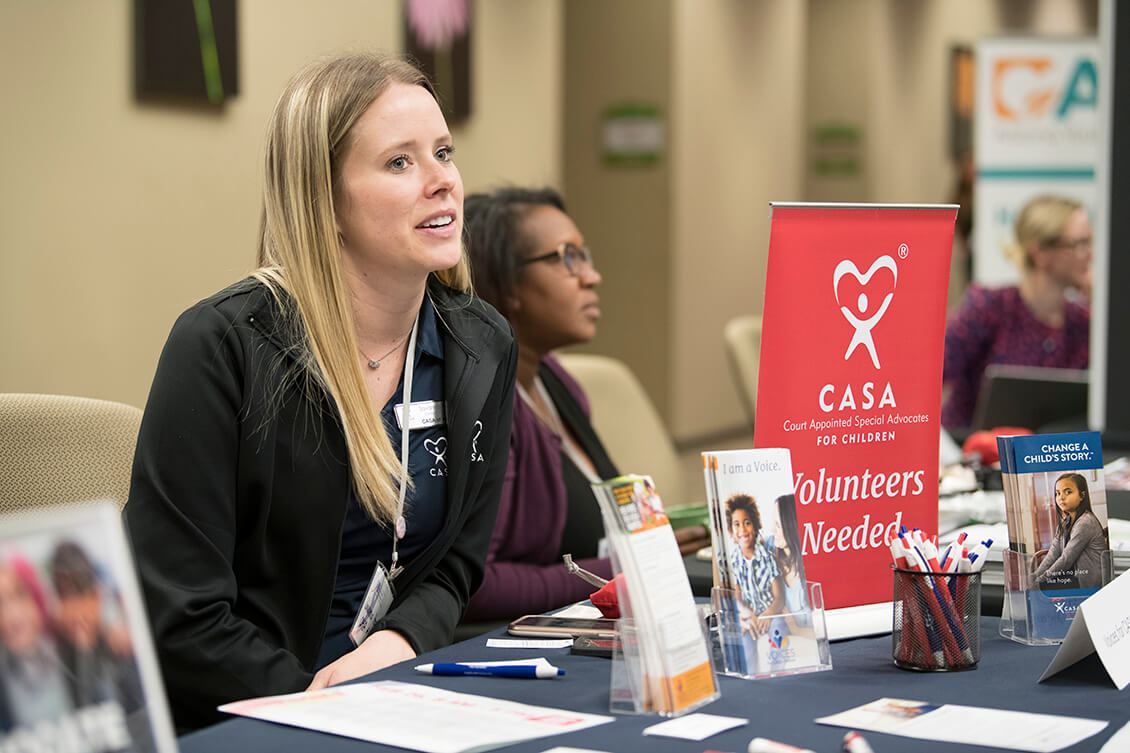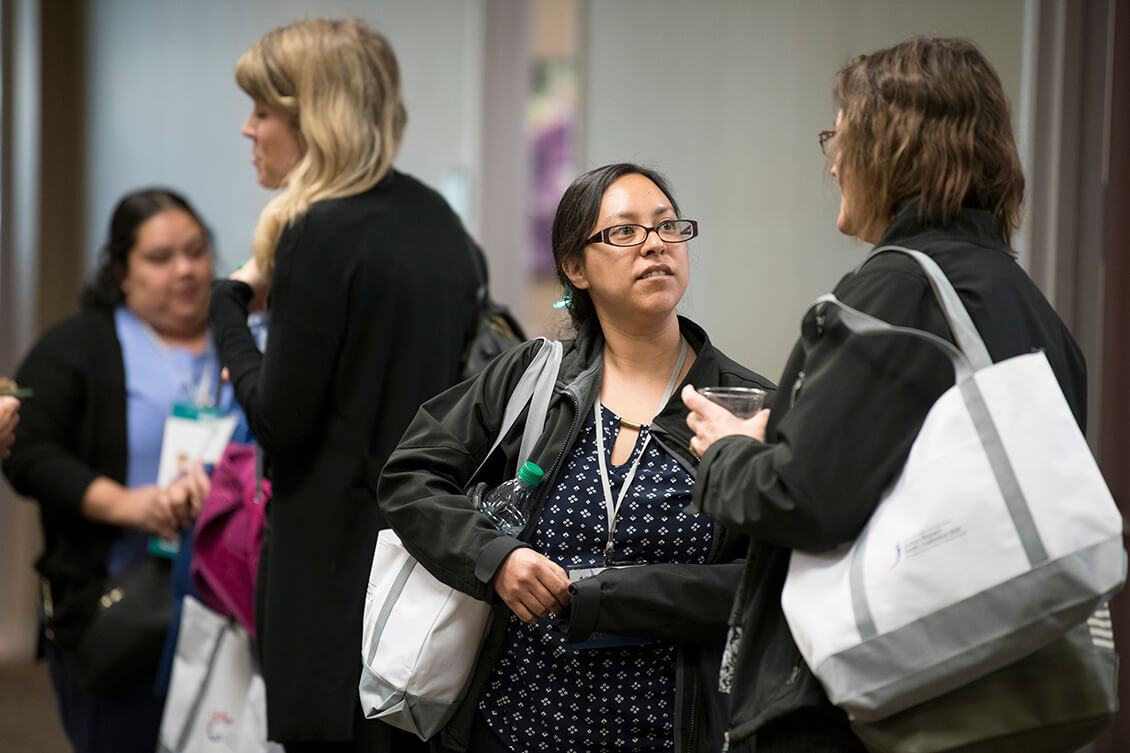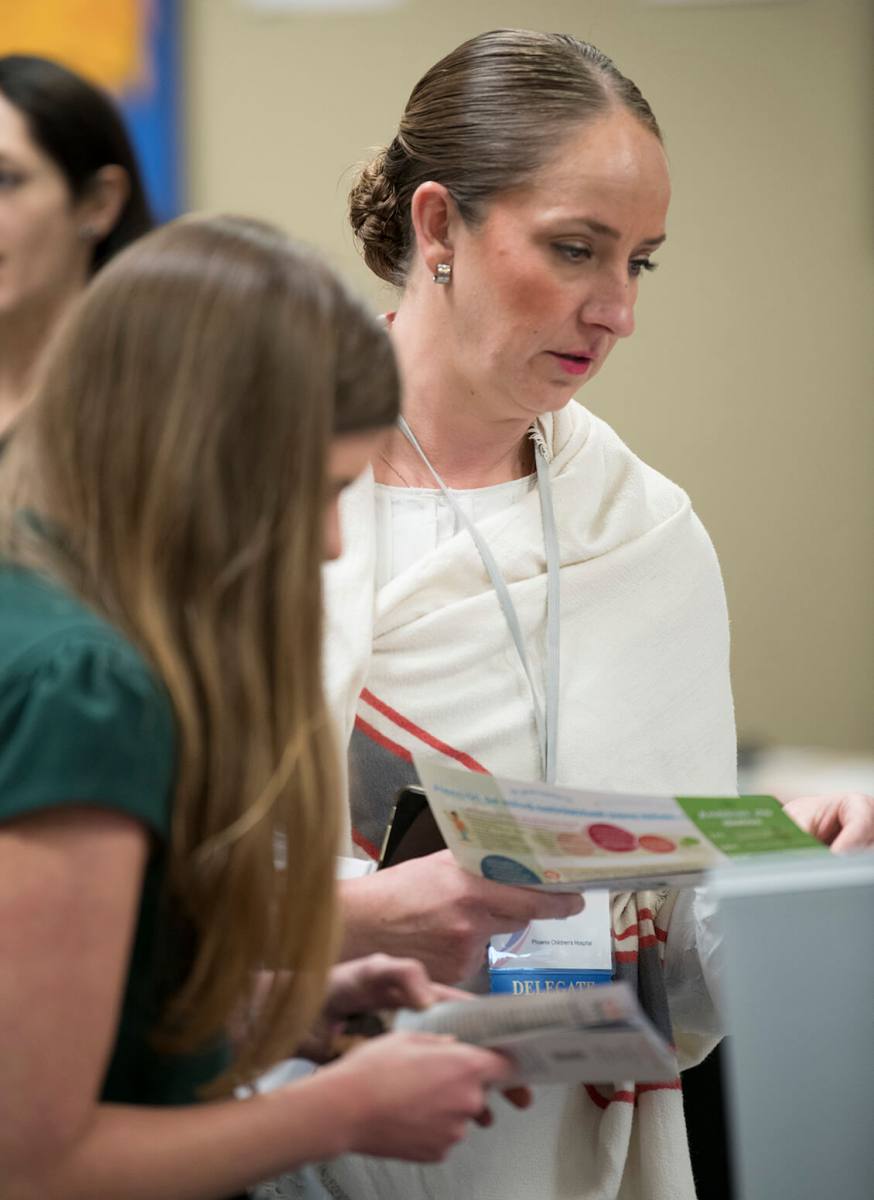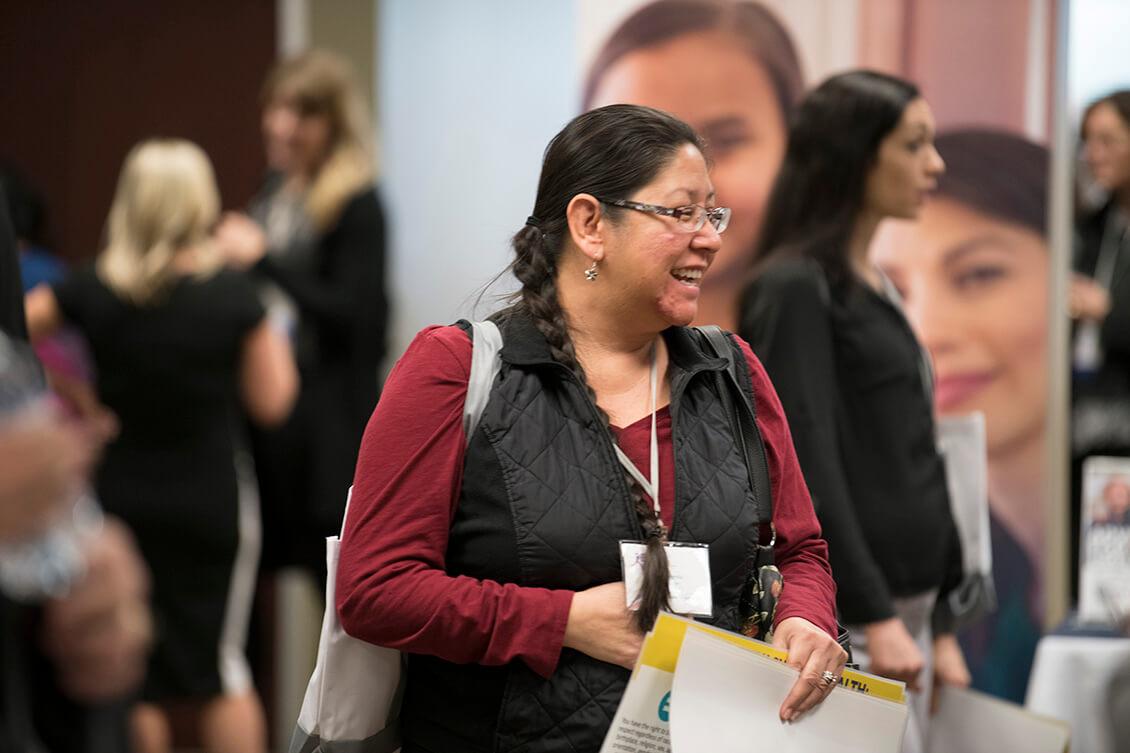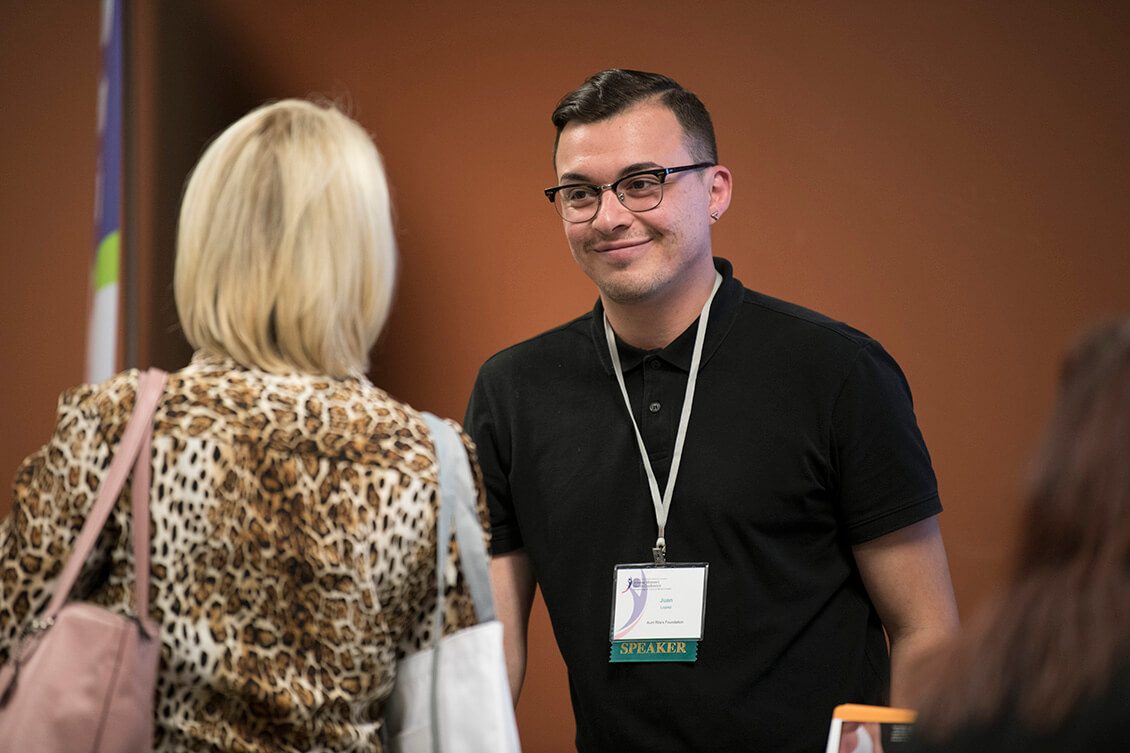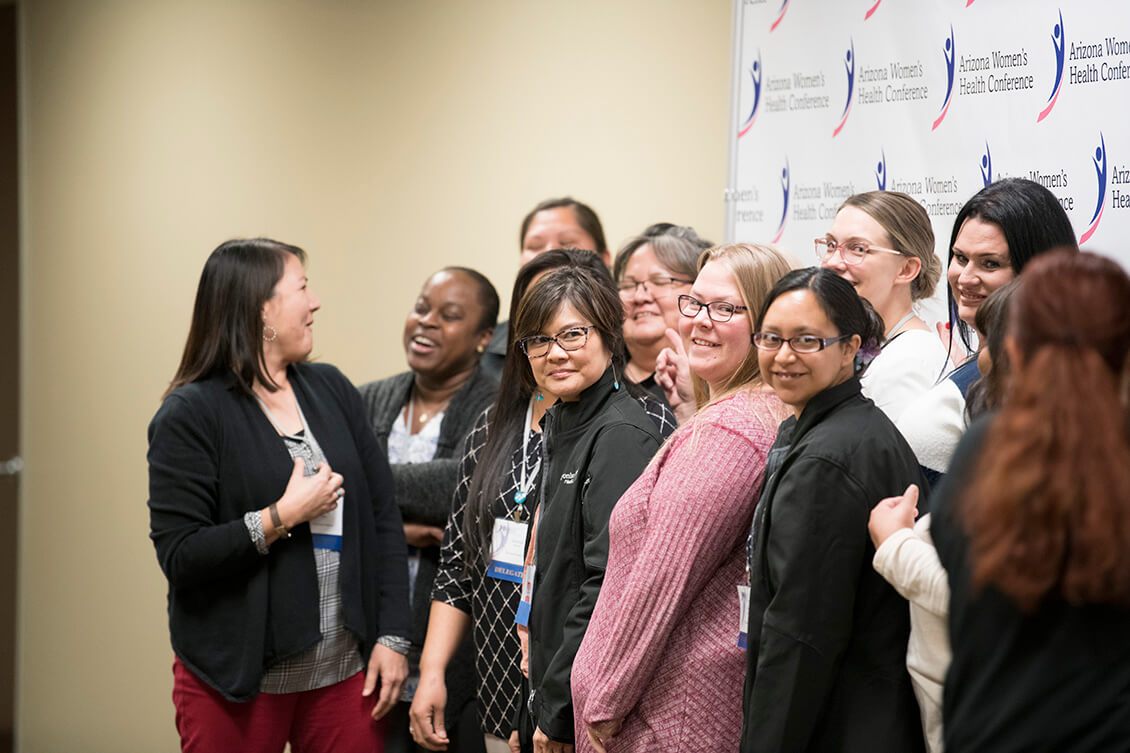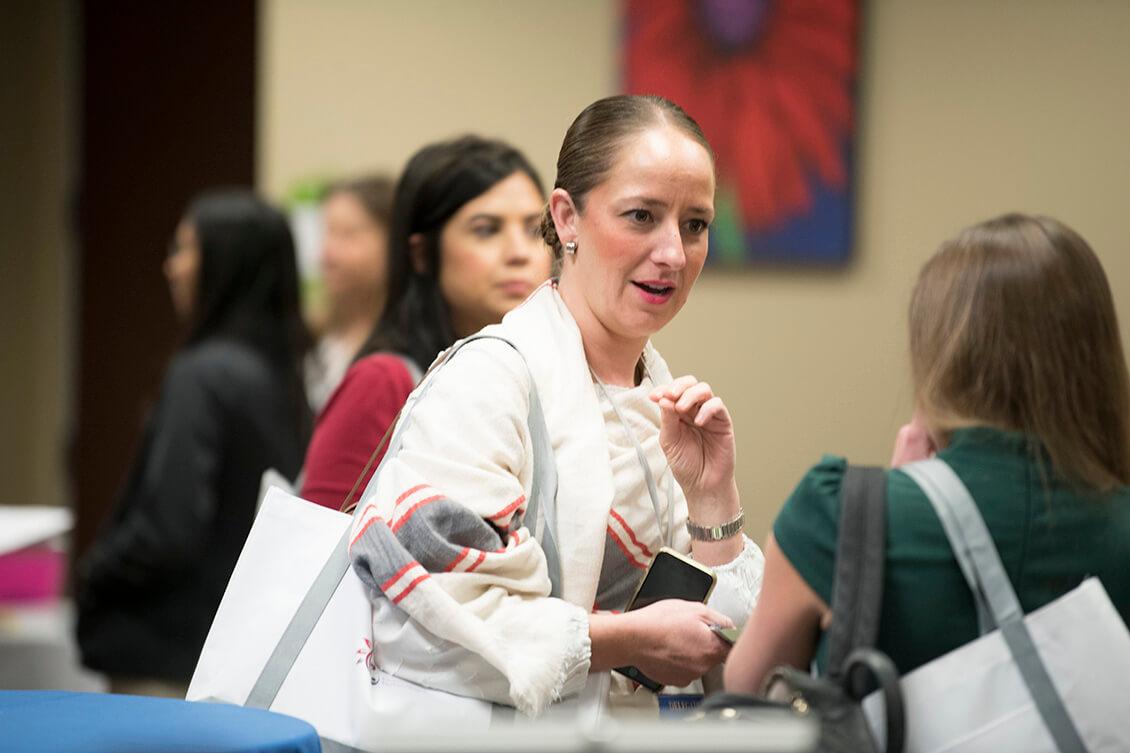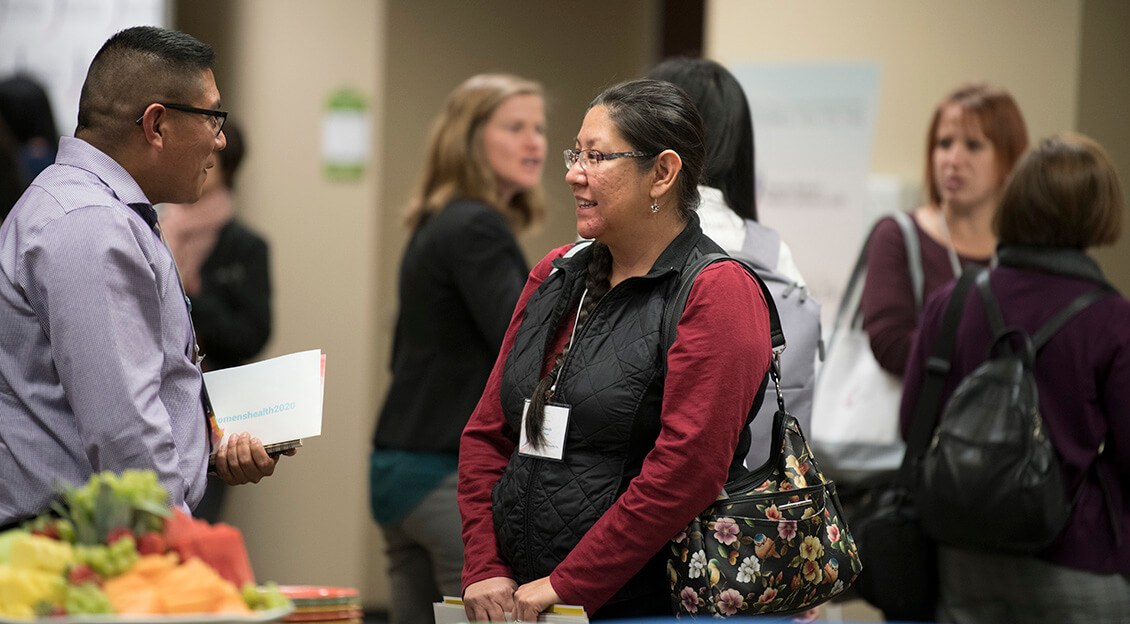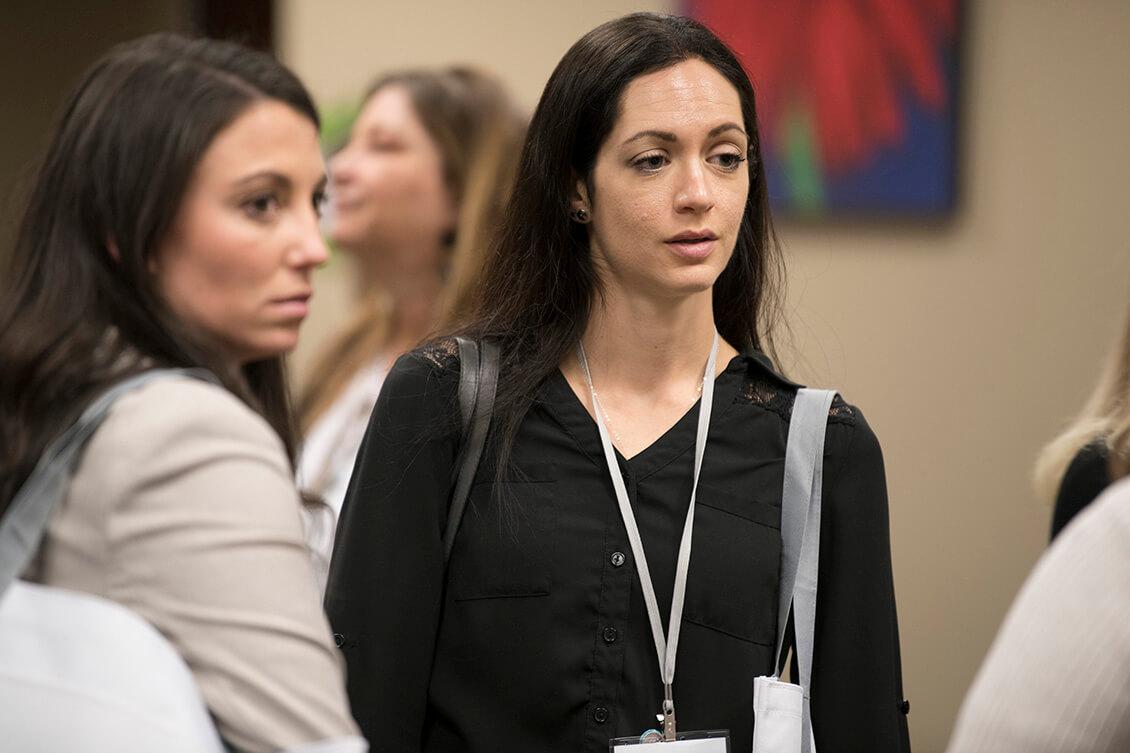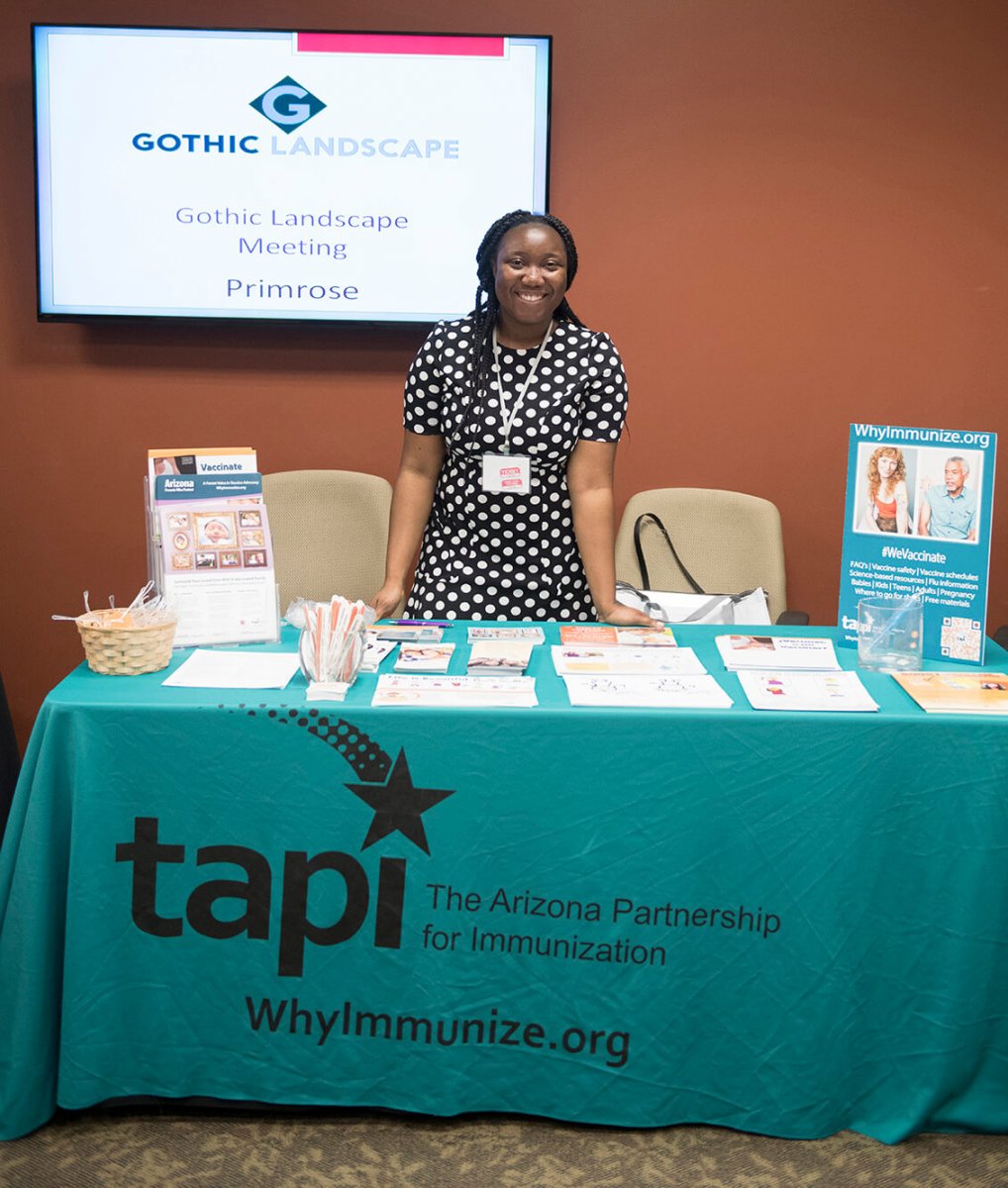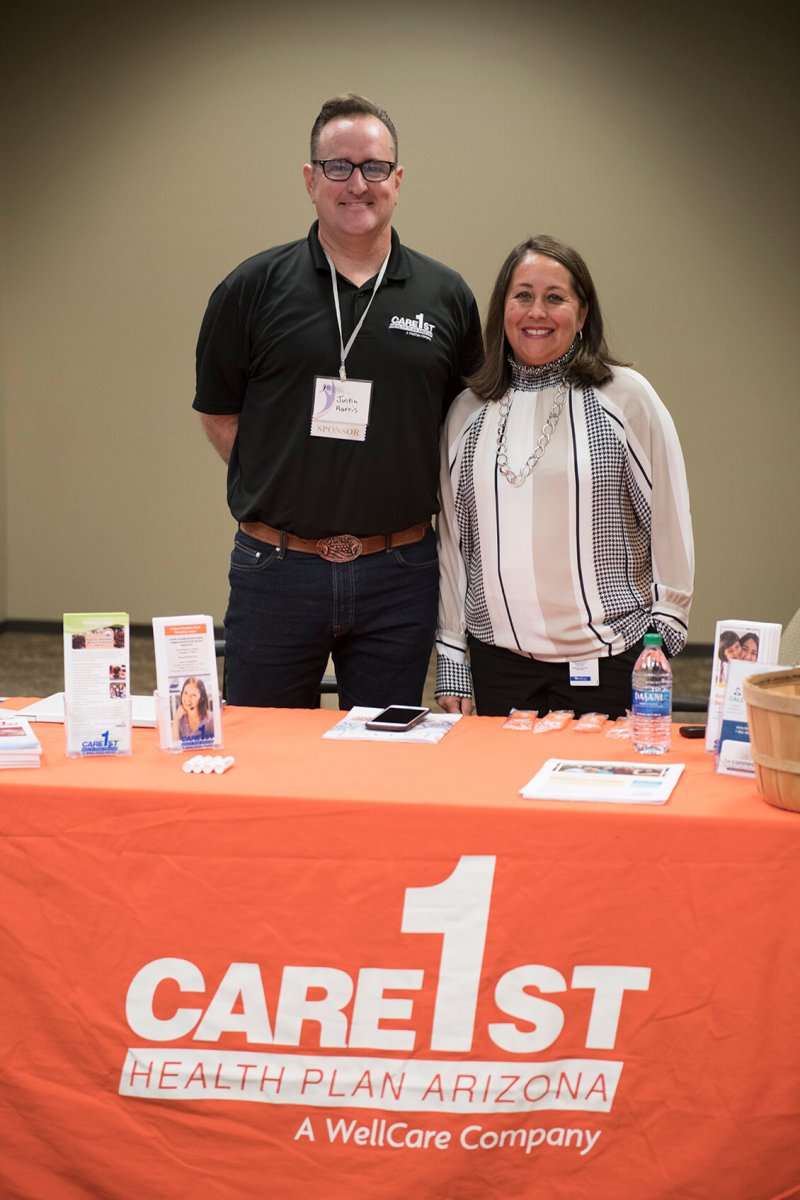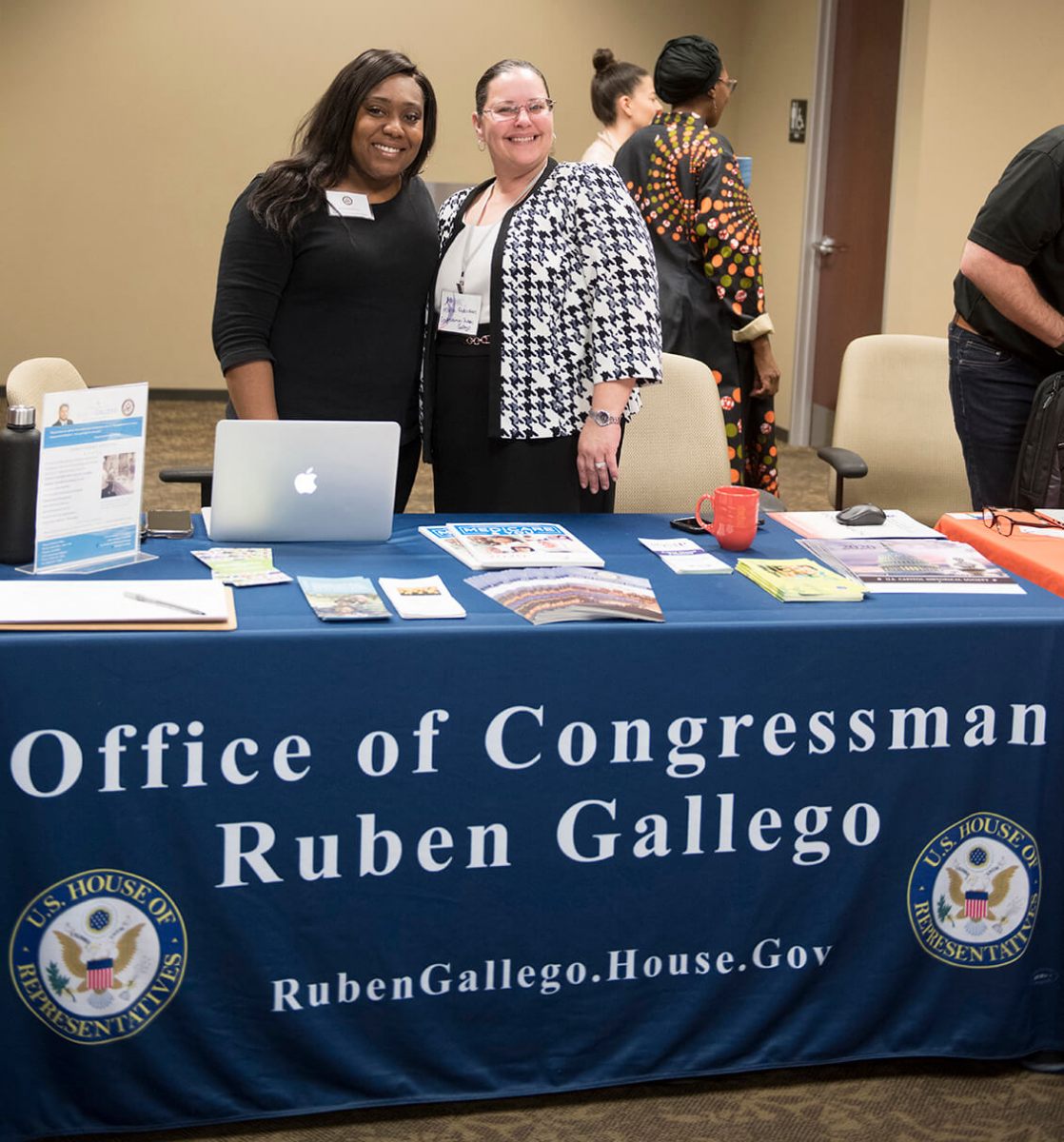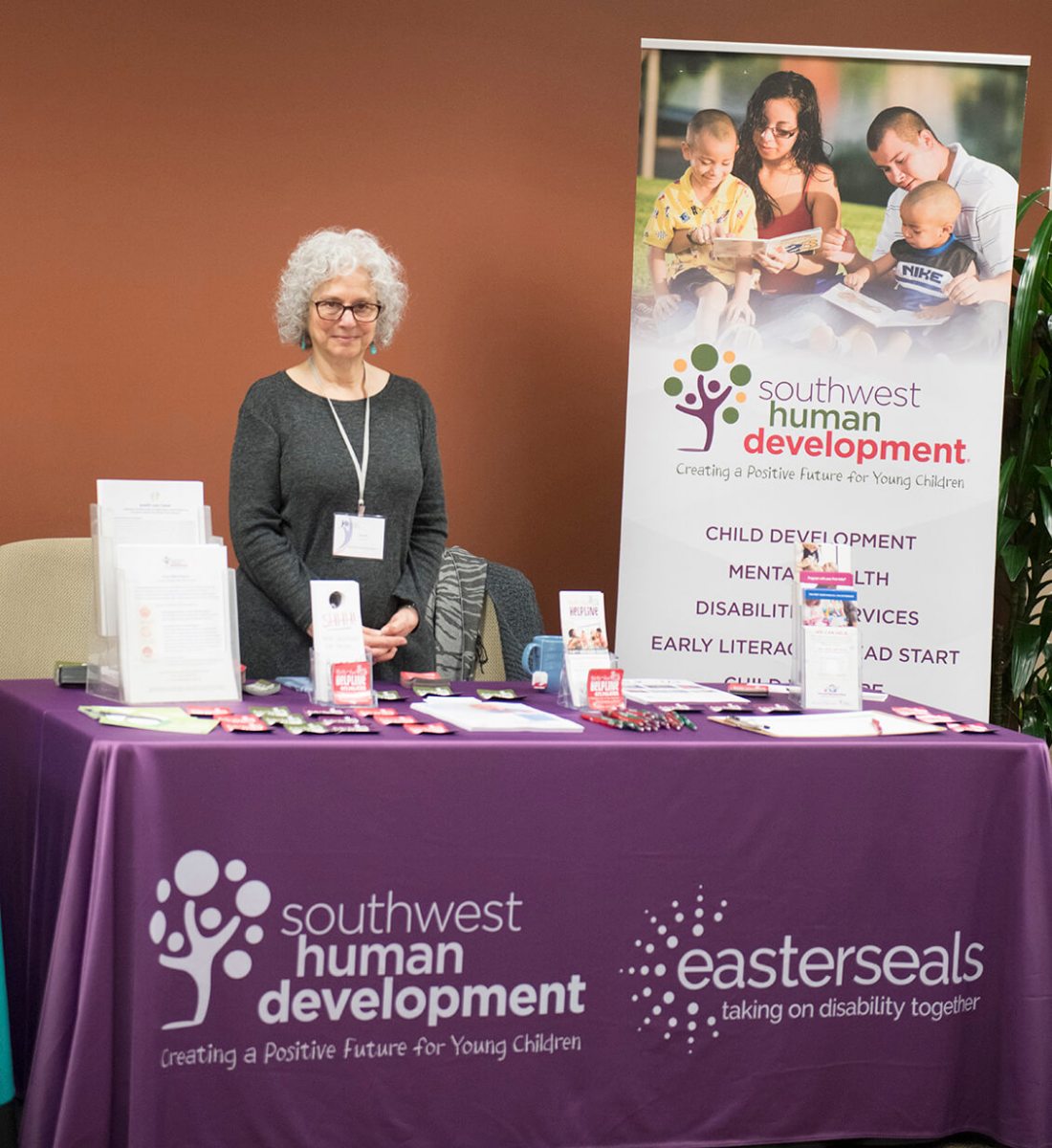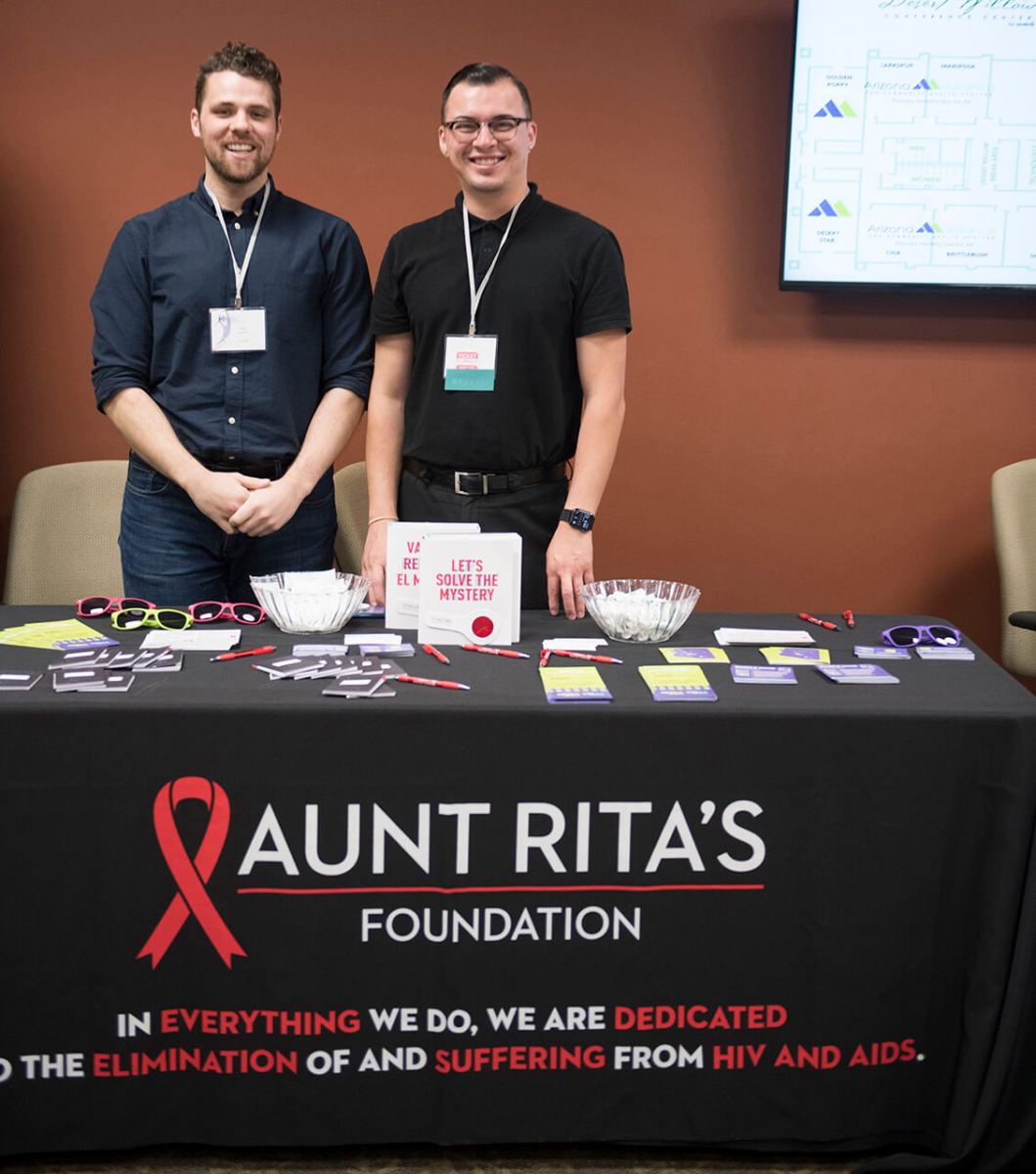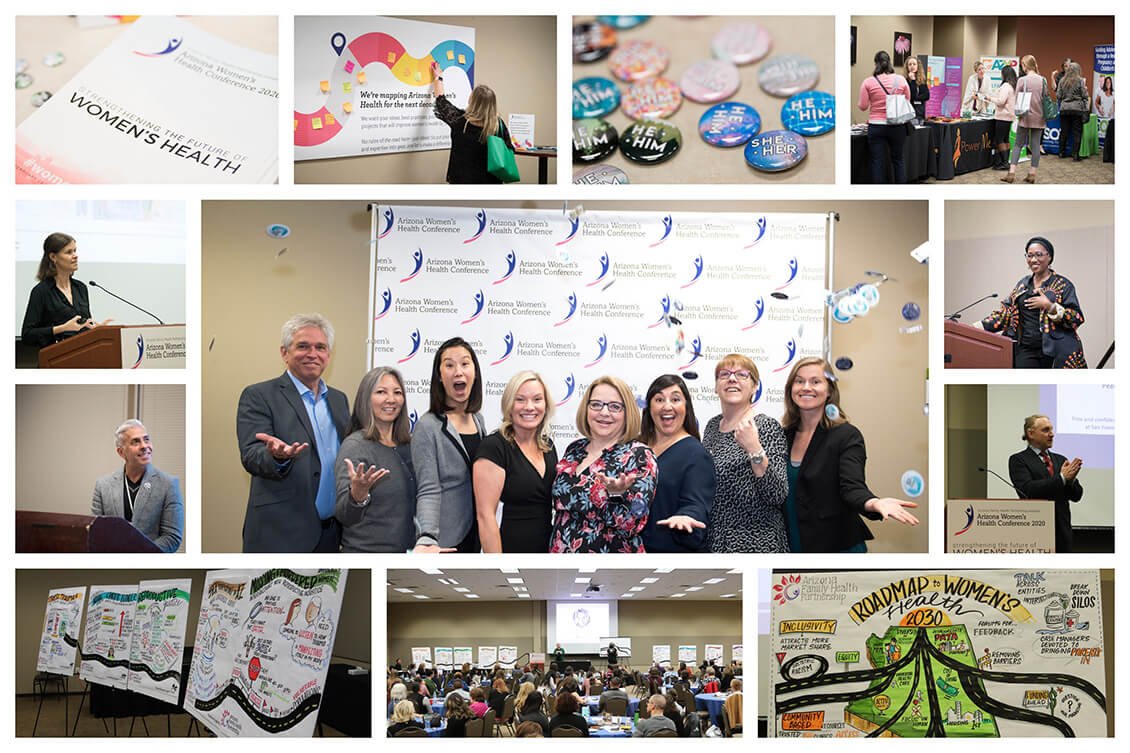

WOMEN'S HEALTH CONFERENCE 2020
The Future of Growth
In February 2020, Affirm held the first Arizona Women’s Health Conference with two days of plenaries, panels, and breakout sessions on more than 30 critical subjects that impact women and those who care for them.
The Conference was well received by over 200 attendees and featured national and local experts including Dr. Sharon Thompson, Dr. Veenod Chulani, Dr. Christine Dehlendorf, Dr. Michael Policar, and Dr. Mishka Terplan. Sessions addressed ages ranging from adolescents to mature adults and included themes around reproductive justice, consent and confidentiality, trauma and resilience, advocacy, and diversity.
The conference culminated in the sharing of best practices, policies, programs, and projects that will improve women’s health by 2030.

2021 VIRTUAL ROADSHOWS
Each week in February 2021, we held virtual Roadshows wherein women facilitated presentations and discussions to continue the conversation around improving women's health by 2030. Recordings are linked below:
How does childhood stress affect us as adults?
Bringing LGBTQ+ Cultural Competency Into Your Clinic/Office
BIPOC Birthing & Healthcare: A Community-Based Perspective
Women and “Controversial Moral Issues”: Reframing Reproductive Rights
EVENT SPEAKERS

ANGIE FIRMALINO
ANGIE FIRMALINO
Angie Firmalino holds a Bachelor of Fine Arts in Metalsmithing from Syracuse University, an Associate’s in Psychology from Syracuse University, and an Associate’s in Jewelry Design from FIT. She also studied abroad in Florence, Italy. She then worked as a bench jeweler in New York City, a goldsmith for Steven Kretchmer, and then became a freelance wax model maker after her first child was born in 1998. Due to continuing health problems caused by the medical device Essure, she no longer is able to work as a jeweler.
After being harmed by Essure, Mrs. Firmalino founded a support and advocacy group in 2011, called Essure Problems. She continues to run Essure Problems along with a strong team of women, and founded ASHES nonprofit in 2015. She and her family live in the Catskill Mountains of New York.
As President of ASHES, Angie serves as the face of the organization and runs and oversees it's functions. Often the organizer and facilitator of the group, she has strong leadership skills. Angie often attends most ASHES functions and has spoken or presented at many events.

ANNITA LUCCHESI
ANNITA LUCCHESI
Annita Lucchesi (Cheyenne) serves as Executive Director of Sovereign Bodies Institute, and in that role, continues her work as founder and caretaker of the MMIW Database. She brings years of experience in grassroots research and organizing to end violence against indigenous women and girls, and has served as an advocate and expert in work with tribal, federal, and state efforts to better address the issue of missing and murdered indigenous women. Annita is a survivor of domestic and sexual violence, as well as trafficking. Her research specialties include indigenous methodologies, arts-based methods, critical cartography, and data sovereignty. She holds a BA in Geography from the University of California, Berkeley and a MA in American Studies from Washington State University, and is currently pursuing a PhD in Geography with a minor in Gender & Women's Studies from the University of Arizona.

ARYN FISHER
ARYN FISHER
Aryn Fisher (Northern Cheyenne) serves as Assistant Research Coordinator for the Sovereign Bodies Institute. She holds a BS in Community Health from Montana State University. She has served as a community-based tribal researcher and local evaluator on public health projects with Indigenous communities in Montana. Aryn has recently returned from New Zealand where she worked as an Indigenous exchange teacher in a New Zealand Maori high school.

ASHLEY HOOBER
ASHLEY HOOBER
Ashley Hoober has been working in the IRC Phoenix office for 8 years, and is the Adult Education Supervisor. She has been part of the of the Adult Education Department for the last 5 years. Ashley is a strong advocate to welcome and build rapport with refugees and empower them with knowledge and skills to smoothly adjust to life in the United States. For the last 2 years, she had piloted and developed a monthly sexual health workshop for adults, is developing sexual health workshops for youth, and integrating sexual health education into many programs at IRC Phoenix. She has shown leadership in improving program effectiveness to ensure client feedback to influence programs, and is innovative and enthusiastic in delivering continuing education curriculum.

BOBBI SUDBERRY
BOBBI SUDBERRY
Bobbi Sudberry, like so many others has faced trials and tribulations beyond what she ever imagined; born into a domestically abusive environment, the murder of a child, suicide, the sudden death of her sister and breast cancer. Despite all this, she still wears several hats and is now an accomplished Author, Co-founded and Manages a local non profit, Kaity’s Way, Positive Influencer (Bookin’ It With Bobbi), wife, mother of five and grandmother of nine.
Through Kaity’s Way, public speaking, and now her book, “C is for Conquer” and Positive Influencing she has the platform to share the lessons she has learned. It is Bobbi’s hope that she will inspire, encourage and empower women to understand the importance of taking care of themselves. This message of honoring herself is what has moved Bobbi from just surviving to thriving over the past several years. She approaches each day with love and joy in her heart and most of all she is thankful to be alive to fulfill her purpose in life. Bobbi believes if her story can help just one person, she has succeeded.

CLAIRE LOUGE
CLAIRE LOUGE
Claire Louge is the Executive Director of Prevent Child Abuse Arizona, a statewide non-profit organization dedicated to preventing child maltreatment before it happens, and helping those who have experienced childhood trauma build resilience to its effects.
Claire obtained her Bachelor’s degree in Human Development from Cornell University and her Masters of Education in Human Relations from Northern Arizona University. Claire is also a Certified Trauma Support Specialist through the Arizona Trauma Institute, certified by the National Alliance of Children's Trust and Prevention Funds to teach the Strengthening Families™ Protective Factors Framework, and an authorized Stewards of Children® facilitator. She is a graduate of the American Express Leadership Academy at the ASU Lodestar Center and is also an AmeriCorps VISTA alumnus. Claire regularly offers workshops and keynote addresses at conferences throughout Arizona.
Download Graphic Download Presentation Download Presentation

CYMONE GATES
CYMONE GATES, MPH
Cymone Gates, MPH is the STD Data Manager for the Arizona Department of Health Services' STD Control Program. She received both her undergraduate and graduate degrees from Emory University. Her professional expertise is in public health informatics and infectious disease surveillance.

DANA KENNEDY
DANA KENNEDY
Dana Marie Kennedy is the State Director for AARP Arizona with more than 25 years as a leading advocate for working families, retirees, and women at the local, state and national levels.
As State Director, Kennedy is making AARP the go-to organization for Arizonans who are 50 plus. AARP is championing issues that matter most to families such as healthcare, employment security and retirement planning and preventing fraud and abuse. Her focus includes helping people age in place-- living independently in their homes for as long as possible, family Caregiving, helping to keep energy costs affordable. Partnering with our aging community on issues important to older Arizonans and creating collaboration and innovation to solve difficult problems with limited resources is a key priority.
Kennedy holds a Bachelor’s Degree in Social Work and a Certificate in Gerontology from California State University Long Beach and a Master’s in Social Work from Boston University where she also acquired Certificates in Human Service Management and Gerontology.
Kennedy is a graduate of the Women's Campaign School at Yale (Class of 2007) and Valley Leadership (Class 34) and a Flynn Brown Fellow.
Kennedy is an endurance athlete and spends her free time training for triathlons and marathons. She has completed 10 marathons and numerous triathlons including Ironman Arizona in Tempe in 2013, Kona in 2015 and Santa Rosa in 2017.

DOMINIQUE ROE SEPOWITZ
DOMINIQUE ROE SEPOWITZ
Dominique Roe-Sepowitz, MSW, Ph.D. is an Associate Professor in the Arizona State University School of Social Work and the founder and Director of the Office of the Sex Trafficking Intervention Research (ASU STIR). Dominique has developed research, clinical interventions, and training curriculum for the past 15 years. She has created numerous training tools specifically for sex trafficking including a school-based web-based learning module (projectstarfish.education), a statewide resource website including training materials and resources (sextraffickinghelp.com), six national webinars for the NCJRS program, nine training brochures for special populations regarding sex trafficking, a standardized 3-hour sex trafficking 101 that has been provided to over 10,000 attendees since 2014, and a statewide train the trainer for Human Trafficking 101 in partnership with the Arizona Governor’s Office. Dominique is the Clinical Director for the first HUD funded permanent supportive housing program for sex trafficked women and their children in Phoenix, AZ entitled Phoenix Starfish House.
Dominique is a local, national and international expert on human trafficking and was selected to be a speaker by the U.S. Department of State. Dominique has been selected to attend expert work groups by the U.N.U., SAMHSA, OVC, HHS, and DOJ. Dominique has published 37 peer review articles regarding trauma and human trafficking. Dominique has received and managed $2.4 million in grants and contracts. Dominique is the PI on a $1.2 million 5-year grant from HHS Children’s Bureau for training and increasing identification and services to child victims of exploitation as well as numerous federal sub-grants.

DR. AGGIE YELLOWHORSE
DR. AGGIE YELLOWHORSE
Dr. Aggie Yellow Horse is an Assistant Professor in Asian and Pacific American Studies at Arizona State University (ASU). She is trained as a medical sociologist and demographer; her research focuses on estimating the neighborhood effects on immigrant health disparities with special emphasis on conceptual and measurement issues in neighborhood research. She has published on immigrant health and AAPI health in top demography and public health journals. Her research was funded through NICHD.

DR. DEAN COONROD
DR. DEAN COONROD, MD, MPH
Dr. Coonrod is Chair of the Department of Obstetrics and Gynecology at Valleywise Health and District Medical Group (DMG) in Phoenix since 2005. He is Professor & Chair at Creighton University School of Medicine Phoenix Regional Campus and Professor of Ob/Gyn at the University of Arizona College of Medicine Phoenix. Earning his M.D. and M.P.H. in 1990, he completed his residency in ob/gyn at the Phoenix Integrated Residency in Obstetrics and Gynecology (PIROG) in 1994. He has served on the faculty at MIHS since 1994.
Dr Coonrod actively practices as a clinician, researcher, educator, and advocate to victims of domestic violence (DV) through his community health work. Dr. Coonrod is also interested in preconception care; he created and leads an internatal clinic which provides care for women between pregnancies who have experienced an adverse pregnancy outcome. Recent work has focused on maternal mortality and morbidity at the hospital, state, national and global level including the recent founding of a Global Women’s Health Fellowship. He has held dozens of federal, state and local grants supporting women’s health and research in obstetrics and gynecology.

DR. CHRISTINE DEHLENDORF
DR. CHRISTINE DEHLENDORF
Dr. Dehlendorf is a family physician with advanced training in family planning and a Master’s Degree in Clinical Research. As the director of the Person-Centered Reproductive Health Program, she is a national thought leader in contraceptive counseling and health equity in reproductive health care. Dr. Dehlendorf’ s research portfolio includes formative research to better understand people’s contraceptive experiences, social communication about contraception, and disparities in contraceptive use and counseling, which informs the development, evaluation and dissemination of interventions and clinical trainings aimed at meeting people’s reproductive health needs. Mostly recently, she developed a person-centered contraceptive care framework, aligned with the humans rights perspective and led a study developing and validating a Patient-Reported Outcome Performance Measure to understand patients’ experiences of contraceptive counseling and inform improvements to counseling practices. She has also conducted studies examining the relationship of patient race/ethnicity and socioeconomic status with variation in health care providers’ recommendations for contraceptive methods and with the quality of contraceptive counseling.

DR. KAREN LEONG
DR. KAREN LEONG
Dr. Karen Leong is an Associate Professor in Asian Pacific American Studies at ASU. She is trained in History and Asian American Studies. She has expertise in women’s studies, feminist theory, intersectionality, archival research, historical analysis, and narrative analysis. She has worked with Asian Pacific American community organizations to collect oral histories and conduct focus groups about community concerns, and she has participated in educational outreach to Asian Pacific Islander American youth in Maricopa County and co-coordinated an oral history project with the Japanese American Citizens League (JACL) Arizona Chapter that was funded by an Arizona Humanities grant.

DR. KATHY NAKAGAWA
DR. KATHY NAKAGAWA
Dr. Kathy Nakagawa is an Associate Professor in Asian Pacific American Studies at ASU. She is trained in Human Development and Social Policy and has published on parent involvement, education and community empowerment and worked with local AAPI organizations on issues of health disparities. She also serves as a board member for a number of local non-profit organizations, including Asian Pacific Community in Action and Affirm.

DR. MONICA CASPER
DR. MONICA CASPER
Monica J. Casper, Ph.D. is Associate Dean for Faculty Affairs and Inclusion in the College of Social and Behavioral Sciences and Professor of Gender and Women’s Studies and Public Health at the University of Arizona. She is also an affiliated faculty member in the School of Sociology and in Africana Studies, and is co-founder of the UA Consortium on Gender-Based Violence. She has published several books, including the award-winning The Making of the Unborn Patient: A Social Anatomy of Fetal Surgery; The Body: Social and Cultural Dissections; and Critical Trauma Studies: Understanding Violence, Conflict, and Memory in Everyday Life. Her current research focuses on biopolitics of infant mortality and maternal health; traumatic brain injury; and global politics of elephant trauma and rescue. She is founding co-editor of the successful NYU Press book series “Biopolitics: Medicine, Technoscience, and Health in the 21st Century” and founding co-editor of the newly launched UA Press Book Series, “The Feminist Wire Books: Connecting Feminisms, Race, and Social Justice,” as well as a managing editor of The Feminist Wire and publisher of TRIVIA: Voices of Feminism. She is a prolific creative writer with publications in numerous literary journals. More information can be found at www.monicajcasper.com.

DR. MICHAEL S. POLICAR
DR. MICHAEL S. POLICAR, MD, MPH
Michael Policar, MD, MPH, is Professor Emeritus of Obstetrics, Gynecology, and Reproductive Sciences at the University of California, San Francisco, School of Medicine. Since 2015, he has been the Clinical Fellow for the National Family Planning and Reproductive Health Association (NFPRHA), providing advice on clinical issues and reproductive health policy. He also is an advisor to the CA State Office of Family Planning on clinical issues related to the Family PACT Program, the state’s family planning program. He recently retired from clinical practice after a 34 year career as a clinician-educator of ObGyn and primary care residents at the San Francisco General Hospital. From 2005 through 2014, he was Medical Director of UCSF Program Support and Evaluation for the Family PACT Program. From 1999 through 2005, he was Vice President of Medical Affairs and Chief Medical Officer of the NorthBay Healthcare System in Fairfield, California, and in the preceding five years, served as Medical Director of the Partnership HealthPlan of California, also based in Fairfield, California. He is former Vice President for Medical Affairs of the Planned Parenthood Federation of America, Inc. a position that he held from 1992 through 1994. Between 1983 and 1992, he concurrently served as Medical Director of the Women's Health Center at the San Francisco General Hospital and as Medical Director of Planned Parenthood of Alameda/San Francisco.
Dr. Policar received his MD degree at the University of California, San Francisco, School of Medicine and completed his residency in Obstetrics and Gynecology at the UCLA School of Medicine. Subsequently he received a Master of Public Health degree in Health Services Management from UCLA School of Public Health.
Dr. Policar is a widely known speaker with an interest in health delivery systems and women’s health issues, including family planning, health screening, menopause, and female genital tract infections, and genital skin conditions. He is a senior author of the textbook Contraceptive Technology (16th-21st editions). He has served on expert advisory panels of the Centers for Disease Control that resulted in the publication of the CDC Medical Eligibility Criteria (MEC) for Contraceptive Use (2016), the CDC Selected Practice Recommendations (SPR) for Contraceptive Use (2016), and Providing Quality Family Planning Services: Recommendations of CDC and the U.S. Office of Population Affairs (2014). Previously, he was a member of the Quality/Utilization Advisory Committee of the Partnership HealthPlan of California and the HealthNet California Commercial and Medicare QI/UM Committee. He is an appointed member of the California Breast and Cervical Cancer Advisory Council. He also has received numerous awards for ObGyn resident teaching, including a CREOG National Faculty Award in 2011. Dr. Policar is active many professional societies, including the Association of Reproductive Health Professionals, the North American Menopause Society, and American Society for Colposcopy and Cervical Pathology.

DR. REBECCA SUNENSHINE
DR. REBECCA SUNENSHINE
Dr. Rebecca Sunenshine is the Medical Director for Disease Control at Maricopa County Health Department and a Captain in the US Public Health Service. As a CDC Career Epidemiology Field Officer assigned to Arizona since July 2006, she has served at the Arizona Department of Health Services for 4 years and Maricopa County Department of Public Health since 2010. She is trained in internal medicine and infectious diseases at Oregon Health &Science University, and completed her CDC Epidemic Intelligence Service Fellowship in 2006 with the Division of Healthcare Quality Promotion. Her research and publications focus on infectious disease epidemiology, coccidioidomycosis, infection control, and multidrug resistant organisms.

DR. MISHKA TERPLAN
DR. MISHKA TERPLAN MD MPH FACOG DFASAM
Mishka Terplan is board certified in both obstetrics and gynecology and in addiction medicine. His primary clinical, research and advocacy interests lie along the intersections of reproductive and behavioral health. He is Senior Physician Research Scientist at Friends Research Institute and adjunct faculty at the University of California, San Francisco where he is a Substance Use Warmline clinician for the Clinical Consultation Center. He is also the Addiction Medicine Consultant for Virginia Medicaid and a consultant for the National Center on Substance Abuse and Child Welfare. Dr. Terplan has active grant funding and has published over 100 peer-reviewed articles with emphasis on health disparities, stigma, and access to treatment. He has spoken at local high schools and before the United States Congress and has participated in expert panels at CDC, SAMHSA, ONDCP, OWH, FDA and NIH primarily on issues related to gender and addiction.

DR. SHARON THOMPSON
DR. SHARON THOMPSON
Dr. Thompson is a Harvard trained, board-certified practicing physician, CEO, medical columnist, TV personality and expert in helping women make meaningful changes in their lives and communities. She has been influencing and empowering audiences around the world for more than a decade. During this time, she has helped women solve problems one at a time while inspiring and addressing life-changing issues on a larger scale. She has been a strong resource and advocate for her local community and is excited to expand nationwide.
Dr. Thompson earned a B.A. in Biology from Vassar College, an M.P.H in women and child health from the University of California at Berkeley and an M.D. from Mount Sinai School of Medicine in New York City. She completed her training in obstetrics and gynecology at the Harvard University affiliated Brigham and Women’s and Massachusetts General Hospital residency program.
Dr. Thompson is certified in by the American Board of Obstetrics and Gynecology and is a Clinical Assistant Professor of Obstetrics and Gynecology at the University of Arizona School of Medicine-Phoenix. She has designed and delivered hundreds of presentations for organizations including the American Medical Women's Association, the American Humanist Association and the City of Phoenix.

HALEY COLES
HALEY COLES
Haley Coles is the co-founder and Executive Director of Sonoran Prevention Works. Born and raised in Arizona, she is dedicated to making systems-level changes to ensure health equity for Arizonans impacted by substance use, sex work, HIV, hepatitis C, and incarceration. Her work with has been recognized by Governor Doug Ducey of Arizona and Governor Jay Inslee of Washington. She is a Robert Wood Johnson Foundation Culture of Health Leaders Alumna.

HOLLY ENNIS
HOLLY ENNIS
Holly Kelly Ennis has been practicing law since 1987. She was born in Jacksonville, Florida and graduated from the University of Florida School of Law and earned her JD degree in 1986. While pursing her Law Degree she was on the Moot Court Team, won Best Brief Award and was the attorney general for the University of Florida Honor Court for the Academic year 1985-86. She received her Undergraduate Degree from the University of Florida School of Journalism in 1982.
Since 2000 Holly has been representing Plaintiffs who have been victims against Pharmaceutical, Medical Device and Product Manufacturers. Holly focuses her practice on representing Females nationwide who have been the victims of many of the Mass Tort Cases in the Country. She is currently focusing her practice on the fight to assist Essure Victims in their fight to have The Medical Device Safety Act enacted into law and getting E-Sisters the compensation they deserve. Holly has been assisting the E-Sisters Lobbying in Congress and the FDA. She has written extensively on the subject on her quest to prevent women in the future being harmed by Essure. As a member at large, she assists the officers and other board members in a variety of capacities to further the goals and mission statement of ASHES.

JUAN LOPEZ
JUAN LOPEZ
Juan Lopez joined Aunt Rita’s Foundation as Director of Programs in late 2019. Juan has a great passion for community outreach and ensuring youth and minorities are able to get the resources and education they need around HIV/AIDS. Juan oversees the testing programs with Aunt Rita’s. The two programs include the At Home HIV test kits that are delivered in the entire state of Arizona at no cost. Also, Get Tested AZ, which is a partnership with Sonora Quest Labs and the Albertsons/Safeway Pharmacies providing free HIV tests throughout the entire state of Arizona. It increased free HIV testing by over 100 locations and is helping connect people to care and prevention in rural areas.

KAITLYN OELKERS
KAITLYN OELKERS
Kaitlyn Oelkers is a 3rd year dual MD/MPH student at the University of Arizona College of Medicine-Phoenix. She studied biology and global health, culture, and society in her Undergraduate degree at Emory University. As an Arizona native, she was excited to return to the valley for medical school. She plans to apply for obstetrics and gynecology residency programs this fall to continue to pursue her passion for women’s health.

KAREN MARTINOT
KAREN MARTINOT
Karen Martinot is a registered nurse and international board certified lactation consultant who has worked in women's health for over 20 years. She has her BSN from Oregon Health Sciences University and is currently in her final term at Arizona State University to become a doctorally prepared Women's Health Nurse Practitioner. It is her goal to empower women with health care guidance that values a person's lived experience, particularly with the intimate topics of breastfeeding and family planning.

KAT SABINE
KAT SABINE
Kat Sabine was the Executive Director for a statewide affiliate of a national non-profit that addresses women’s reproductive healthcare access as well as managing a women’s reproductive healthcare clinic. She is currently an Adjunct Professor of Women’s Studies at Estrella Mountain of the Maricopa County Community College. She earned a Master’s from the University of Arizona researching reproductive healthcare law and the movements impact on Arizona women. She has been a reproductive healthcare & justice activist for 30 years in addition to volunteering with organizations supporting the well-being of women and children. For 20 years, she and her husband have been on-and-off therapeutic-level foster parents. When Kat is not chasing her boys, she is busy during March Madness cheering on her hometown Wildcats, writing book reviews, or making improvements on her central Phoenix mid-century home.

LAURA JIMENEZ
LAURA JIMENEZ
Laura Jiménez is the Executive Director of California Latinas for Reproductive Justice (CLRJ) based in Los Angeles, California. She was raised in Santa Barbara, California, and since then, has made her way across the country and back. After obtaining a B.A. in Ethnic Studies from UC San Diego, Laura began her career with the National Latina Health Organization in Oakland, California where she led a girls mentorship program and initiated a collaboration between the organization and UC Berkeley to offer a class entitled, “Redefining Latina Health: Body, Mind and Spirit”, as well as an Intergenerational Conference on Latinas, Sex and Sexuality.
Laura completed her Master’s degree in Ethnic Studies at San Francisco State University and then travelled to New York City where she was charged with establishing the same college course and conference at Hunter College. While in New York, she started a family and began working as the Development Officer with the Dominican Women’s Development Center in Washington Heights. Throughout her work with both of these agencies, Laura worked with SisterSong Women of Color Reproductive Justice Collective as part of the Collective’s Management Circle, and then in March 2006, Laura moved to Atlanta to become SisterSong's Deputy Coordinator. During her time with SisterSong, she co-coordinated two national conferences and established the Latina Encuentro – a gathering of Latina leaders in the Southeastern Region which has as a goal relationship building and leadership development of Latinas across the South.
Since joining CLRJ, Laura has been engaged in Reproductive Justice policy advocacy, community engagement and community informed research efforts. She also serves as a mentor to the Reproductive Justice team of the Women’s Policy Institute in California. She is passionate about issues of immigration, environmental justice, and birthing and parenting, as they intersect with reproductive justice. She is proud to be a California native, but holds dear the time she spent in New York and the South learning about traditions of resistance from powerful women nationwide.

LISA SCHAMUS
LISA SCHAMUS, MPH
Ms. Schamus, a Consultant at JSI, has 30 years of public health experience addressing a wide range of topics including HIV/AIDS, family planning, STIs, and maternal and child health Ms. Schamus has worked as a researcher in academia, a technical assistance lead at JSI, the director of program and evaluation for the Title X grantee in Arizona, and the office chief for the Arizona Department of Health Services, Office of Women’s and Children’s Health. Ms. Schamus currently provides training and technical assistance for both the Family Planning National Training Center and the New York State Family Planning Training Center and is passionate about using data for quality improvement and policy development.

MADDY BYNES
MADDY BYNES
Maddy Bynes is the Public Policy & Advocacy Coordinator for Pima Council on Aging in Tucson, Arizona and the Statewide Coordinator for the Arizona Association of Area Agencies on Aging. She has nearly a decade of experience in local, state, and federal politics related to the environment and aging issues. She is active in a number of community organizations, including being on the board of the Protecting Arizona’s Family Coalition and the advisory board of the Marana Community Food Bank and Resource Center. As an advocate for older adults, Maddy has testified before various committees of the Arizona State Legislature. In 2012, she was the youngest honoree of Tucson’s 40 Under 40 award and in 2019, Maddy led Pima Council on Aging to receive two Aging Achievement Awards, for Digital Advocacy, and for Helping People + Helping Pets: A Community Collaboration. Maddy holds a Bachelors of Arts in Political Science with an American Politics Emphasis and a Bachelors of Arts in History from the University of Arizona.

DR. R. NICHOLAS STAAB
DR. R. NICHOLAS STAAB, MD, MSPH
Dr. Staab is Medical Director for the Bureau of Epidemiology and Disease Control at the Arizona Department of Health Services. He is a board-certified pediatric hospitalist and works clinically at Phoenix Children's Hospital. He has a masters of science in public health microbiology and emerging infectious diseases from George Washington University and earned his medical doctorate from the Keck School of Medicine of the University of Southern California.

REILEY REED
REILEY REED
Reiley Reed, MPH is a public health trained reproductive and sexual health researcher with a background working as a family planning clinic coordinator. She is currently a senior project manager at the Person-Centered Reproductive Health Program at the University of California, San Francisco. Reiley manages a research portfolio that includes projects in both United States and international settings, all of which are aimed towards improving understanding of people’s experiences with reproductive health care, as well as reproductive health and health care disparities. She recently managed the development of a person-centered contraceptive care framework, which aspires to inform the design of contraceptive care efforts that are aligned with human rights and patient-centeredness. Reiley currently manages a study aimed at understanding people’s experiences with and preferences for engaging with reproductive health care in Mississippi and another study to develop and validate a scale that measures patient experience of contraceptive care in Ethiopia, India and Mexico. She has also led trainings aimed at increasing person-centered contraceptive care in diverse clinical contexts.

SHANNON SCHELL
SHANNON SCHELL
Shannon Schell is the Executive Director of Protecting Arizona’s Family Coalition. She received her bachelor’s and master’s degree in Social Work from Arizona State University. In 2011 she began her career in policy work and has been advocating at the Capitol since then.

DR. VEENOD L. CHULANI
DR. VEENOD L. CHULANI, MD, MSED, FAAP, FSAHM
Dr. Chulani serves as Chief of the Section of Adolescent Medicine at Phoenix Children’s Hospital and Medical Director of Phoenix Children’s Gender Support Service. He is also Associate Professor of Pediatrics in the Department of Child Health, University of Arizona College of Medicine-Phoenix. He completed his pediatric residency training at Maimonides Medical Center, Brooklyn, New York; his clinical and research fellowships in Adolescent Medicine at Children’s Hospital Los Angeles; and, his Masters in Medical Education from the University of Southern California – Keck School of Medicine. His clinical and research areas interests are in the areas of adolescent sexual and reproductive health, the care of gay, lesbian, bisexual transgender and questioning (LGBTQ) youth, and health equity promotion. He is the recipient of numerous awards recognizing his contribution to adolescent health and has lectured nationally and internationally on a host of topics related to the care of young people.

WALLACE HUDSON
WALLACE HUDSON
Wallace Hudson has been leading LGBTQ+ inclusion trainings in the valley since 2016. He graduated with his Master of Arts in Women and Gender Studies from ASU in 2017, and currently, he is the training program specialist for one•n•ten, where he continues to lead LGBTQ+ trainings throughout the Southwest. When he is not leading trainings, you can find him hiking or camping somewhere outside of Phoenix.

We're mapping Arizona Women's Health for the next decade! Using colorful post-it notes, participants provided ideas, best practices, policies, programs and projects that would improve women's health by 2030. We are so excited to launch this ambitious, collaborative, decade-long project and look forward to forging and traveling the path with you. We'll be in touch soon about A Roadmap to Women's Health 2020 - 2030.
AGENDA
-
8:00 am - 9:00 amRegistration Exhibitors & Breakfast
-
9:00 am - 9:15 amWelcome
Jovanna Anzaldua
Audra Koester-Thomas
Bré Thomas
Room: Cottonwood Ballroom
-
9:15 am - 10:30 amMorning PlenaryConsciously Create Your Power
Sharon Thompson
Room: Cottonwood Ballroom
-
10:30 am – 10:45 amBreak & Exhibitors
-
10:45 am – 11:45 amBreakout SessionsWielding Your Inner Strengths: Building Your Personal Resilience
Claire Louge
Room: Desert Star
Beyond Abstinence and Risk: Sex Positive Approaches in the Care of Adolescent FemalesVeenod L. Chulani
Room: Golden Poppy
Centering People and Prioritizing Equity in the Clinical Encounter from Check-in to Check-outReiley Reed
Room: Brittlebush
Syphilis and Congenital Syphilis in Maricopa County: It's Treatable and Preventable but It's Getting WorseRebecca Sunenshine
Room: Chia
Postpartum Contraception and LactationKaren Martinot
Room: Larkspur
Care for Women after Severe Maternal MorbidityDean V. Coonrod
Kaitlyn Oelkers
Room: Mariposa
-
11:45 am – 1:00 pmLunch & PlenaryWhy Does Family Planning Care Matter? Centering Reproductive Autonomy in Arguments for Contraceptive Access
Christine Dehlendorf
Room: Cottonwood Ballroom
-
11:45 am – 1:00 pmBreak & Exhibitors
-
1:15 pm – 2:15 pmBreakout SessionsStress, Trauma, and the Trauma Informed Approach
Claire Louge
Room: Desert Star
Adolescent Consent & Confidentiality: Legal & Ethical Considerations In Caring For Adolescents In ArizonaVeenod L. Chulani
Room: Golden Poppy
Harm Reduction: A Different Approach to Substance UseHaley Coles
Room: Larkspur
Premature Death: Racism and Infant Mortality in the U.S.Monica Casper
Room: Mariposa
Your Body: Being, Doing and ViewingSharon Thompson
Room: Chia
Legislative Advocacy: Using Your Voice to Advocate for ChangeShannon Schell
Room: Brittlebush
-
2:15 pm – 2:30 pmBreak & Exhibitors
-
2:30 pm - 3:30 pmBreakout SessionsThe Art and Science of Patient-Centered Contraceptive Counseling
Christine Dehlendorf
Room: Chia
HIV Prevention and Treatment UpdateJuan Lopez
Room: Golden Poppy
Sex Trafficking in Arizona: Youth Experiences SurveyDominique Roe-Sepowitz
Room: Brittlebush
Missing and Murdered Indigenous Women and Intersections with Reproductive InjusticeAnnita Lucchesi
Aryn Fisher
Room: Mariposa
Panel on Medical Devices and Patient AdvocacyMonica Casper
Angie Firmalino
Holly Kelly Ennis
Kat Sabine
Room: Desert Star
-
3:30 pm – 5:00 pmNetworking Reception & Exhibitors
-
8:00 am - 9:00 amRegistration Exhibitors & Breakfast
-
9:00 am - 9:15 amWelcome
Bré Thomas
Room: Cottonwood Ballroom
-
9:15 am - 10:30 amMorning PlenarySexual Health in Addiction, Treatment and Recovery
Mishka Terplan
Room: Cottonwood Ballroom
-
9:15 am - 10:30 amBreak & Exhibitors
-
10:45 am – 11:45 amBreakout SessionsCoding for Reproductive Health Services
Michael Policar
Room: Chia
Let’s Talk About STDs: Arizona Reaches All-Time HighR. Nicholas Staab
Cymone Gates
Room: Golden Poppy
Centering People and Prioritizing Equity in the Clinical Encounter from Check-in to Check-outReiley Reed
Room: Brittlebush
Creating Gender Inclusive Environments in HealthcareWallace Hudson
Room: Larkspur
Aging: It's a Women’s IssueMaddy Bynes
Dana Kennedy
Room: Desert Star
Panel on the Explorations of Asian American & Pacific Islander Women's Sexual & Reproductive HealthKathy Nakagawa
Aggie Yellowhorse
Karen Leong
Room: Primrose
-
11:45 am – 1:00 pmLunch & PlenaryReproductive Justice
Laura Jimenez
Room: Cottonwood Ballroom
-
1:00 pm – 1:15 pmBreak & Exhibitors
-
1:15 pm – 2:15 pmBreakout SessionsContraceptive Update
Michael Policar
Room: Chia
Educating Refugees on Sexual and Reproductive HealthAshley Hoober
Room: Golden Poppy
Surviving To ThrivingBobbi Sudberry
Room: Larkspur
Community Participation, Outreach, Education and Project PromotionLisa Anne Schamus
Room: Desert Star
-
2:15 pm – 2:30 pmBreak & Exhibitors
-
2:30 pm - 3:30 pmRoadmap to 2030The Who, What, When, Where, Why and How
Together, we will review the priorities shared both in sessions and the “Roadmap to 2030” activity that impact women’s health. The most fundamental question we will address is: where do we want to be in 2030? Join us to begin the conversation around what we need to address health at all levels, including individual, family, community, and societal. Bring your expertise and lived-experiences to this convening, to ensure everyone has an opportunity to thrive where they live, learn, work, and play.
A Roadmap to Women's HealthMonica Casper
Room: Cottonwood Ballroom
-
3:30 pm - 4:00 pmClosing & Evaluation
Bré Thomas
Room: Cottonwood Ballroom
SPONSORS




